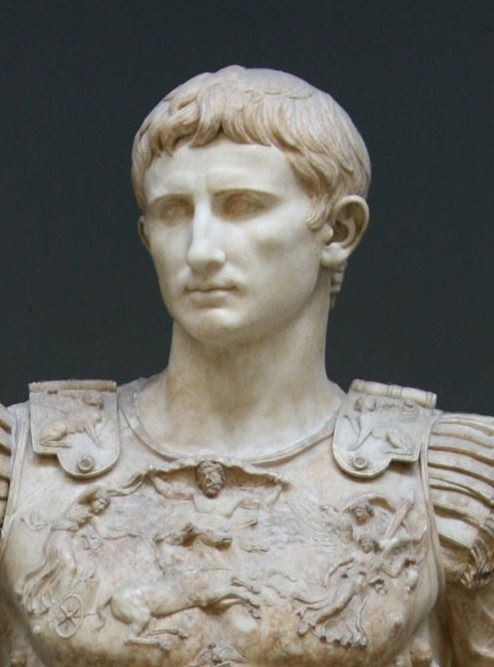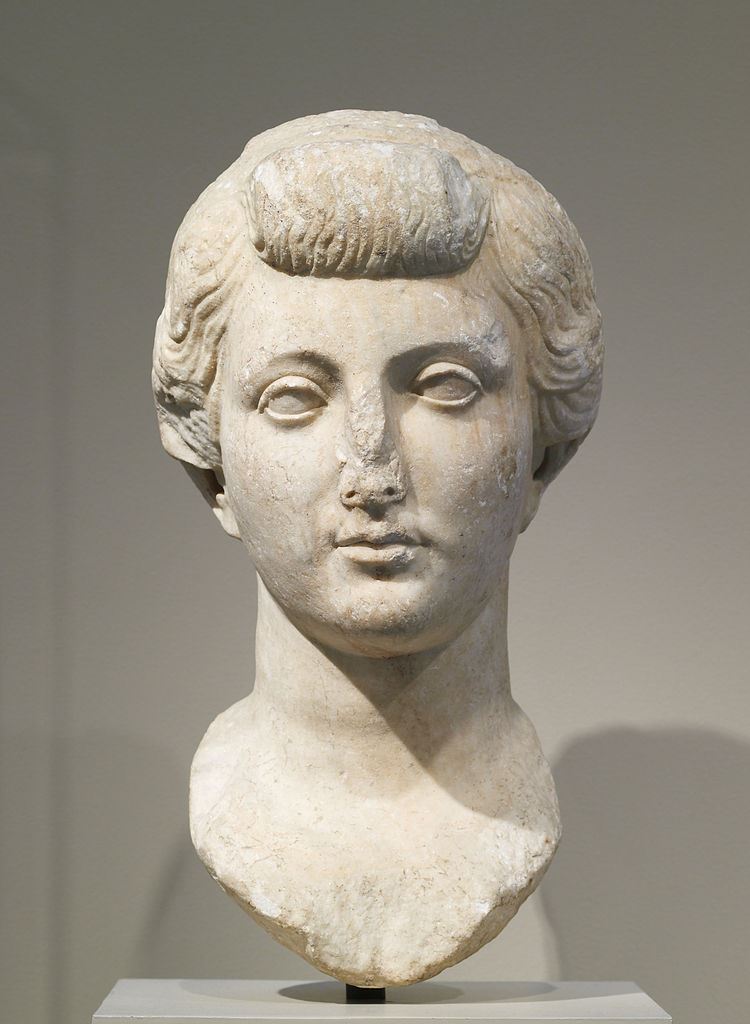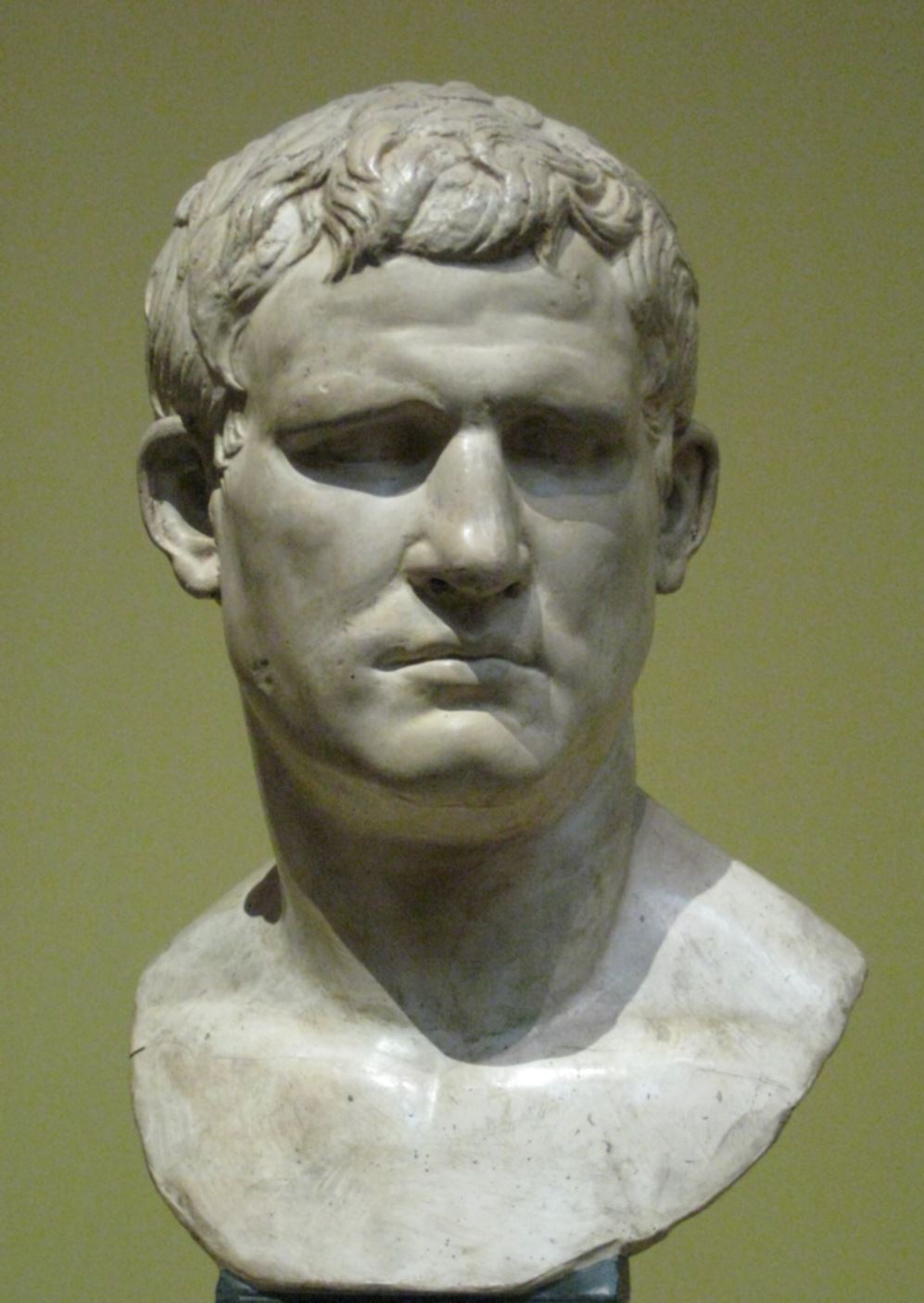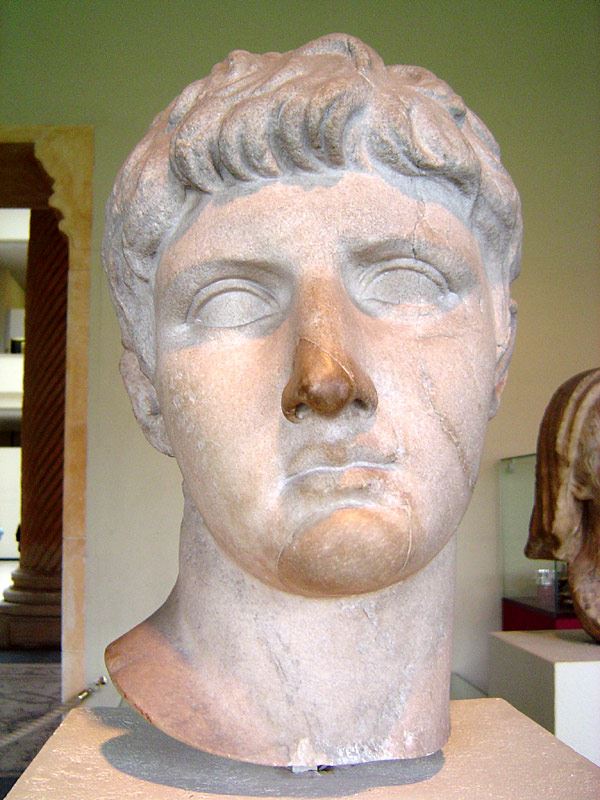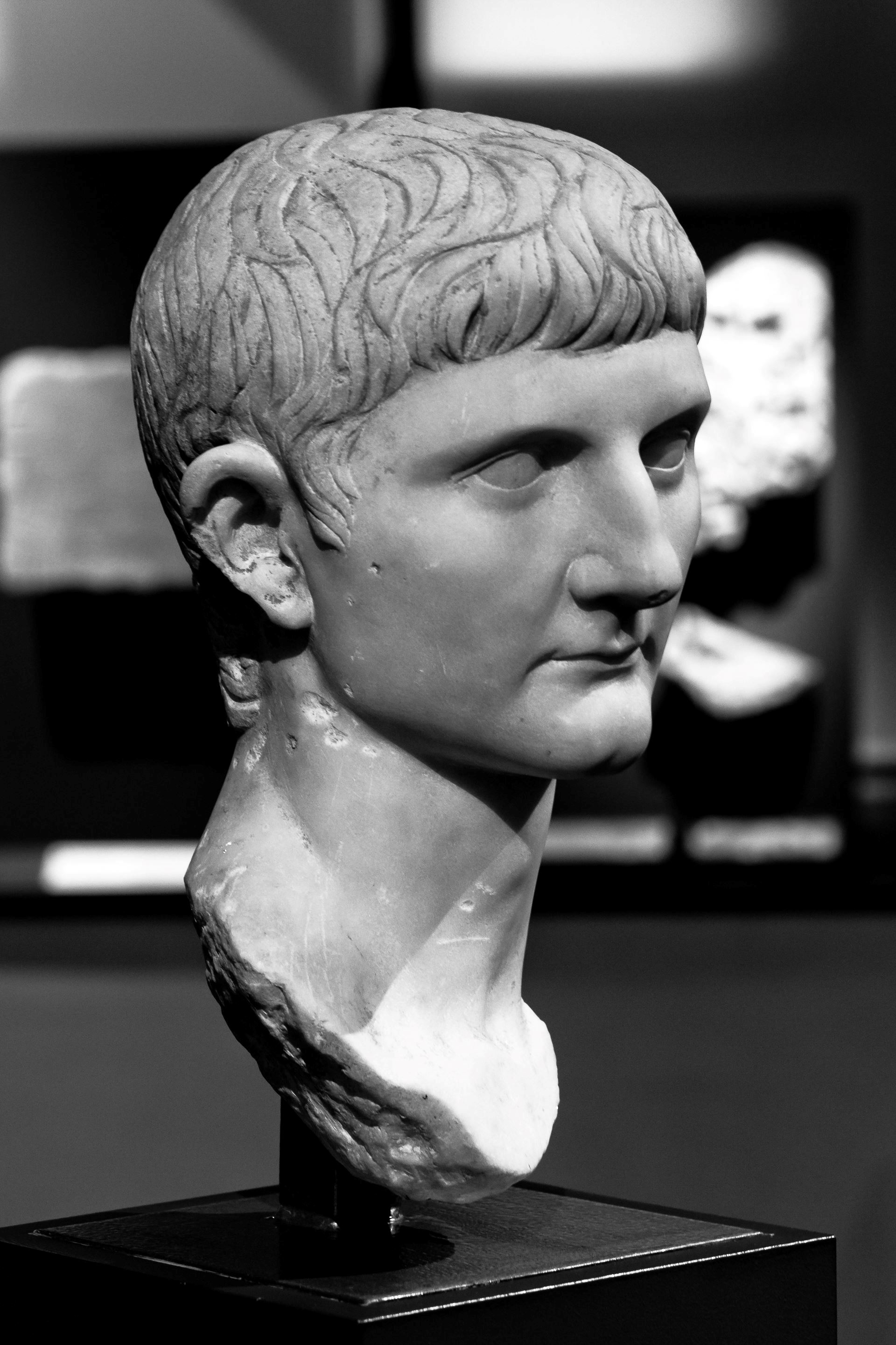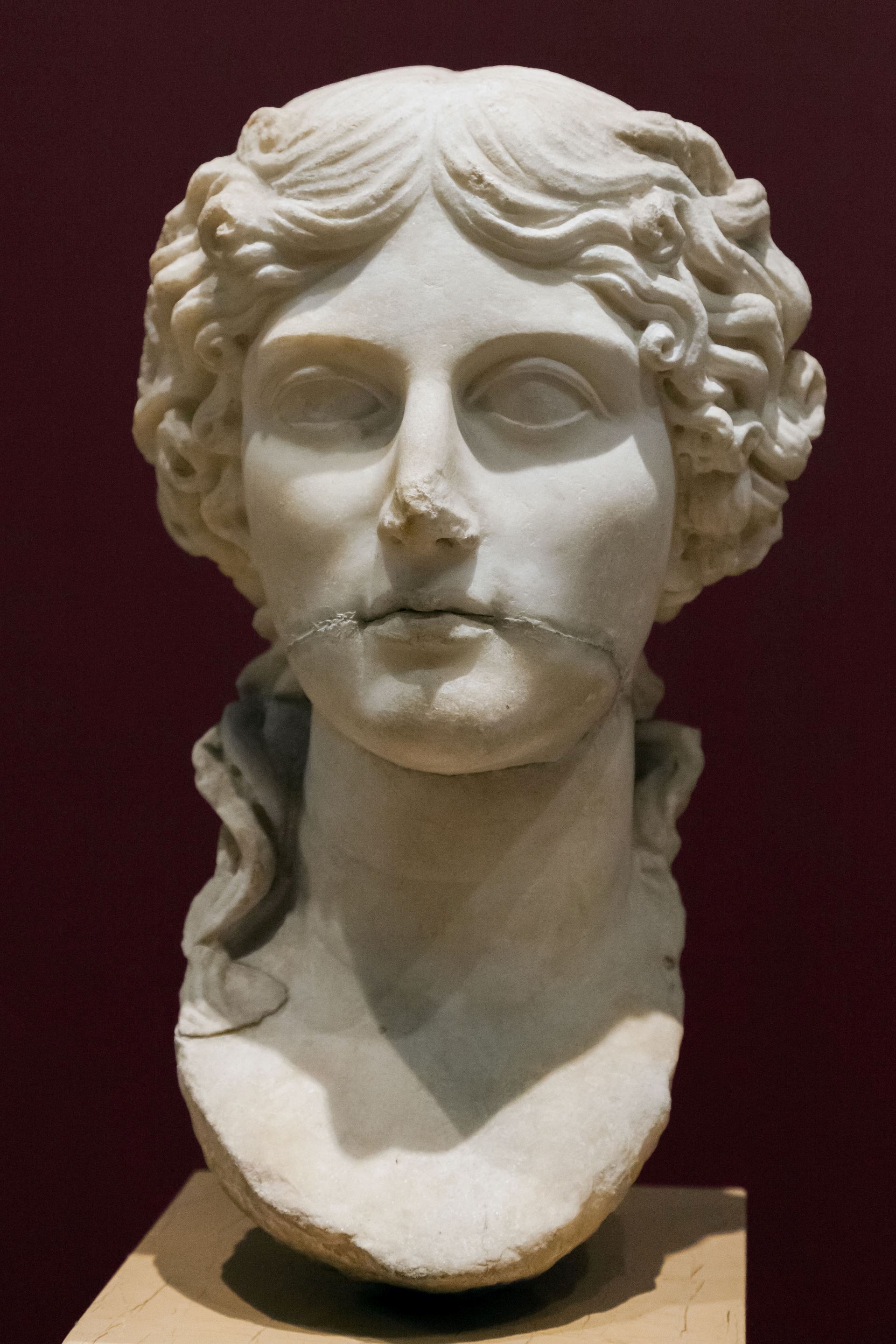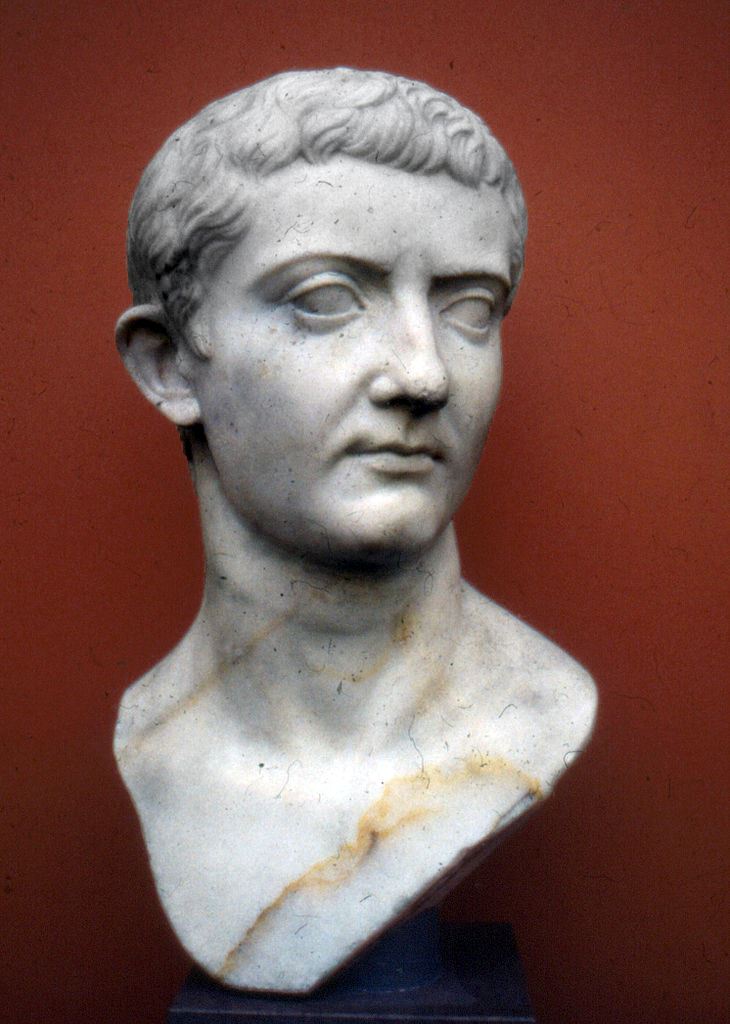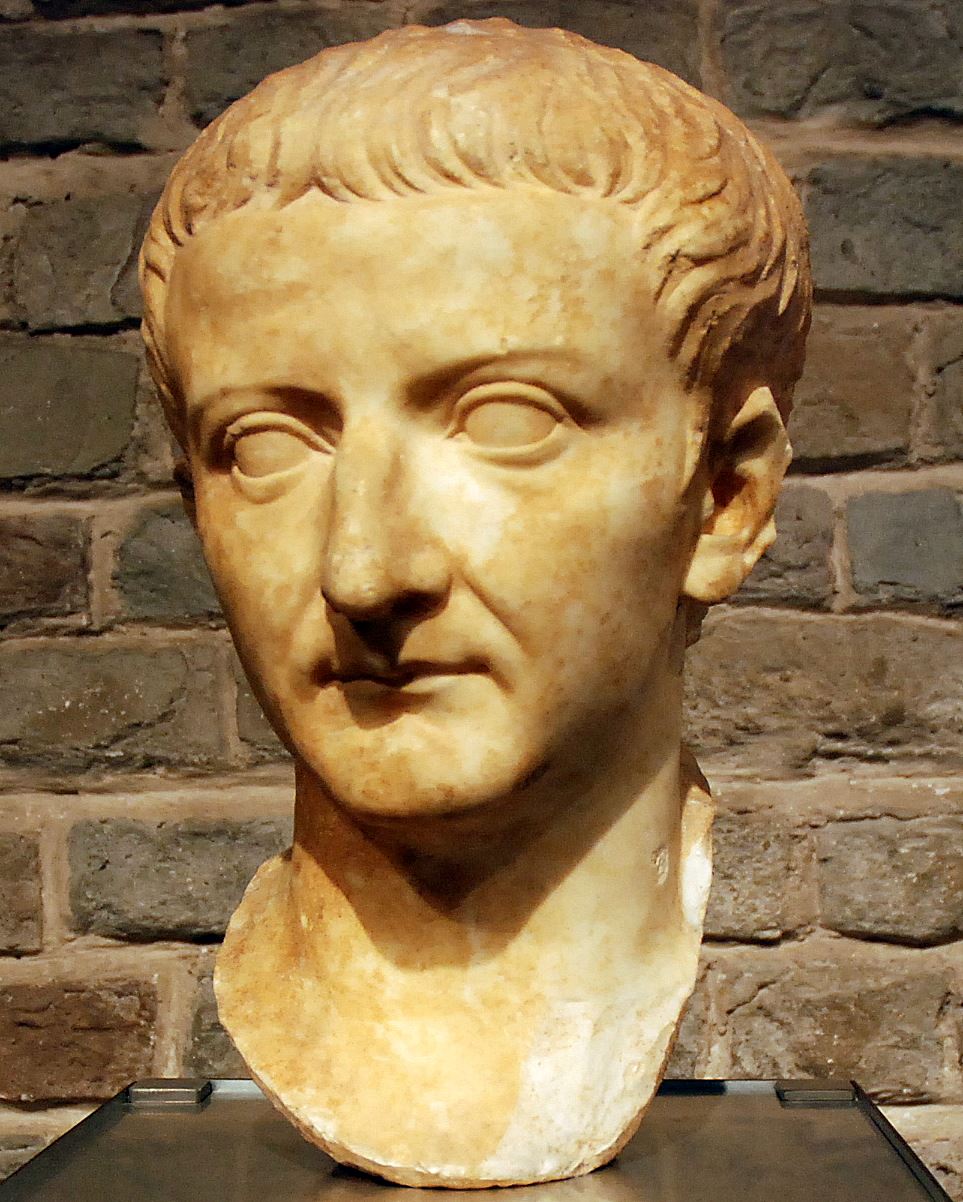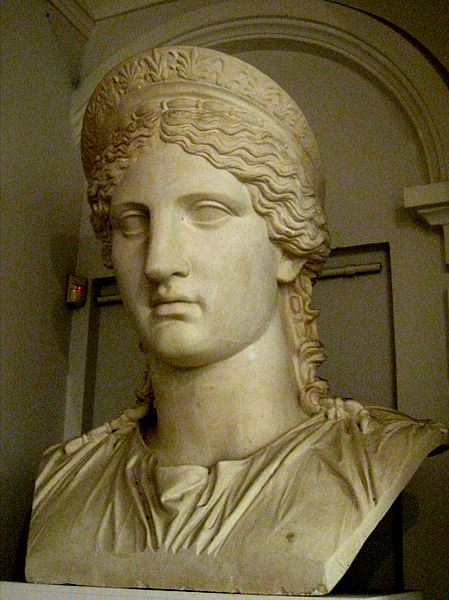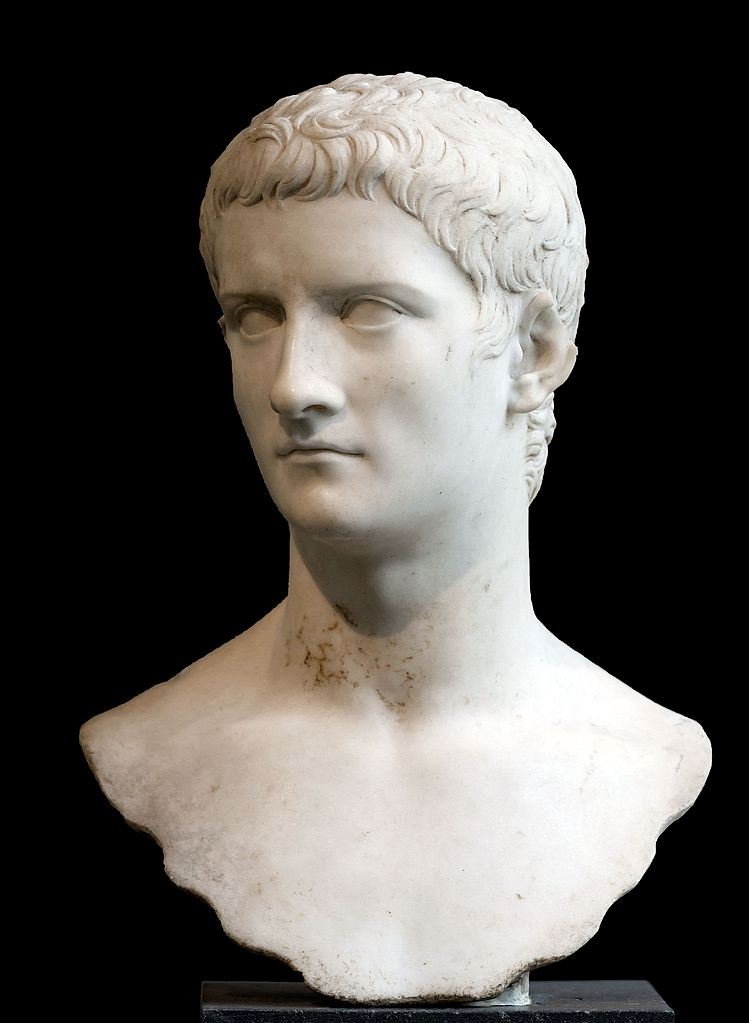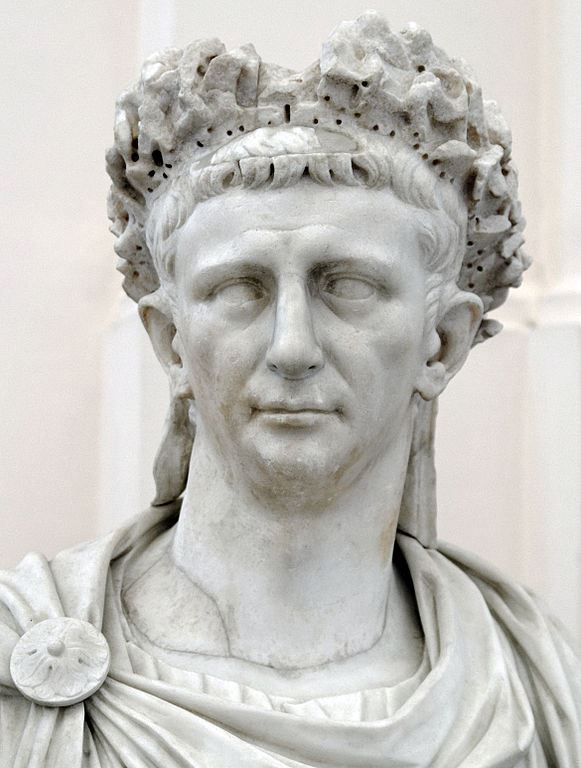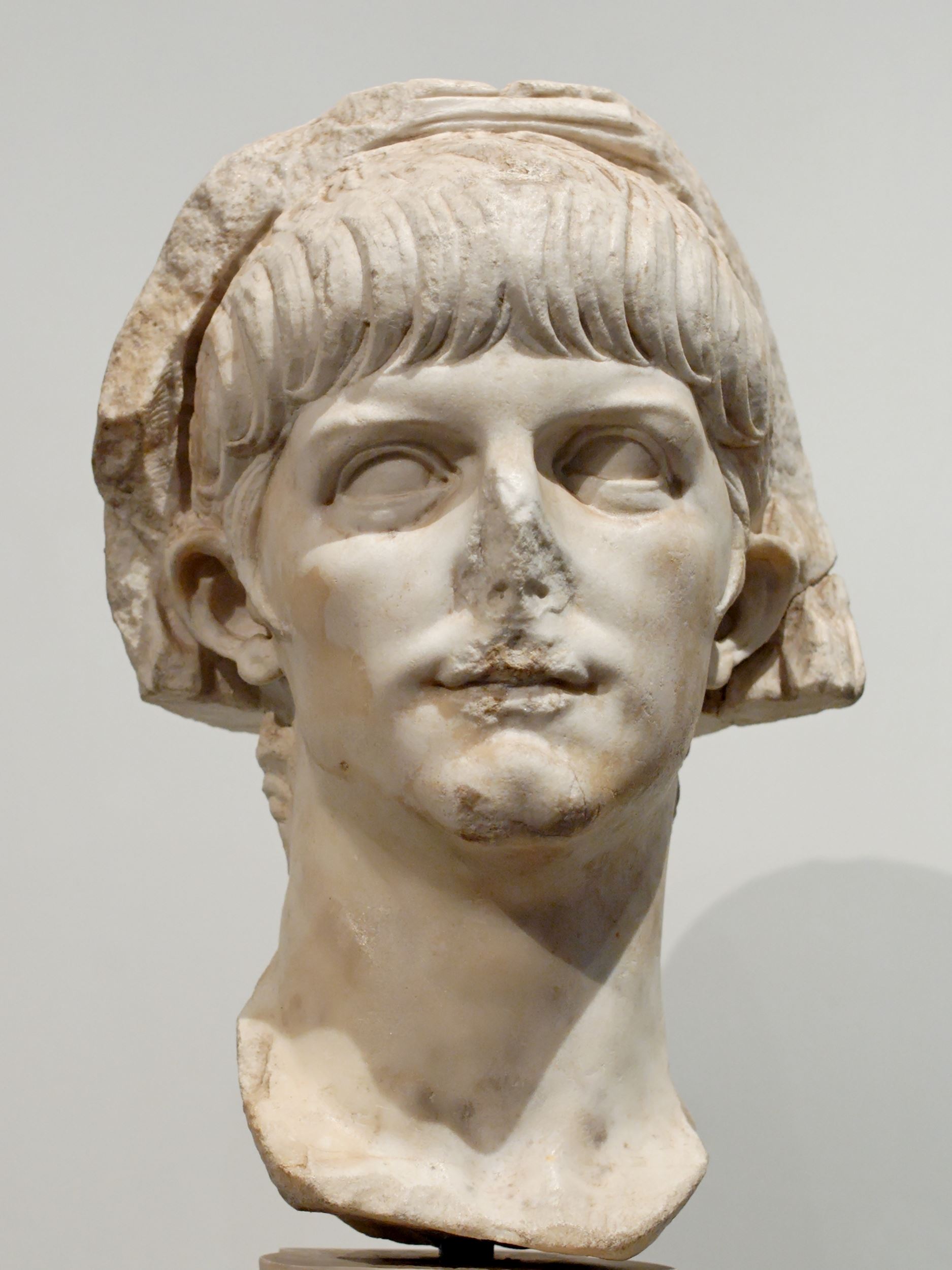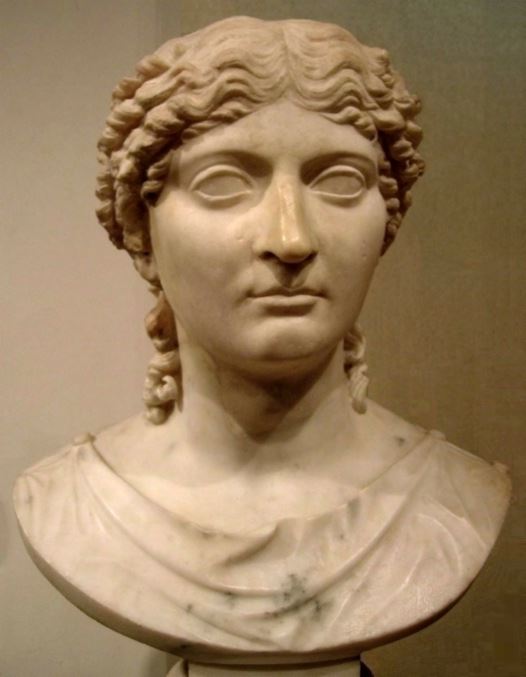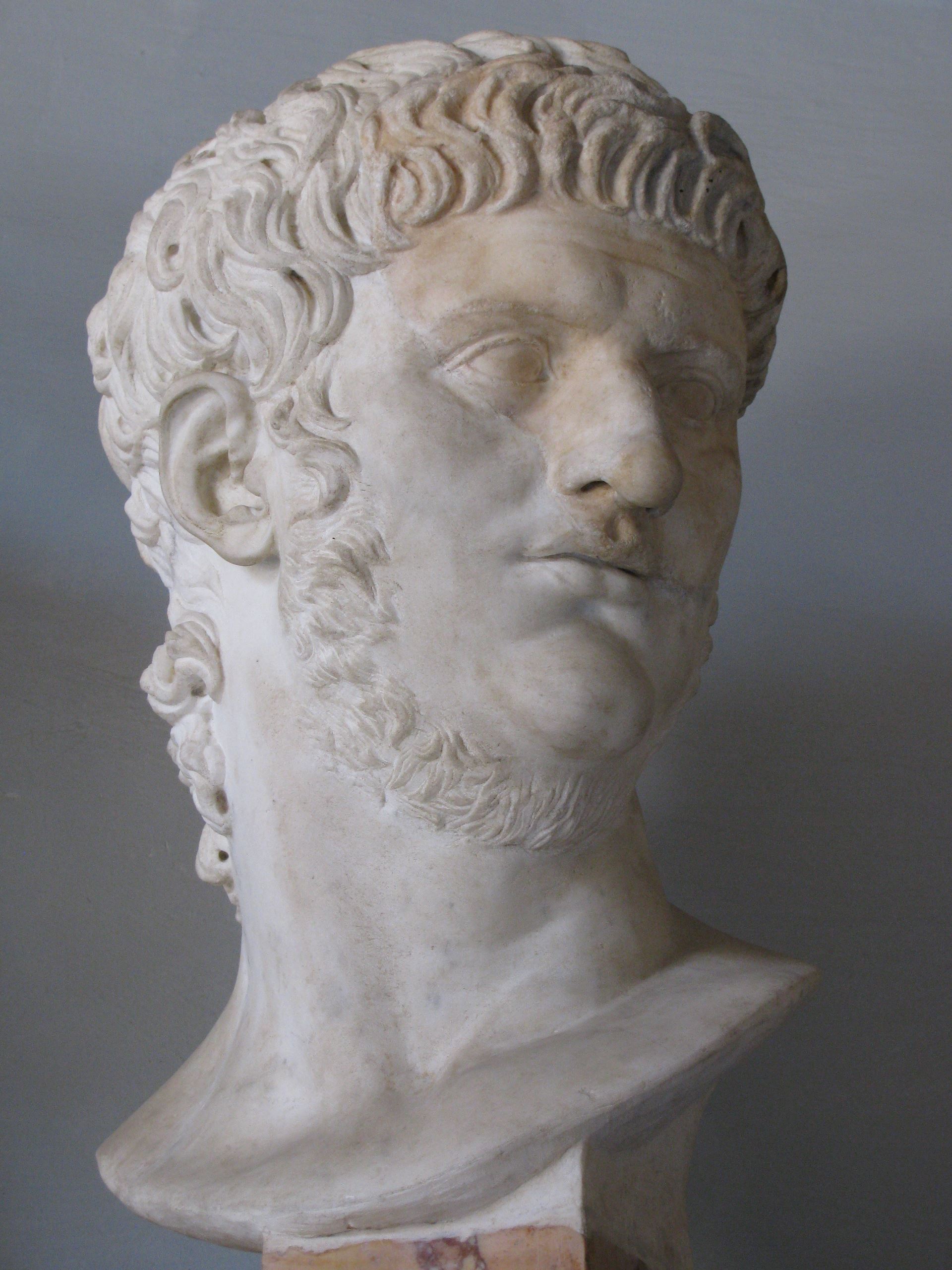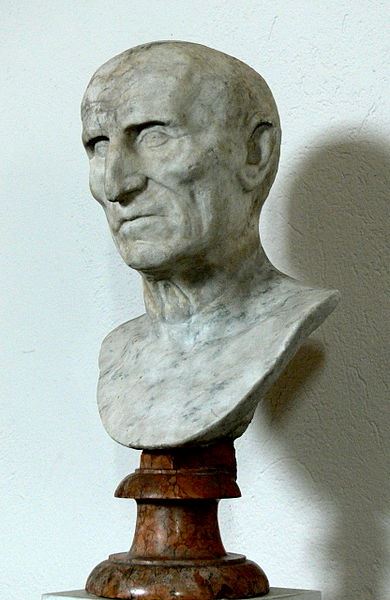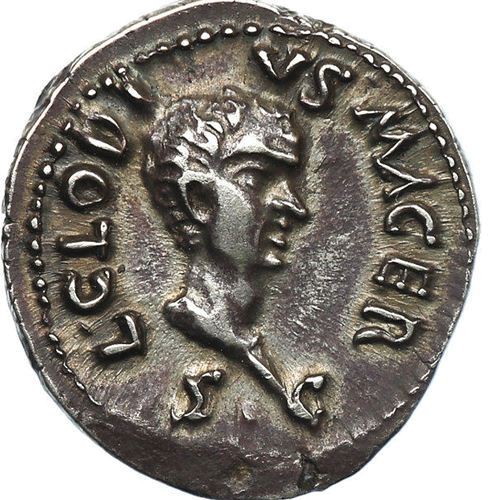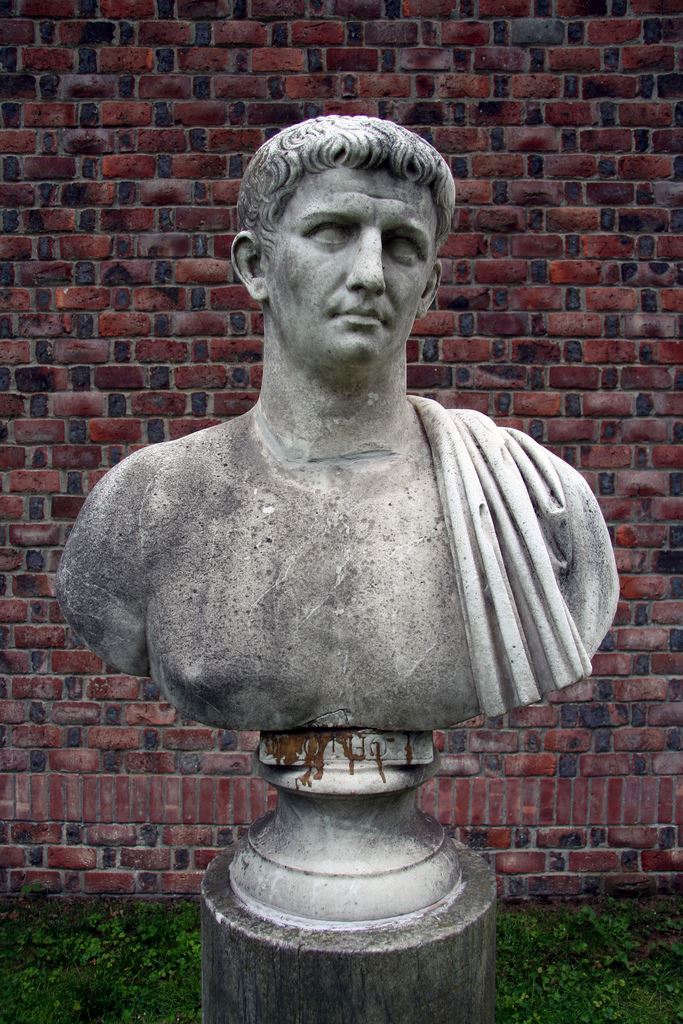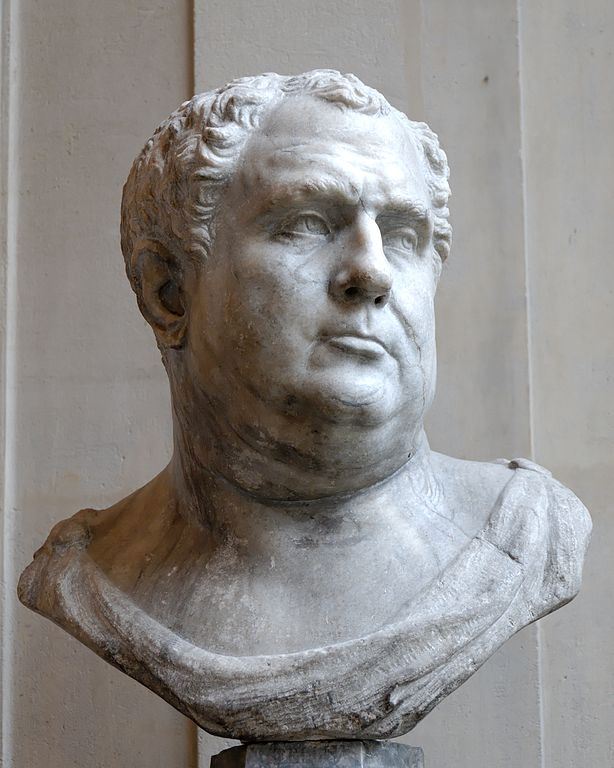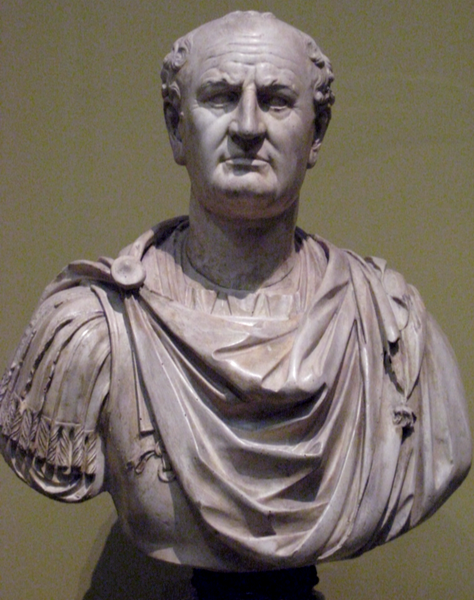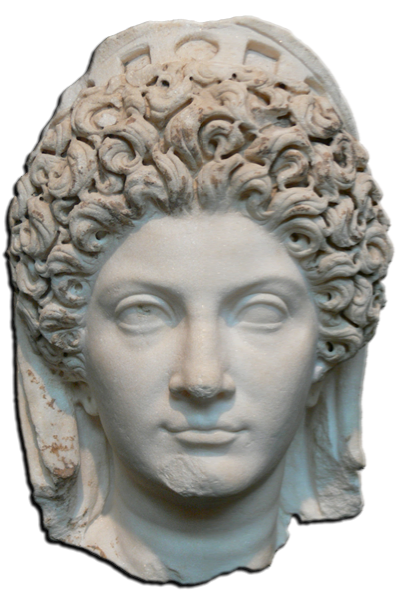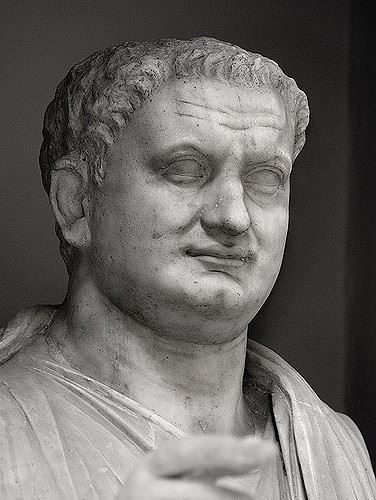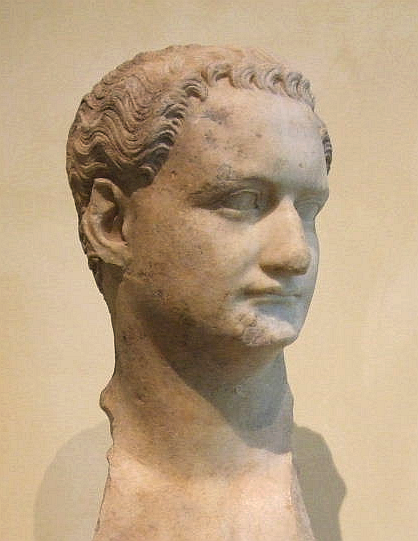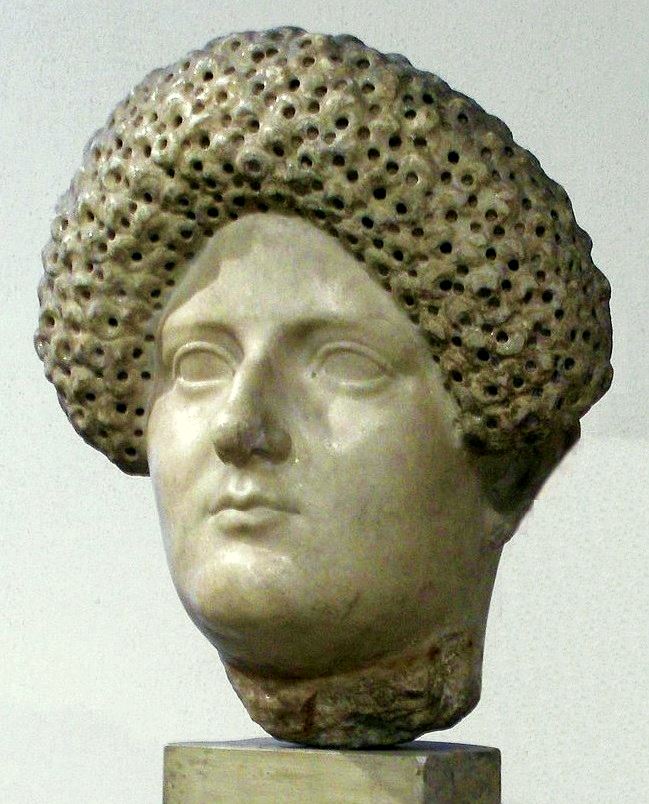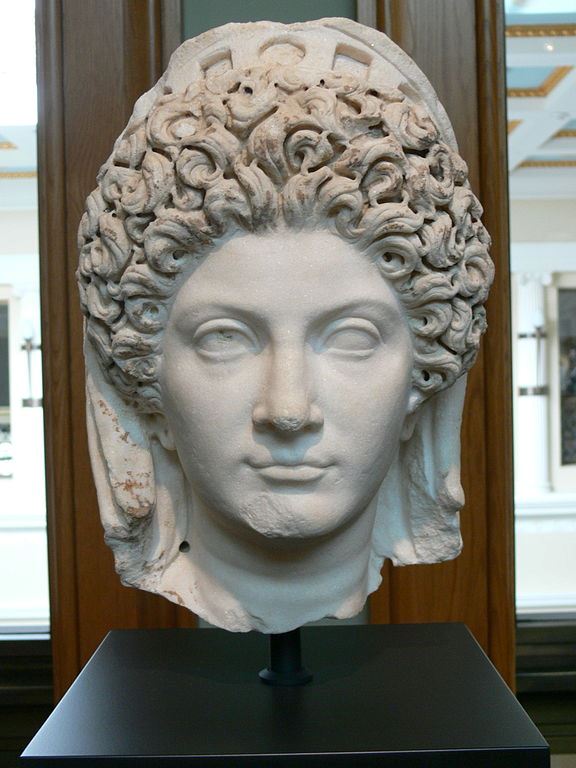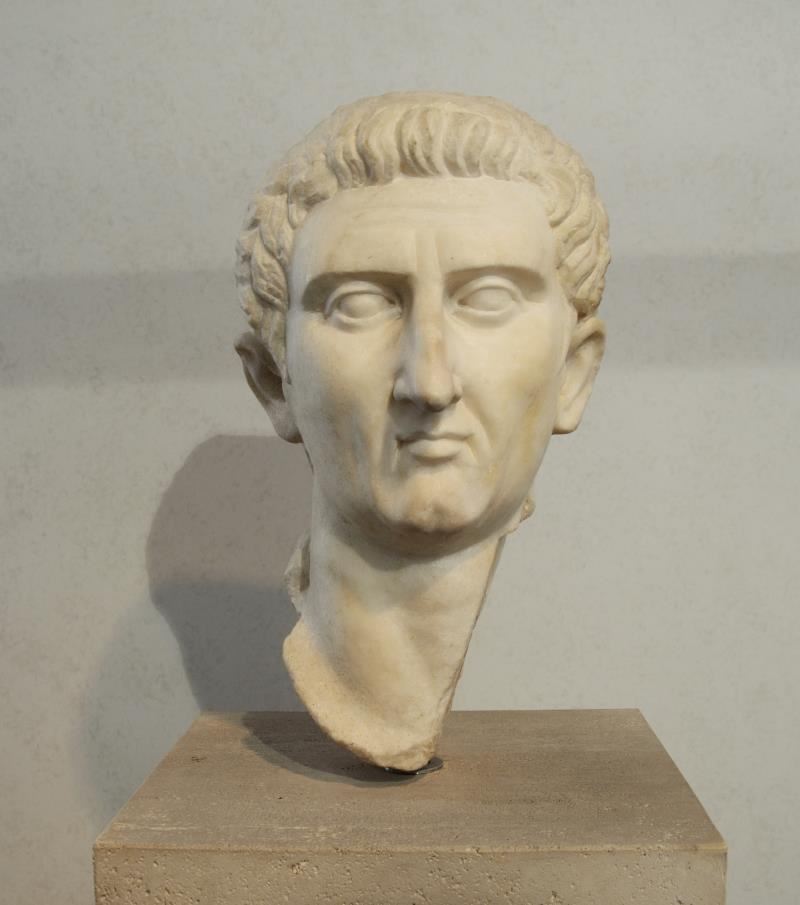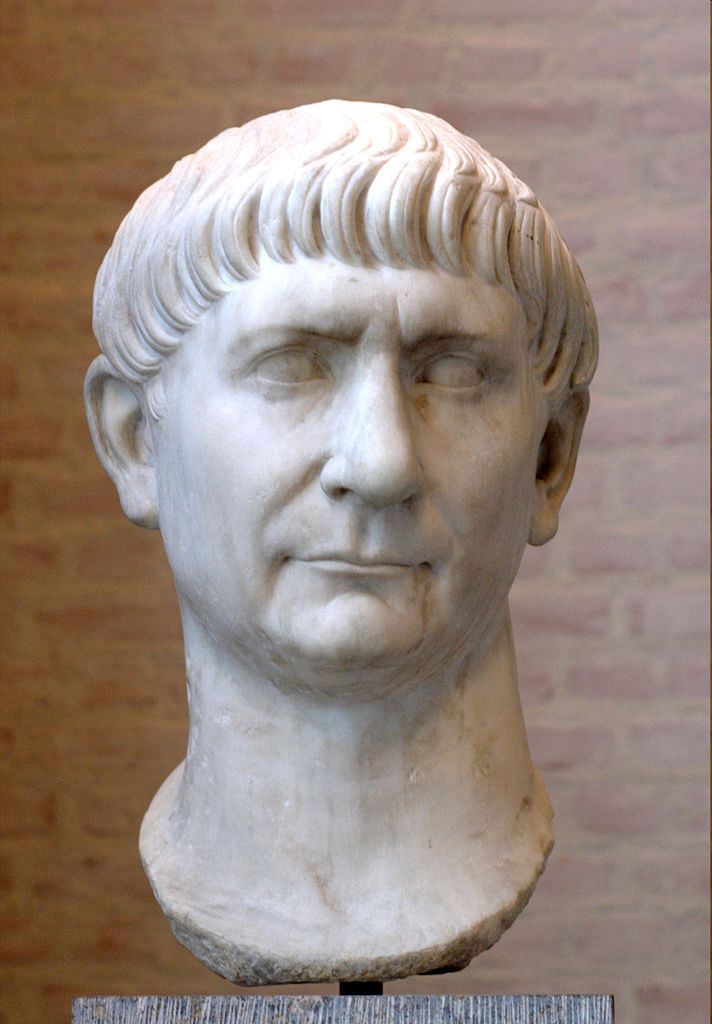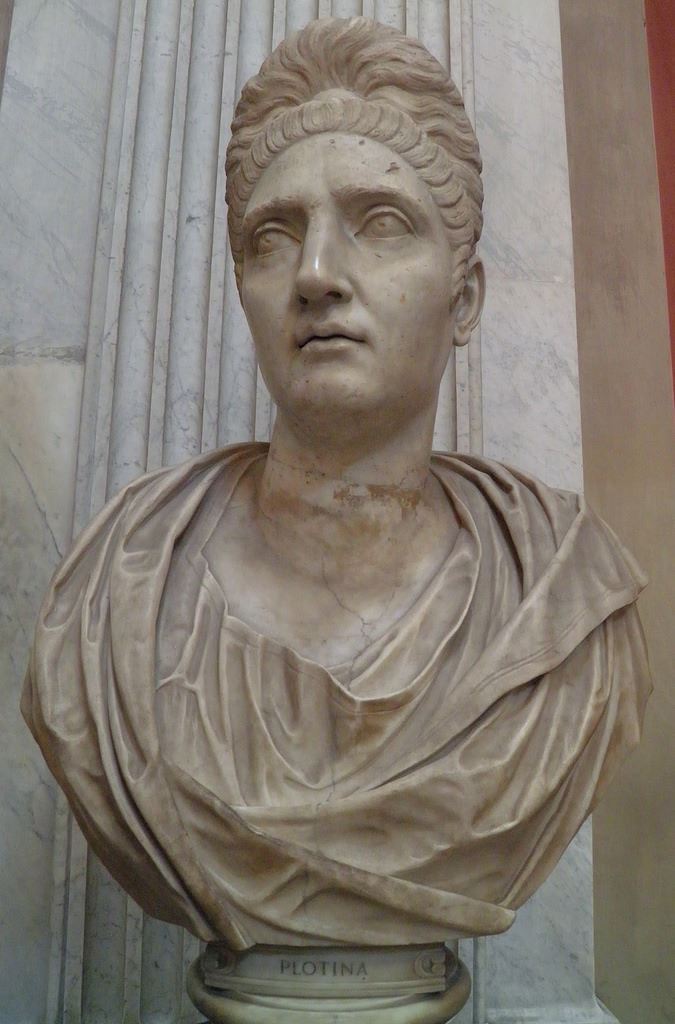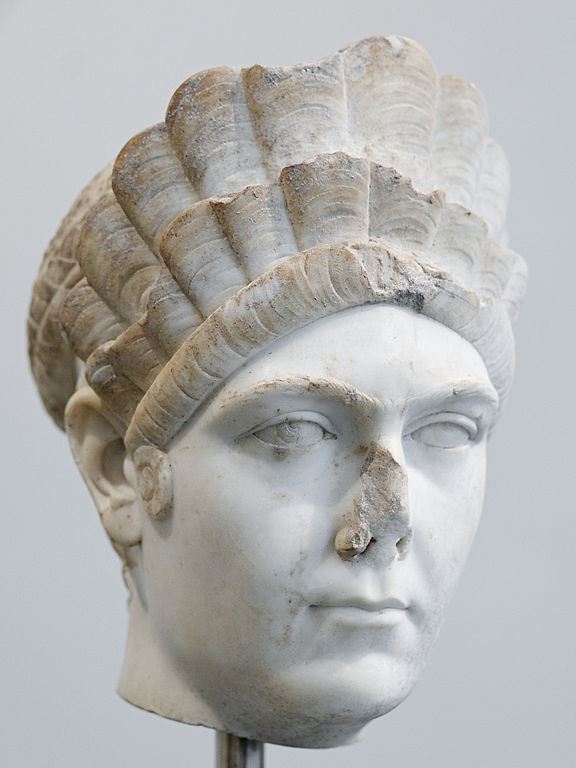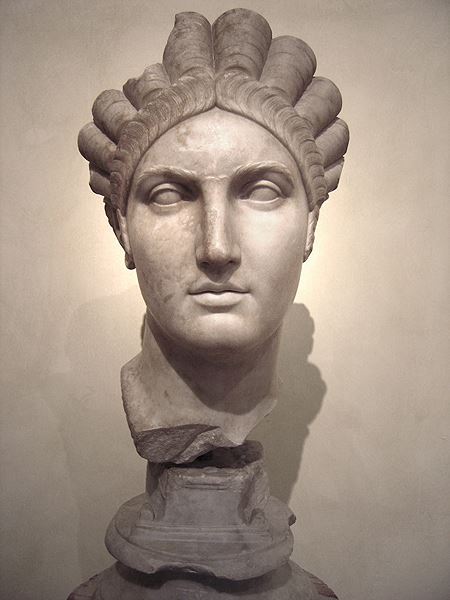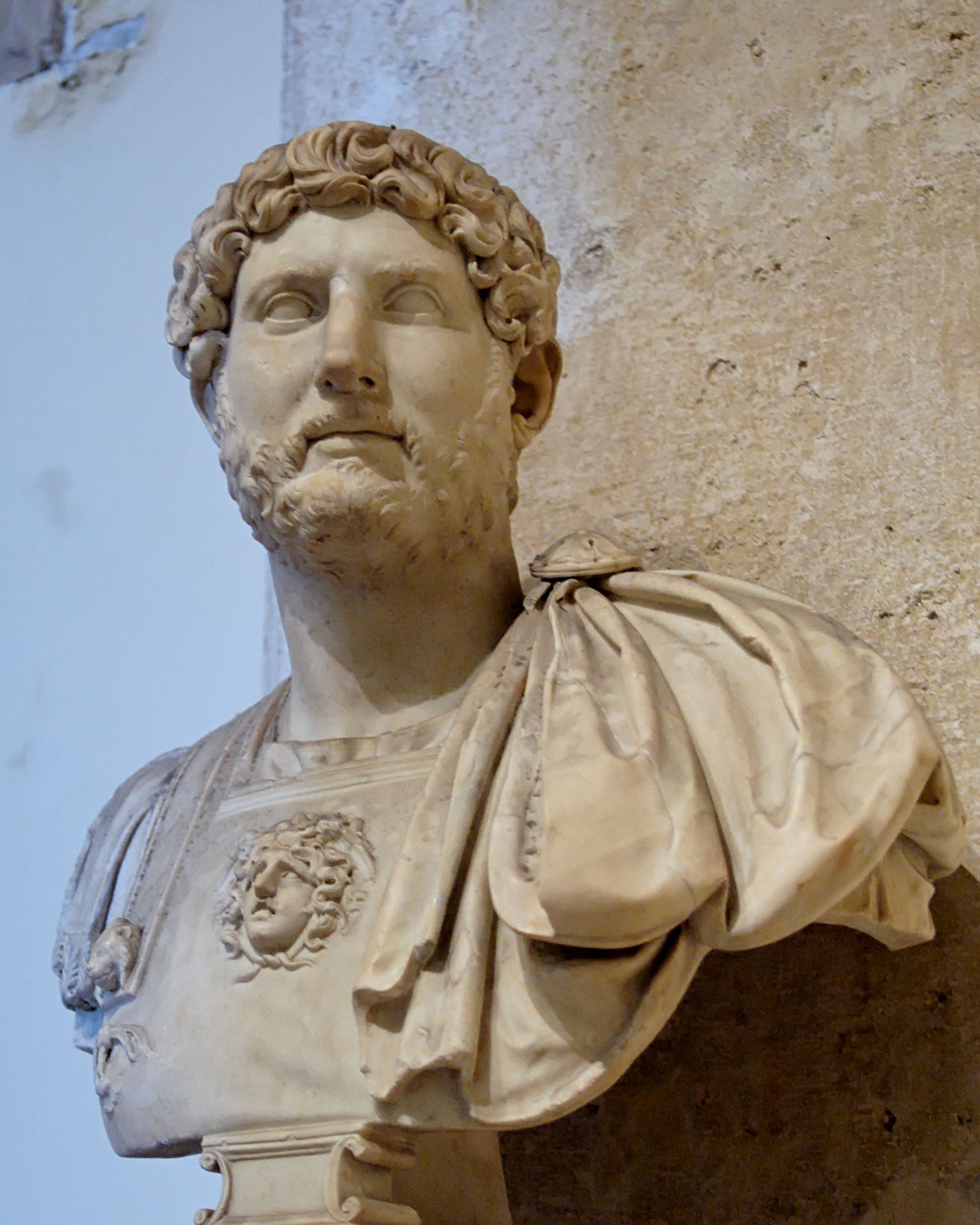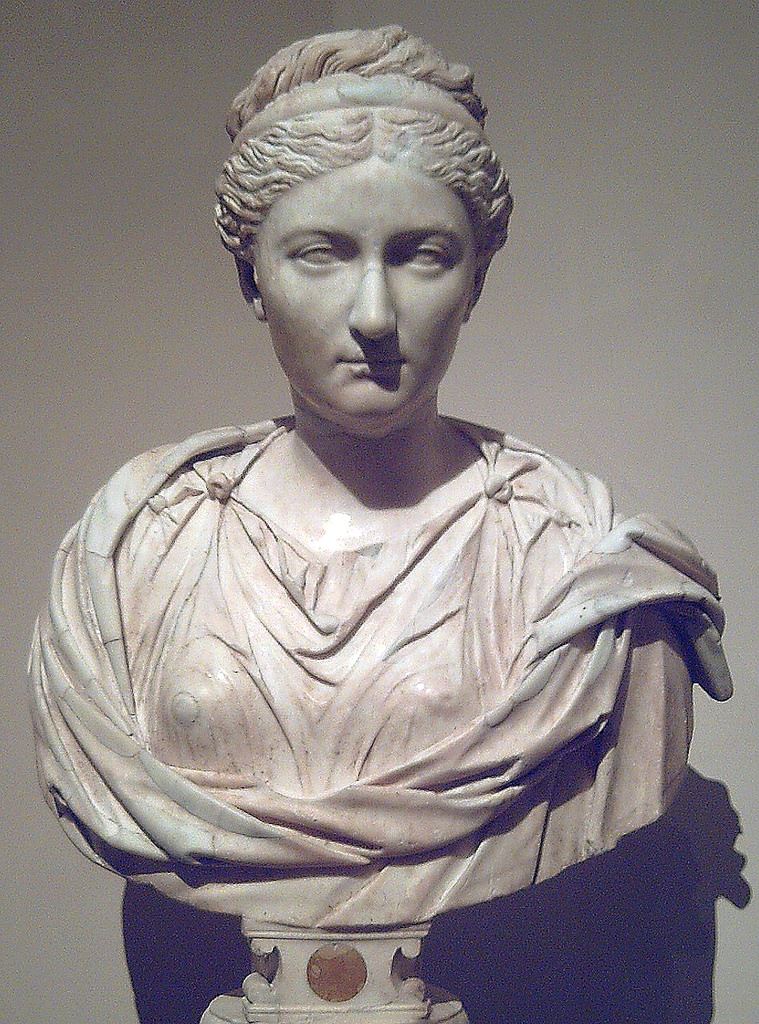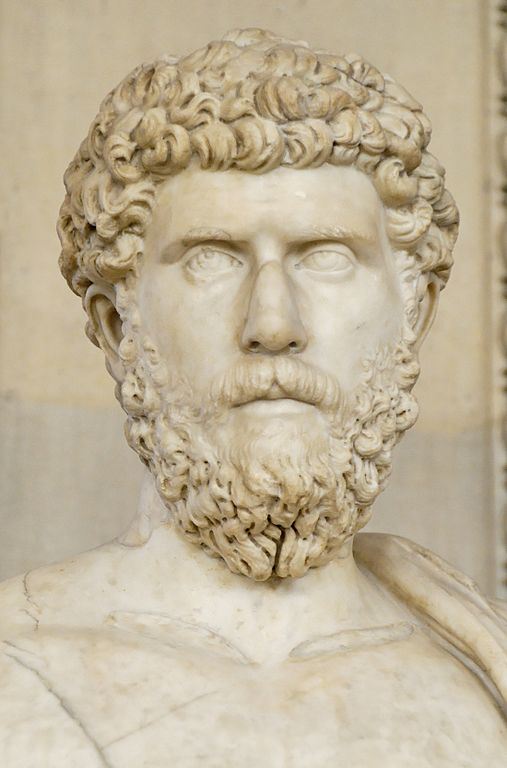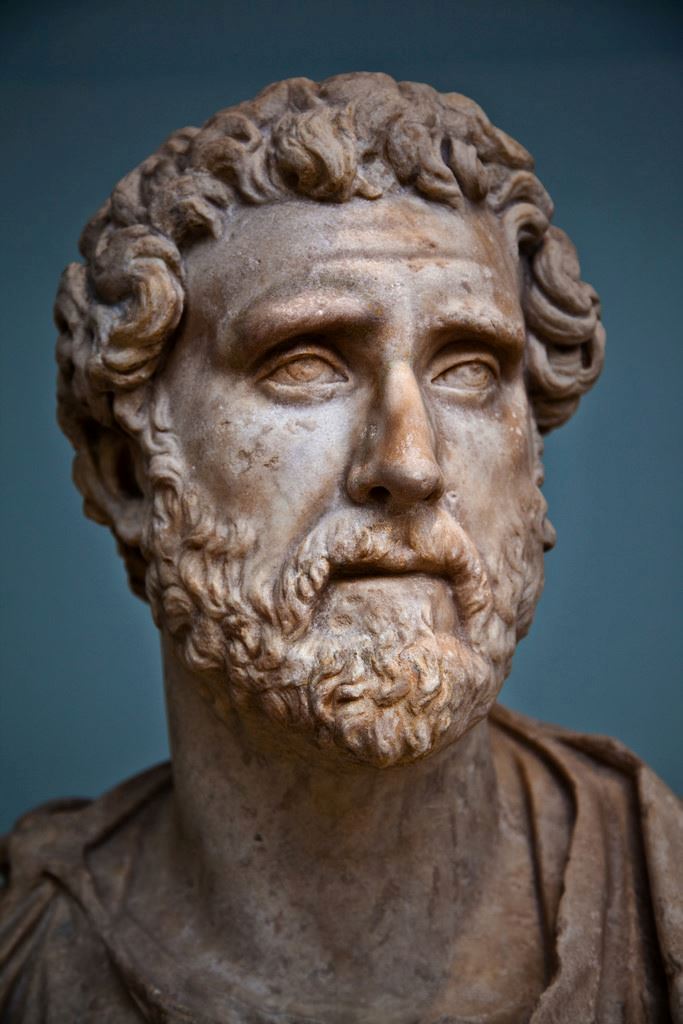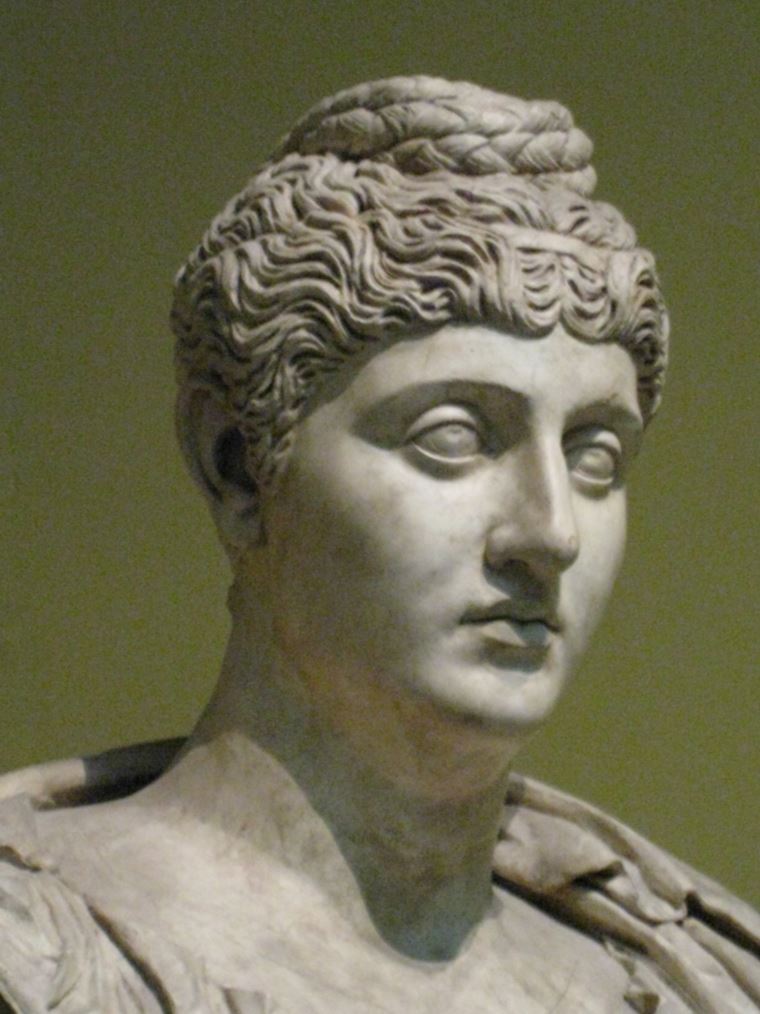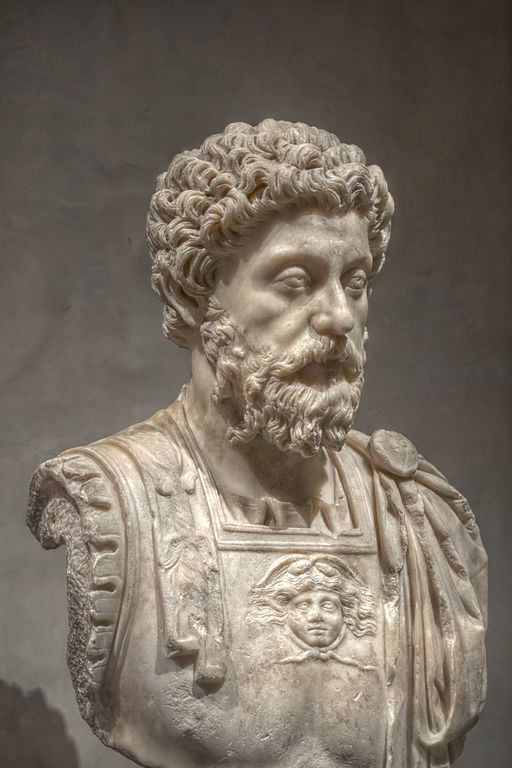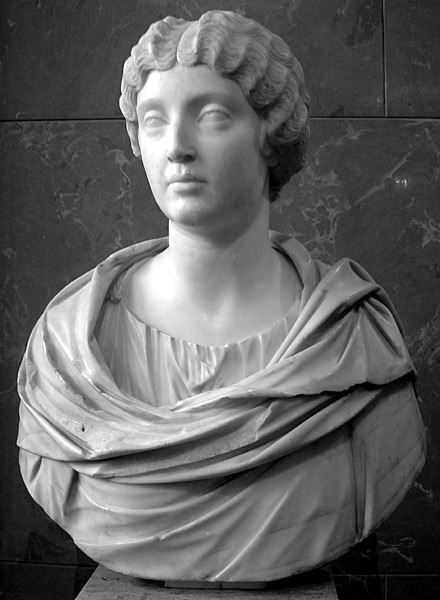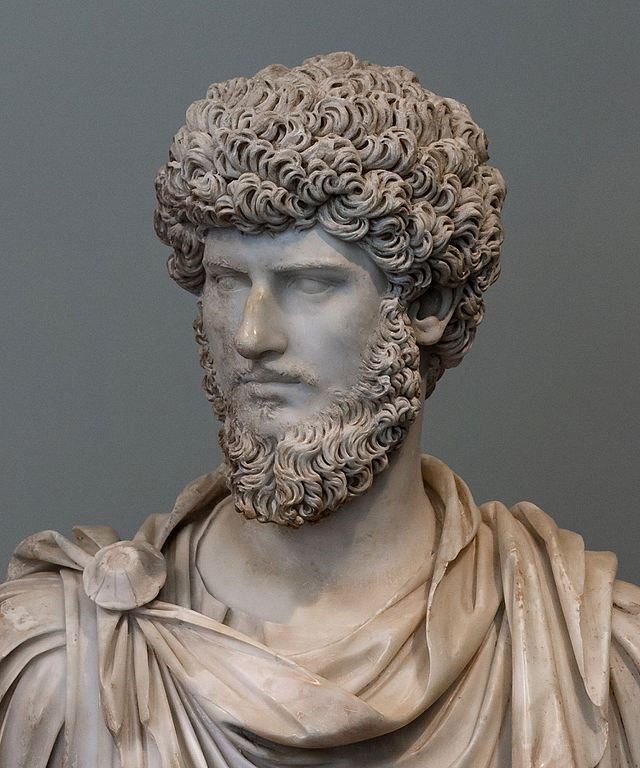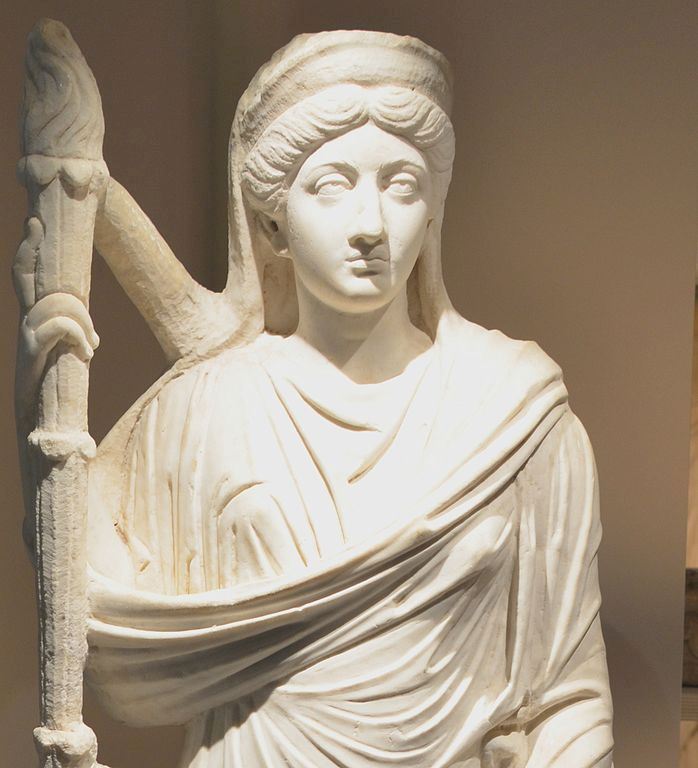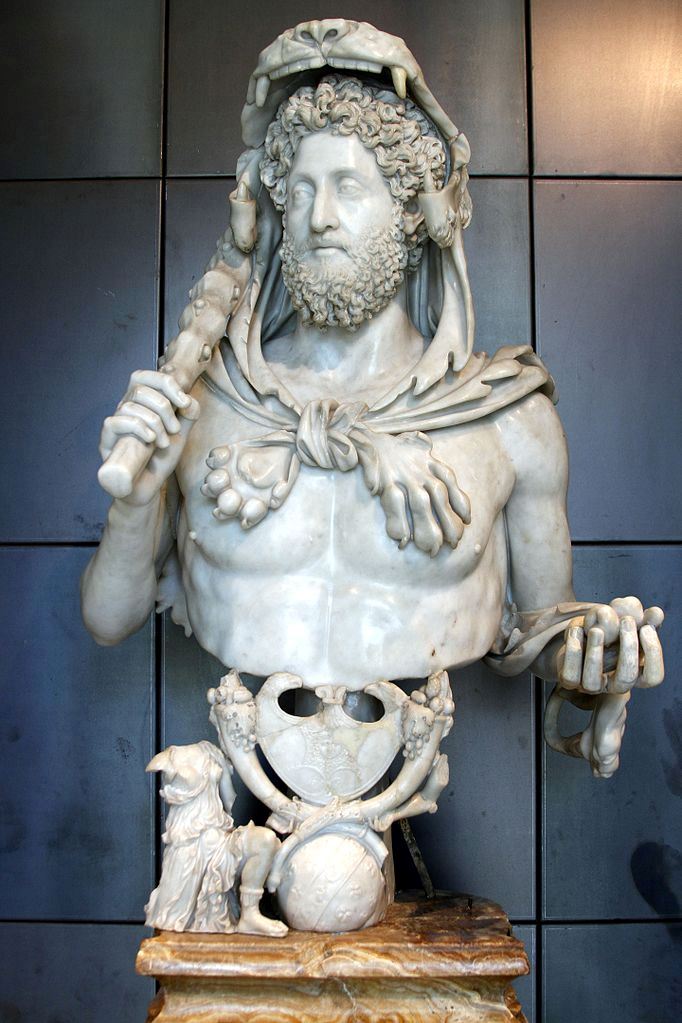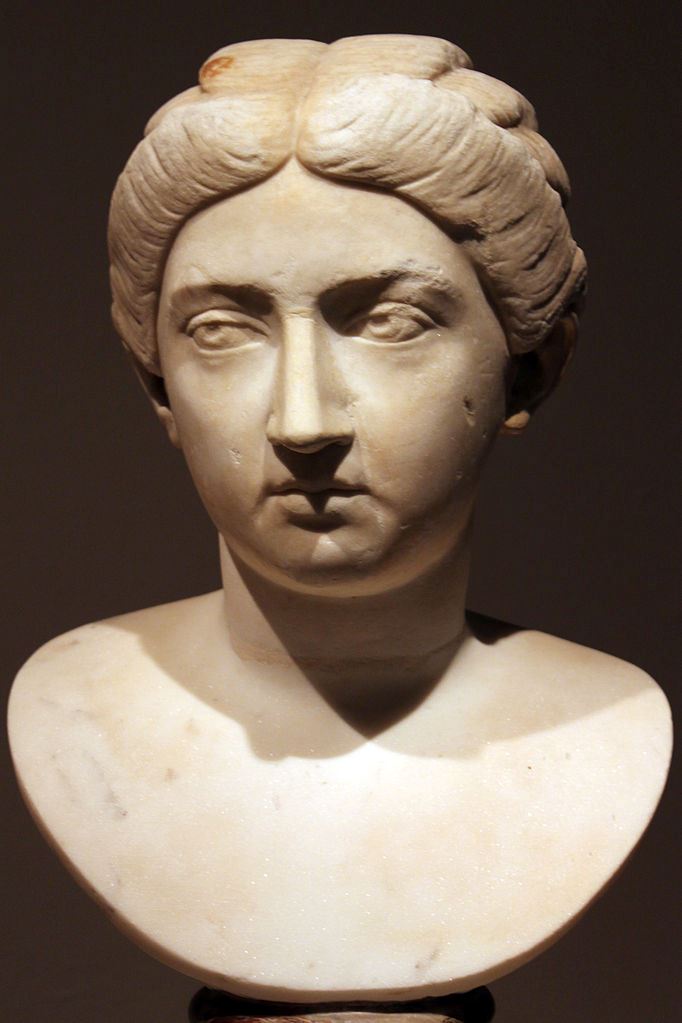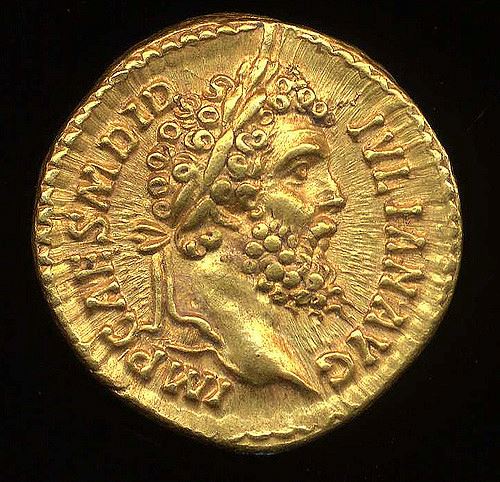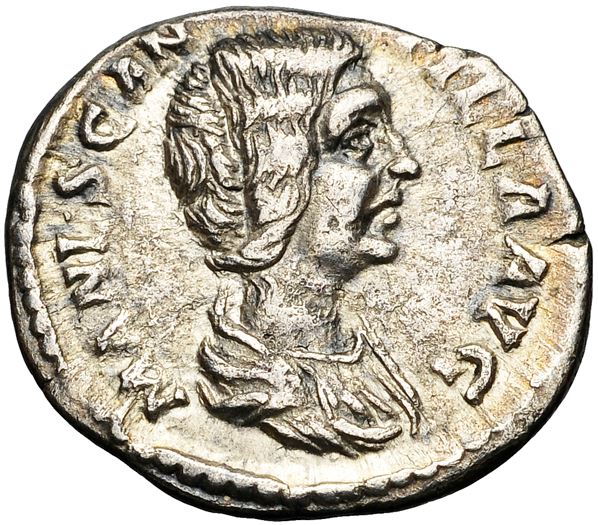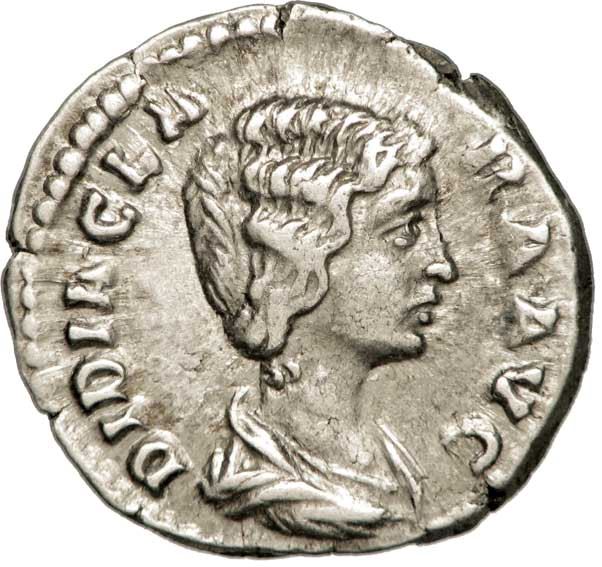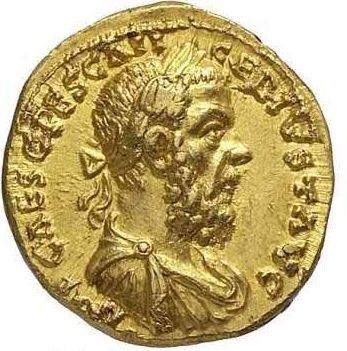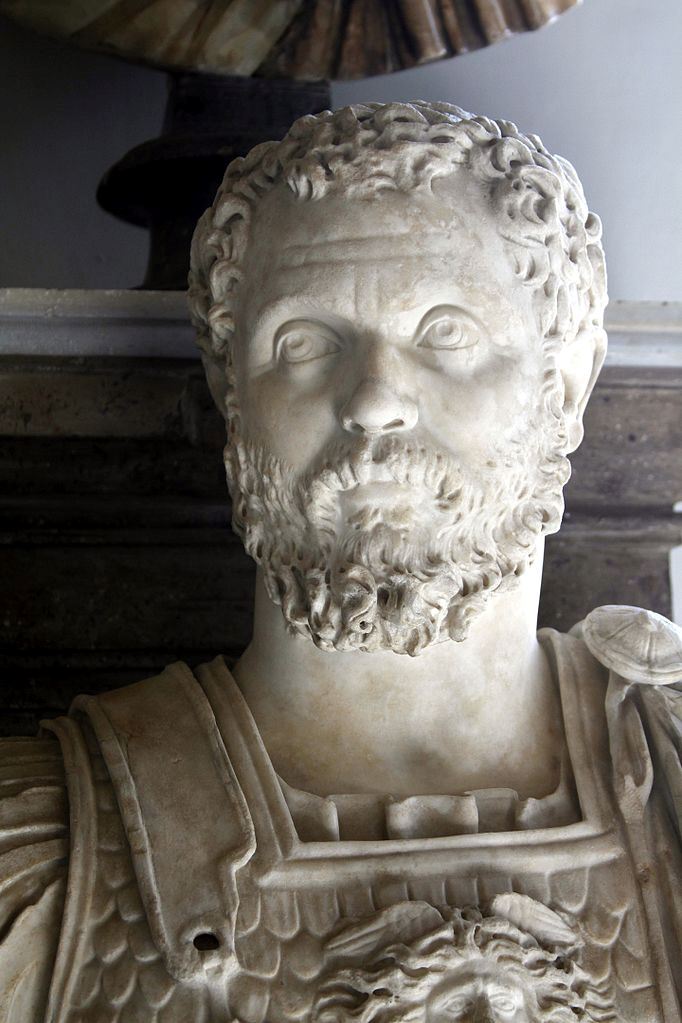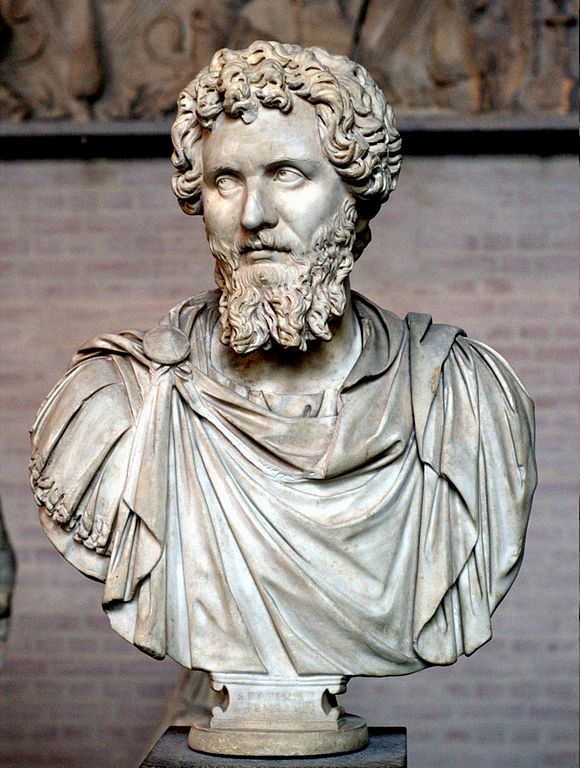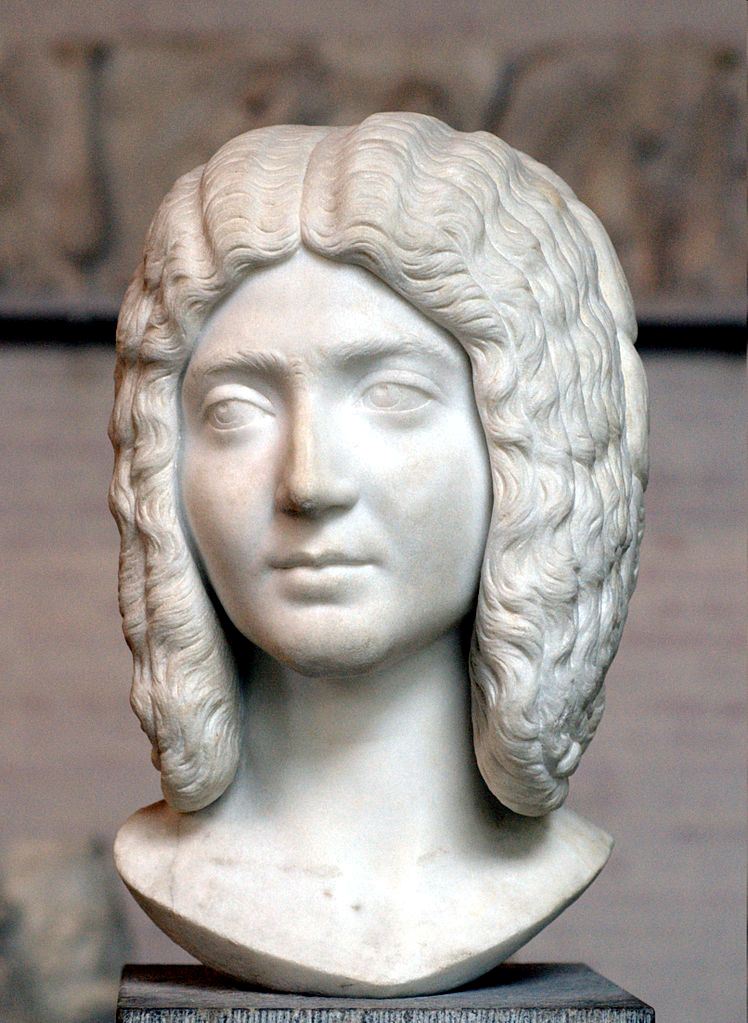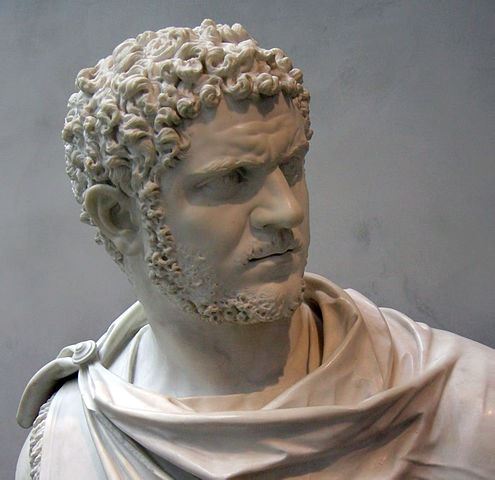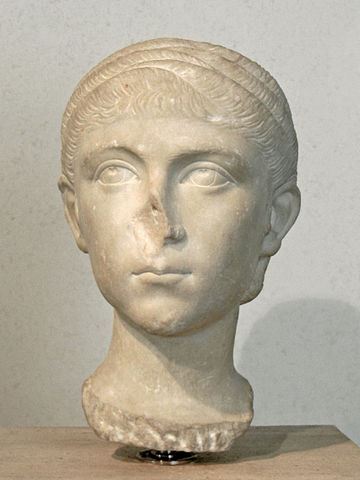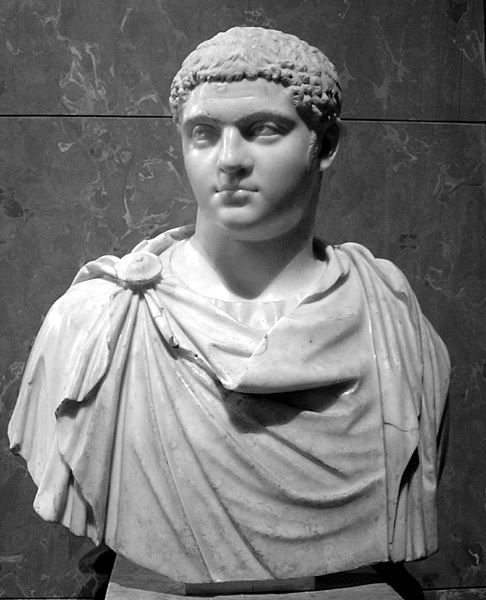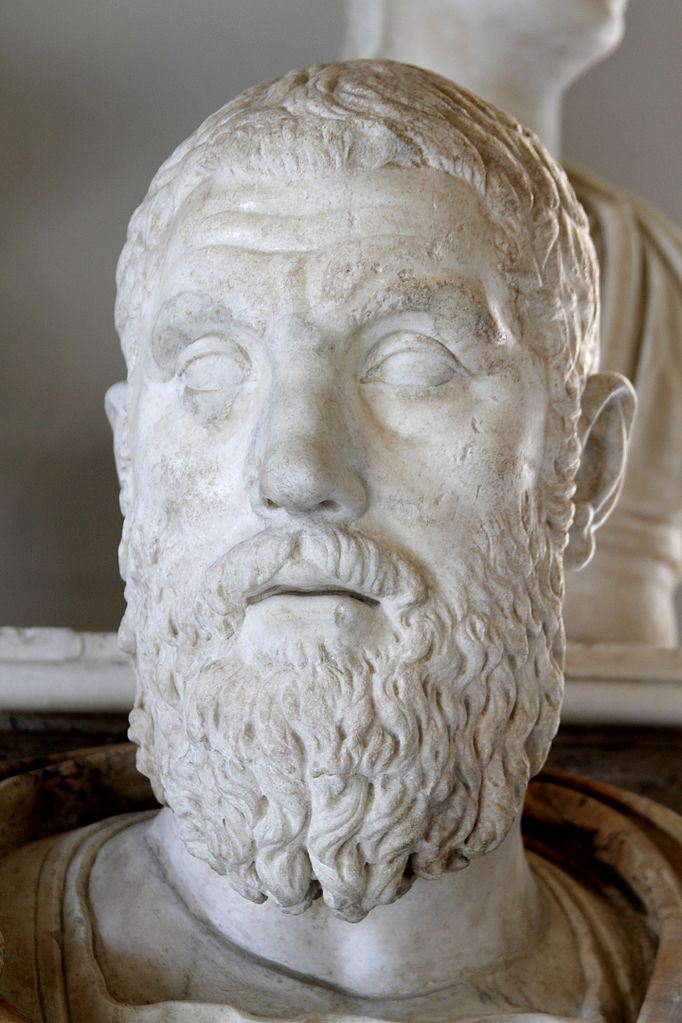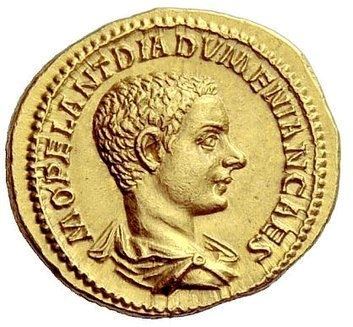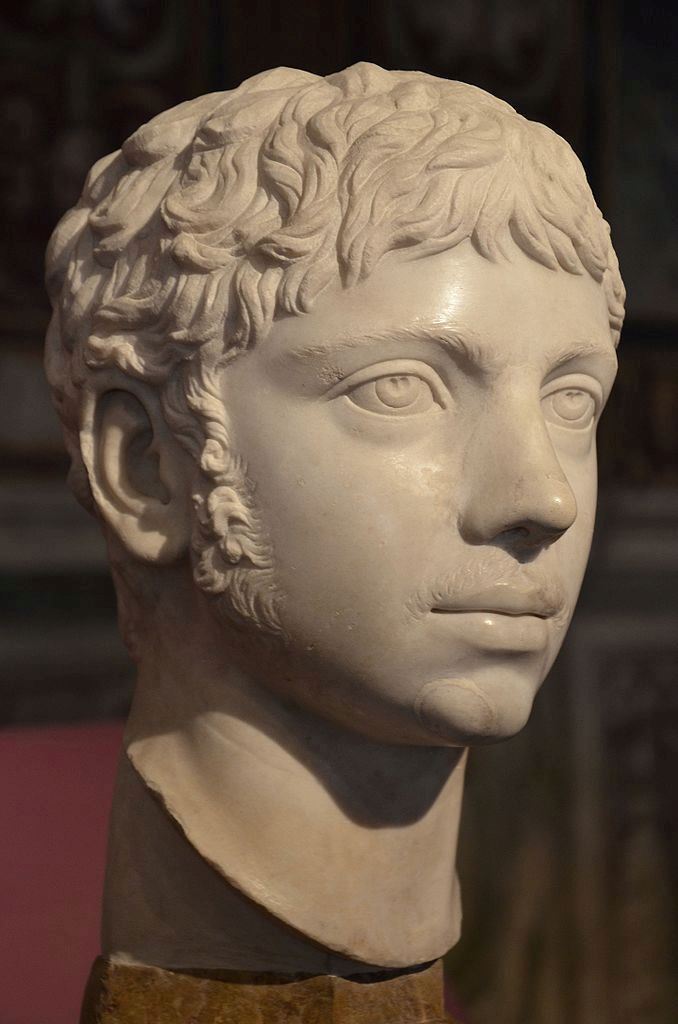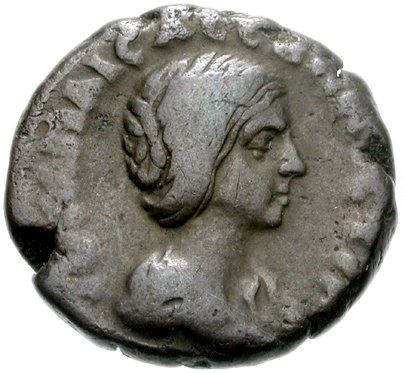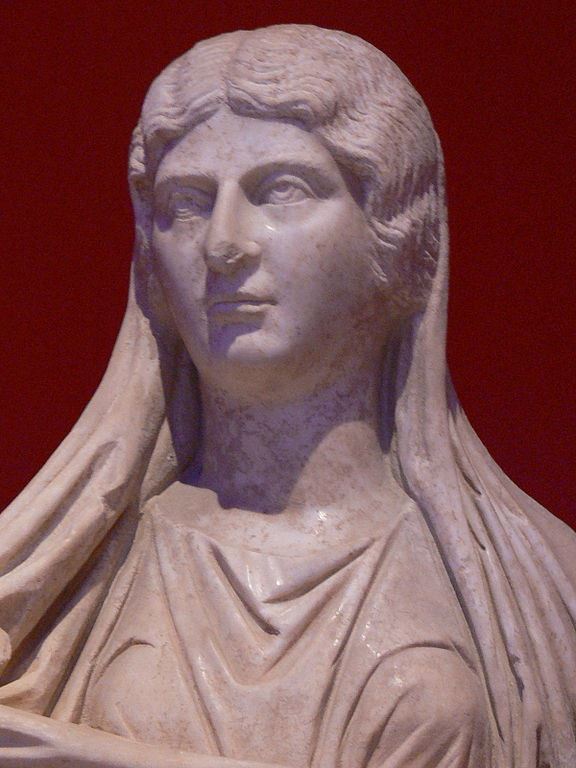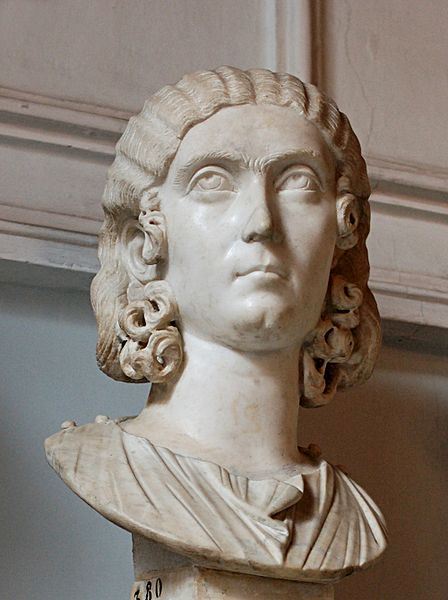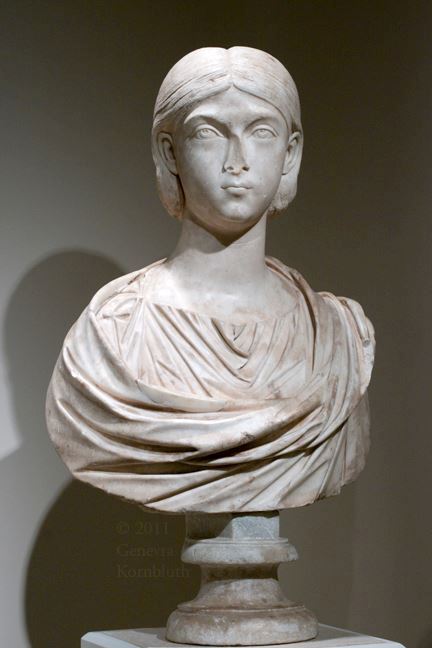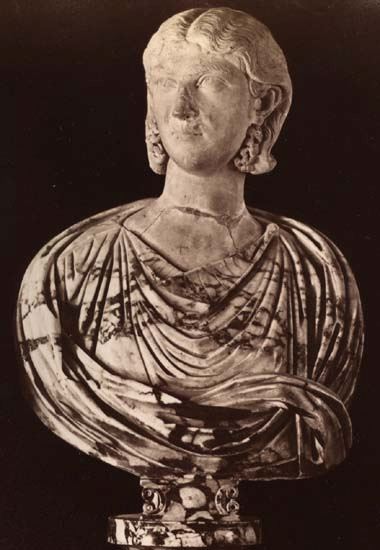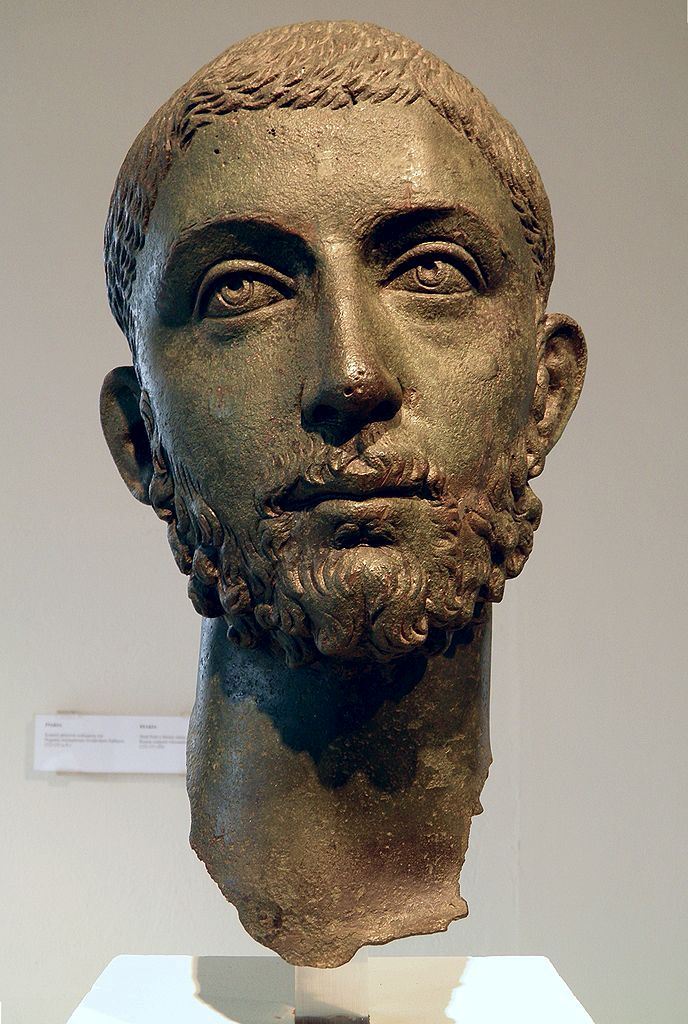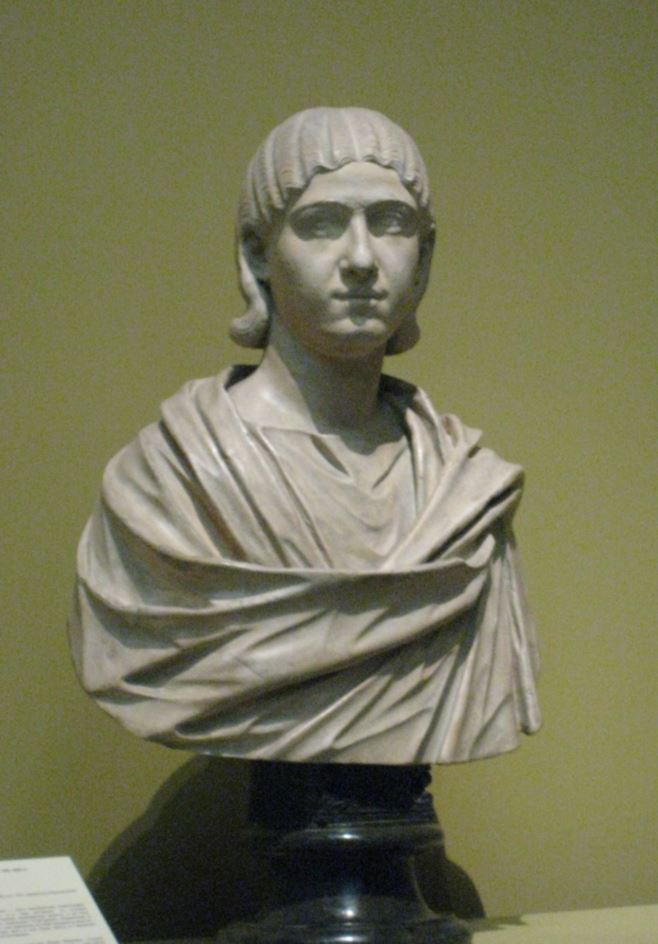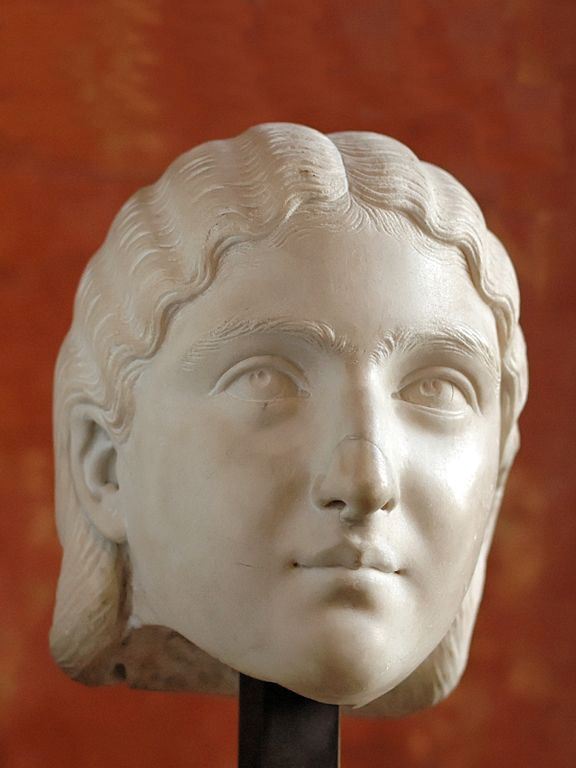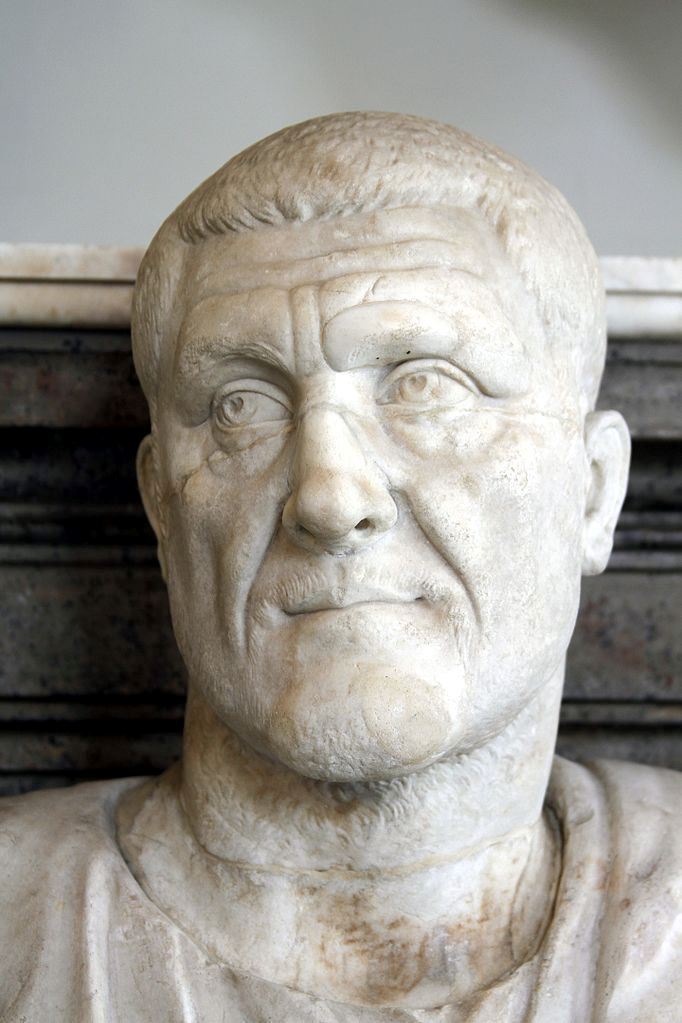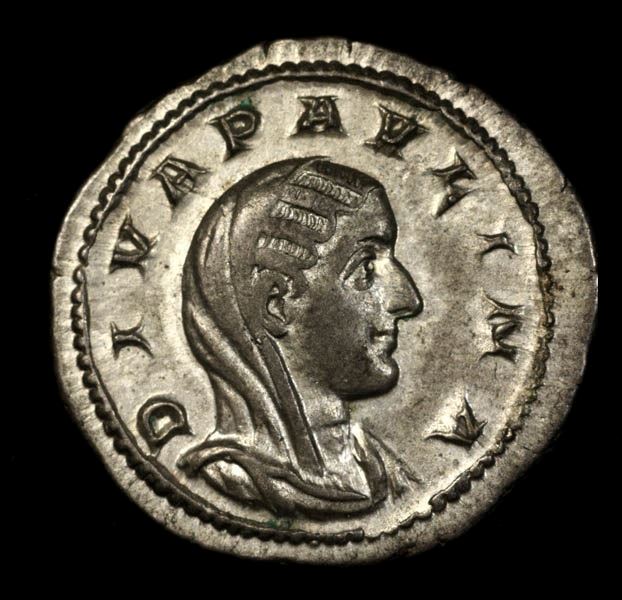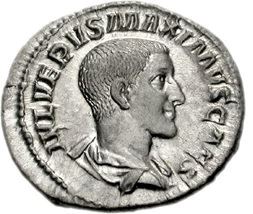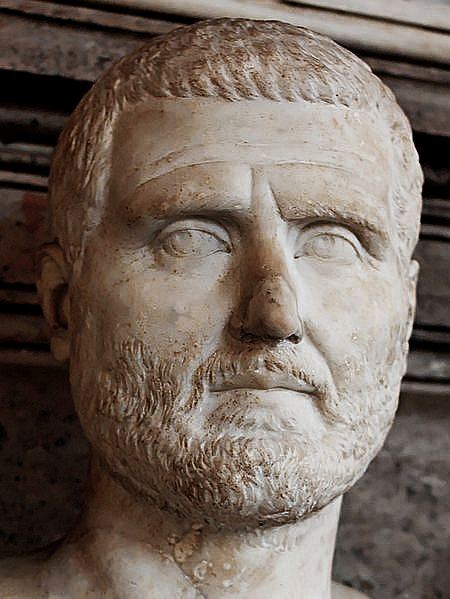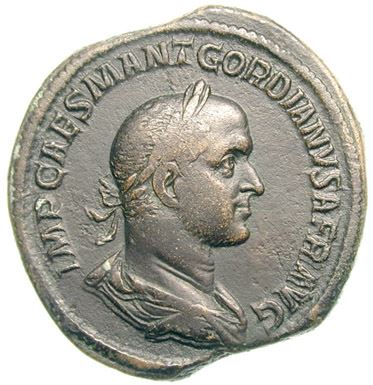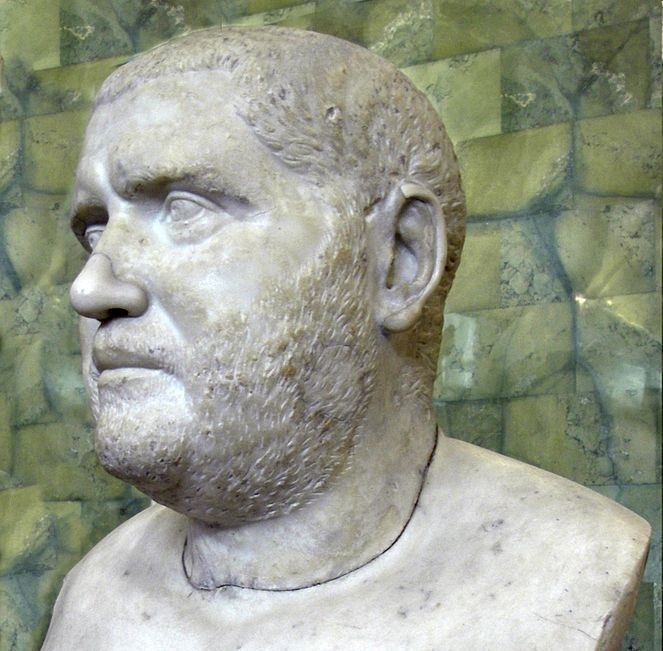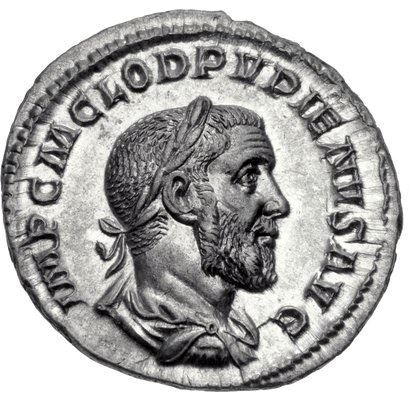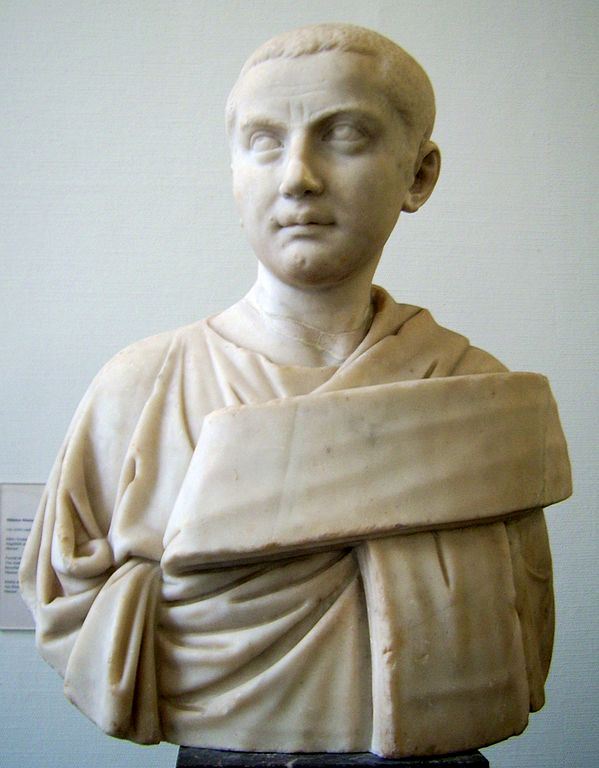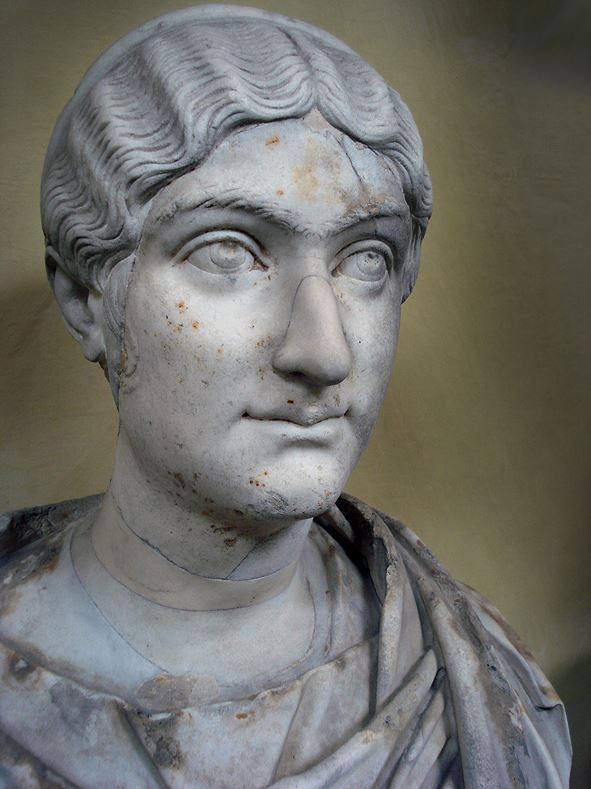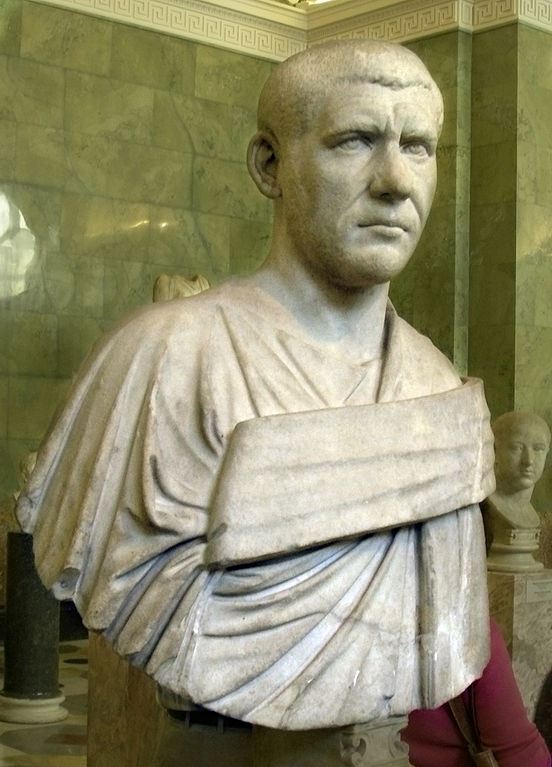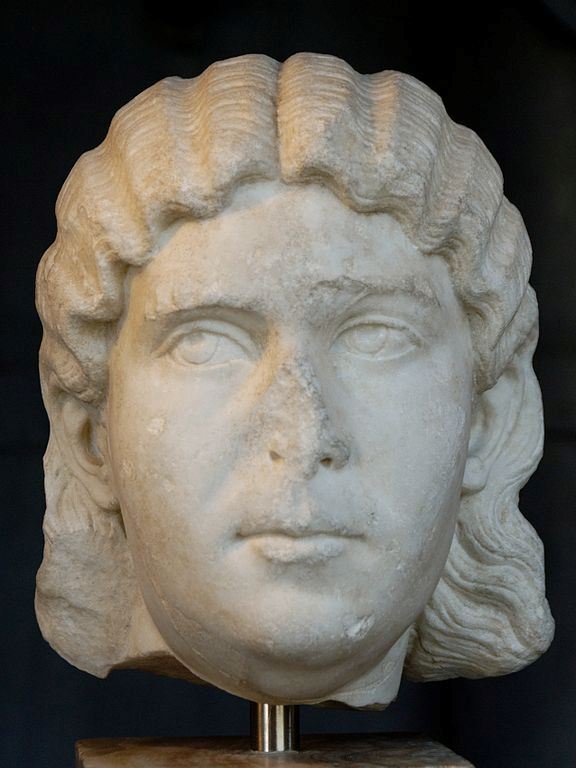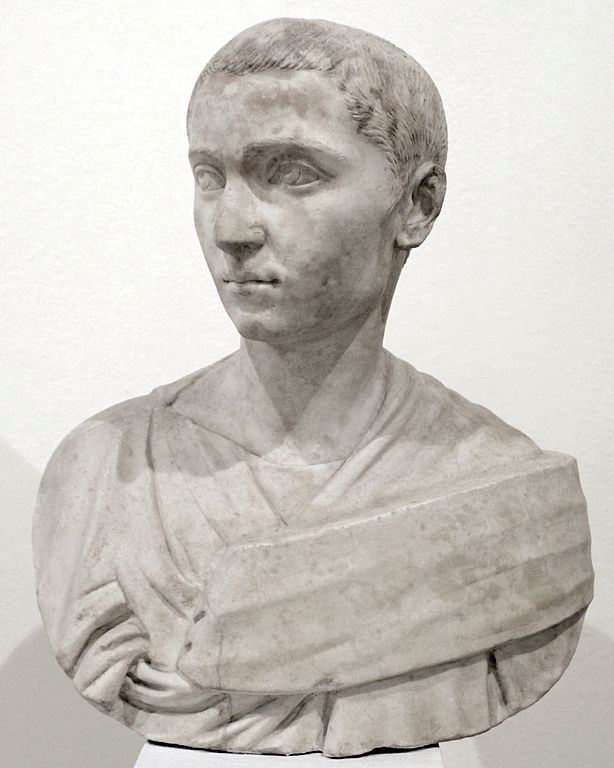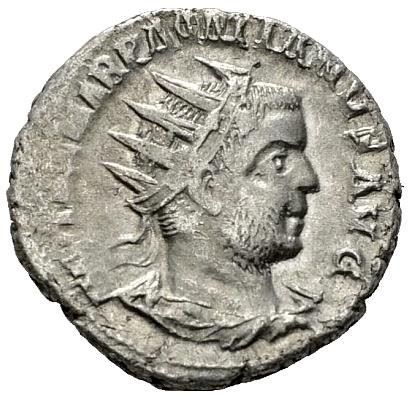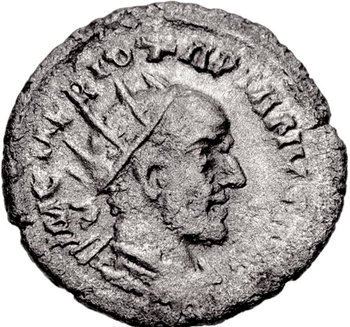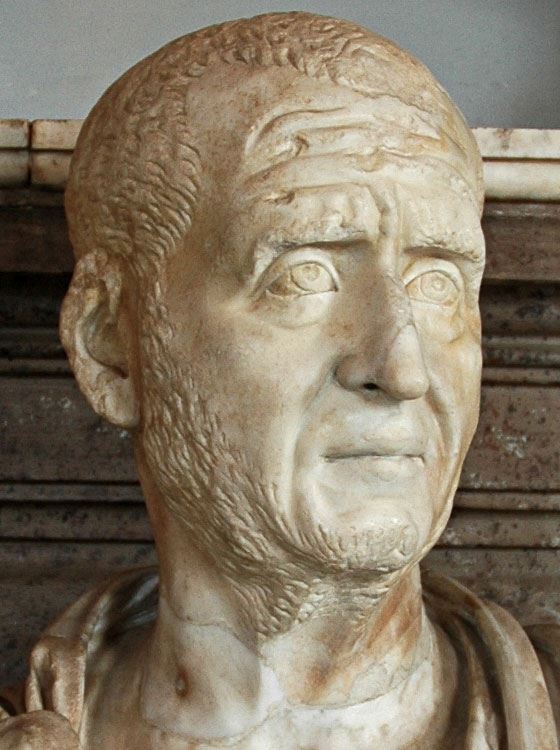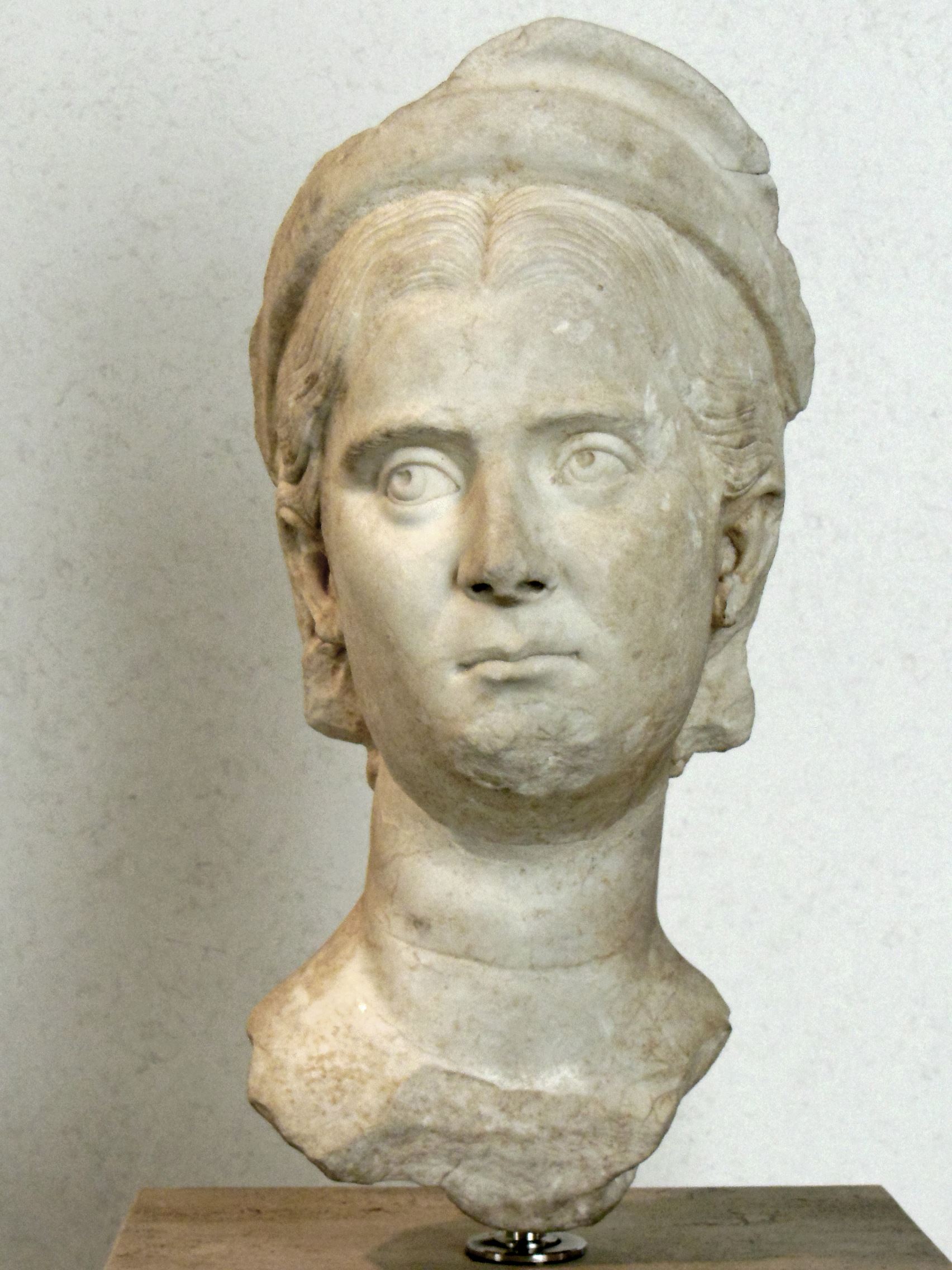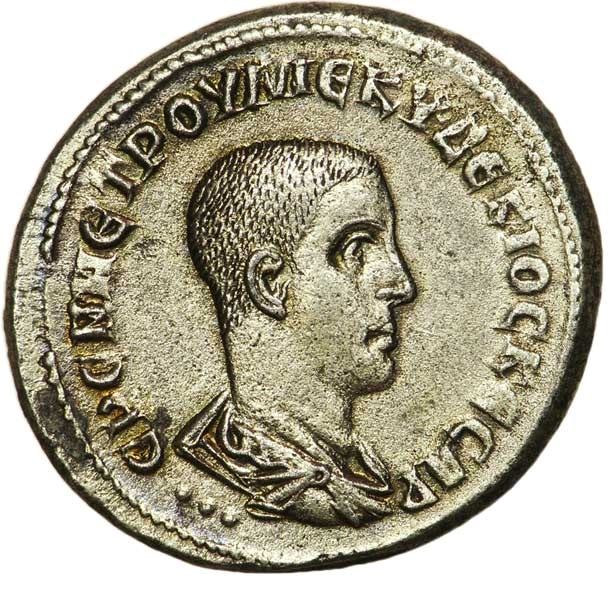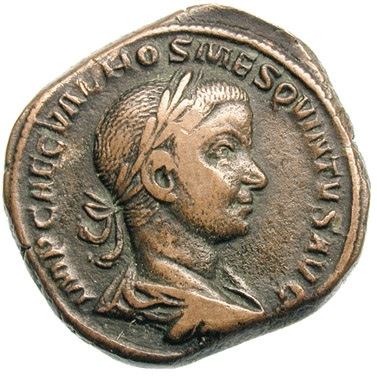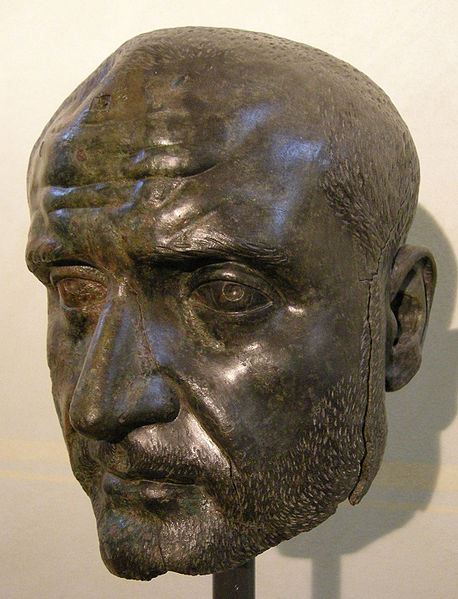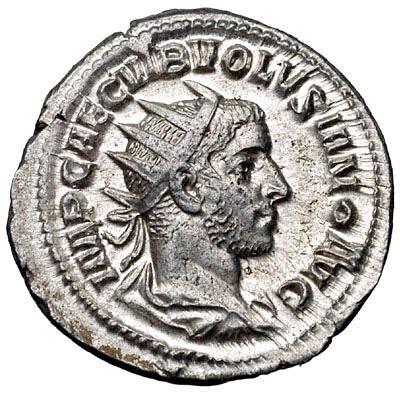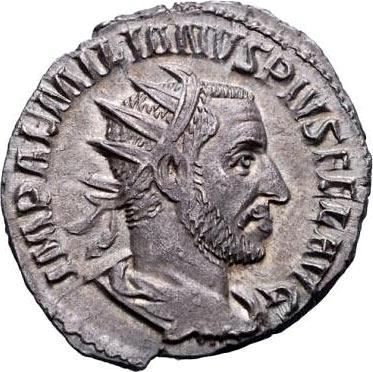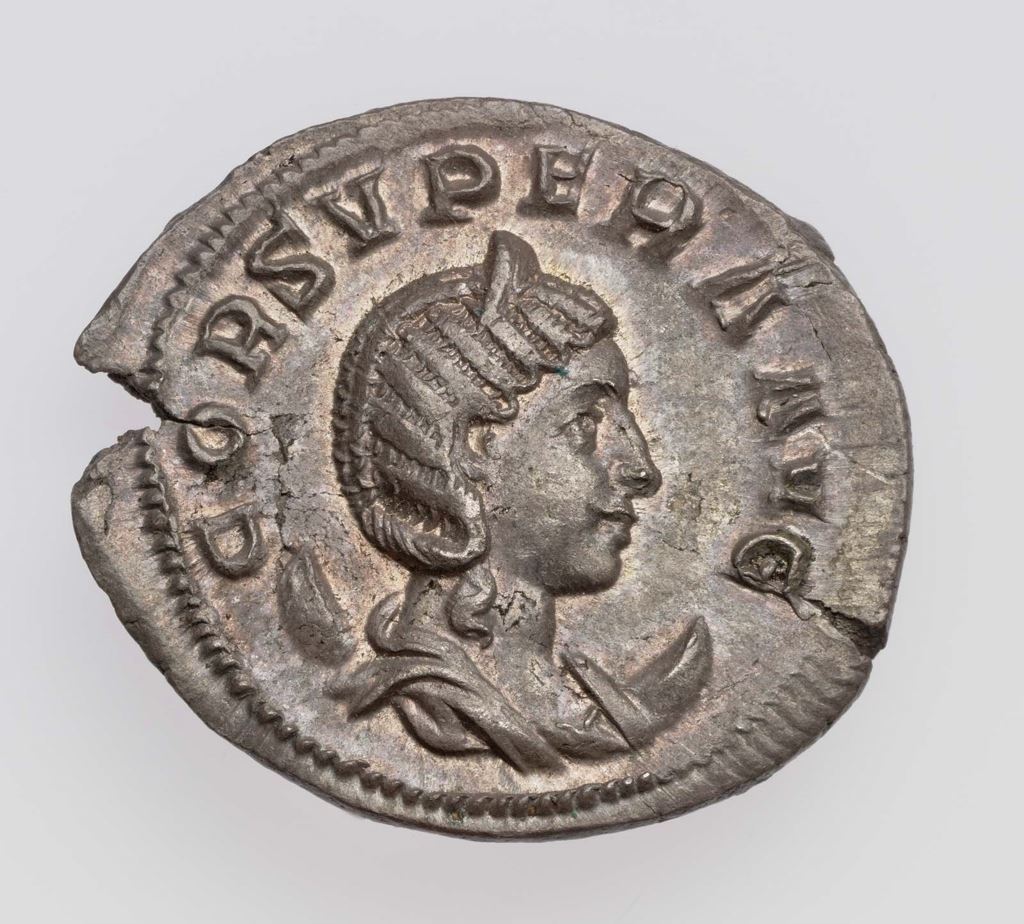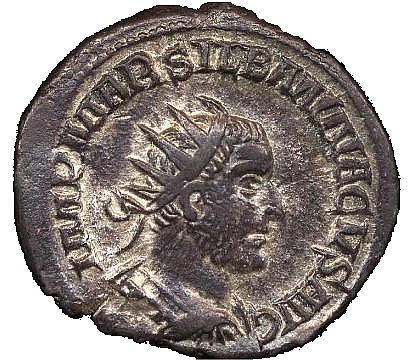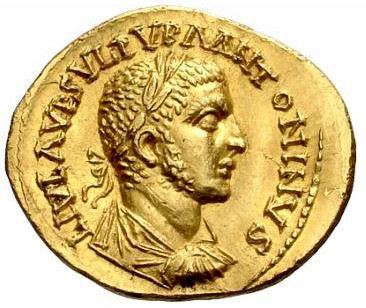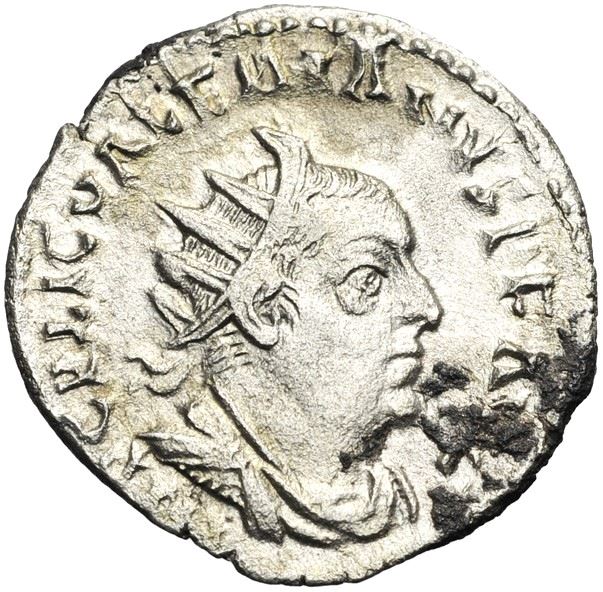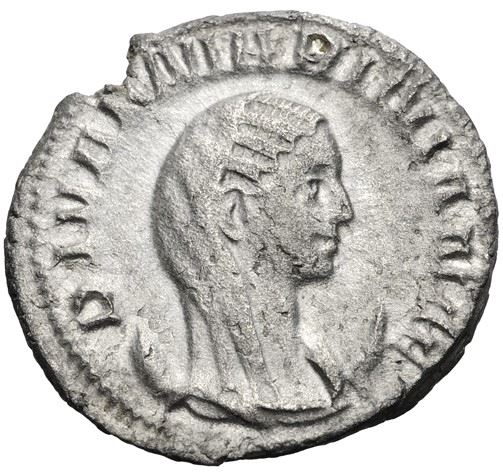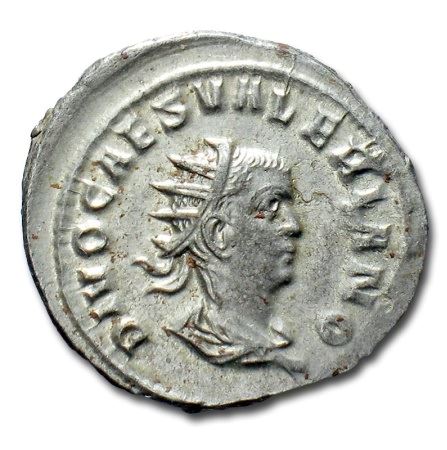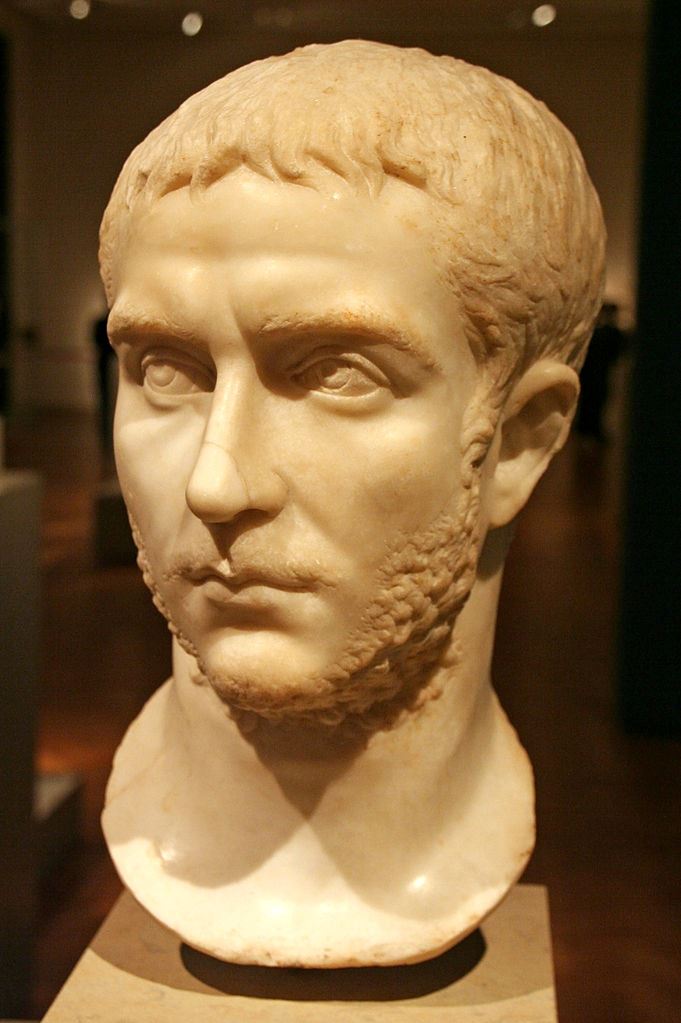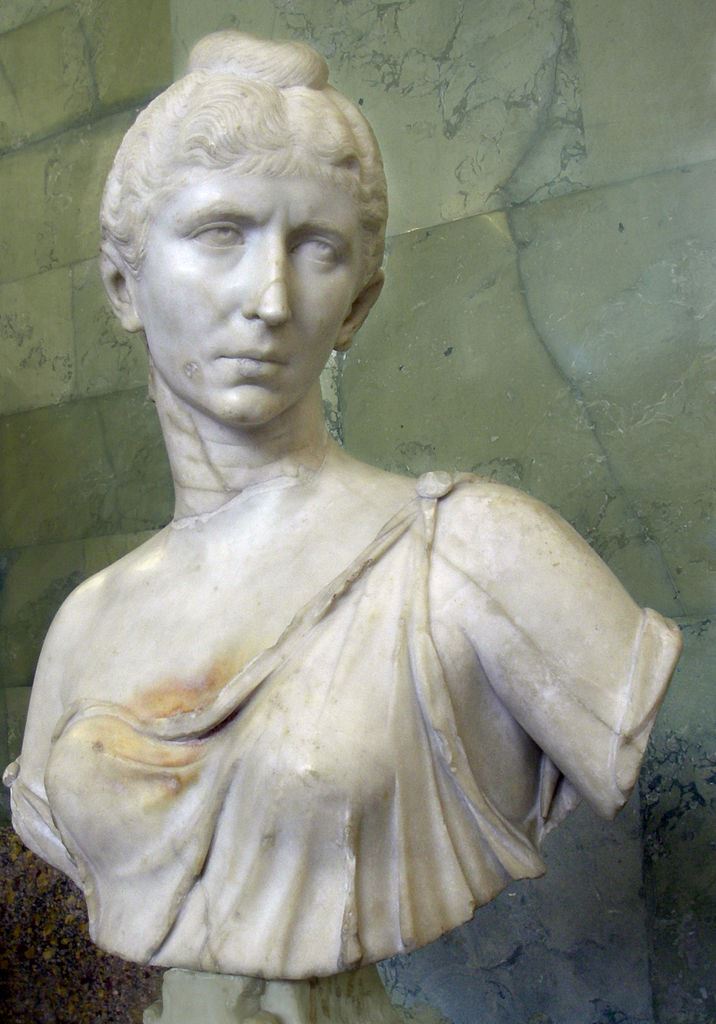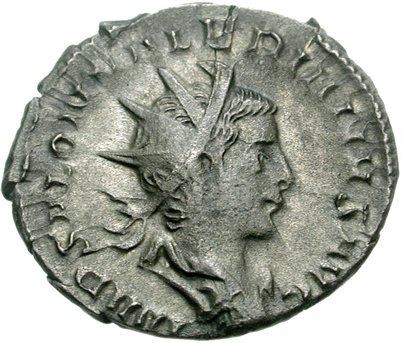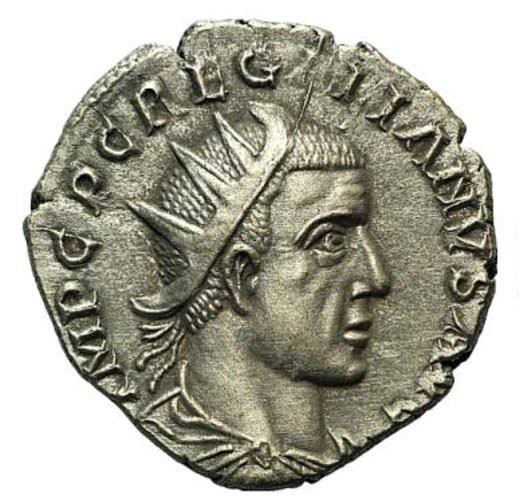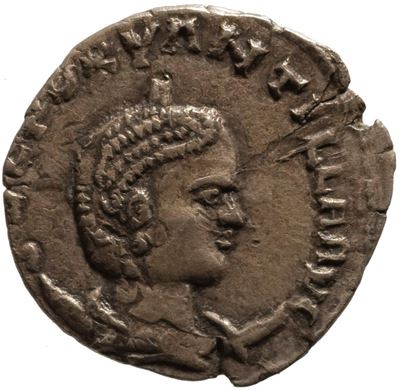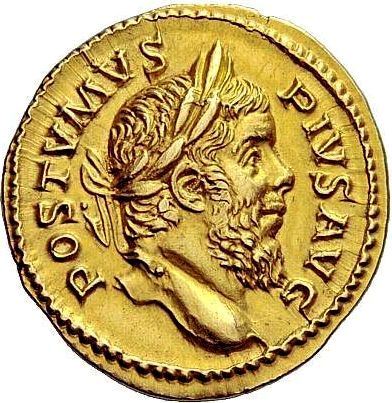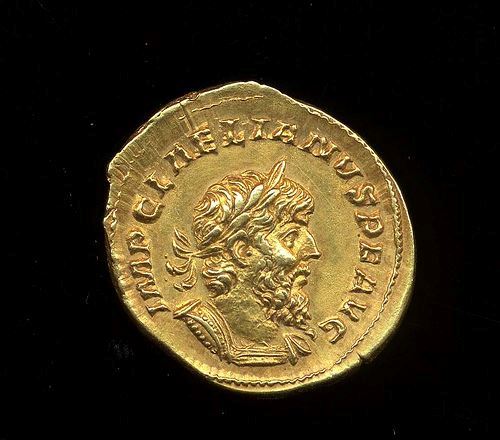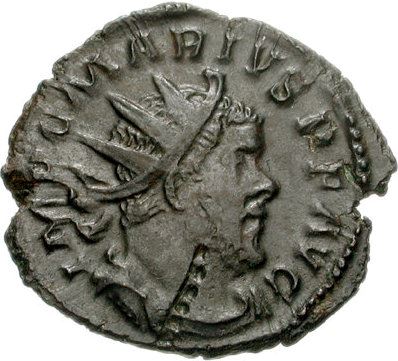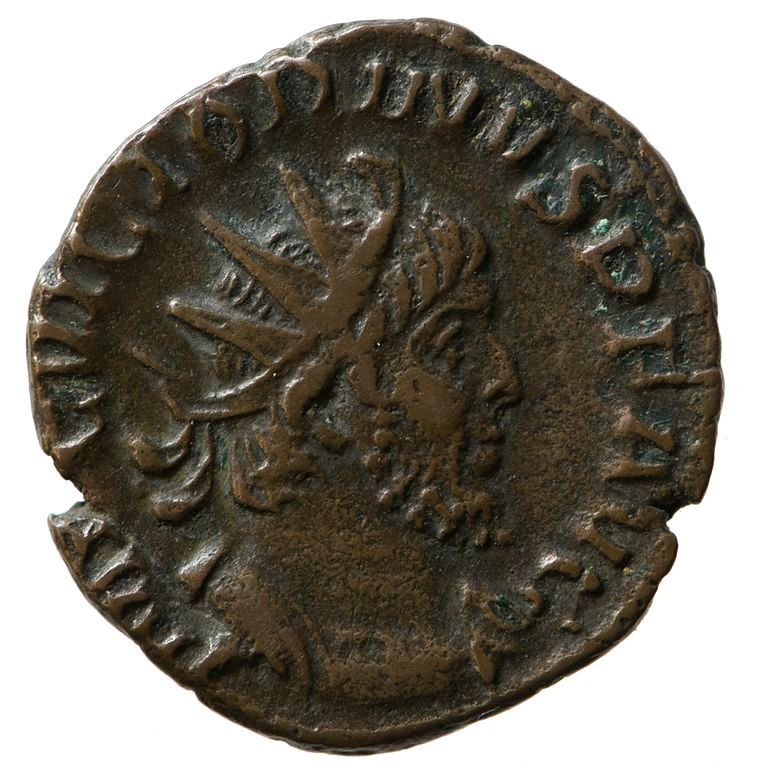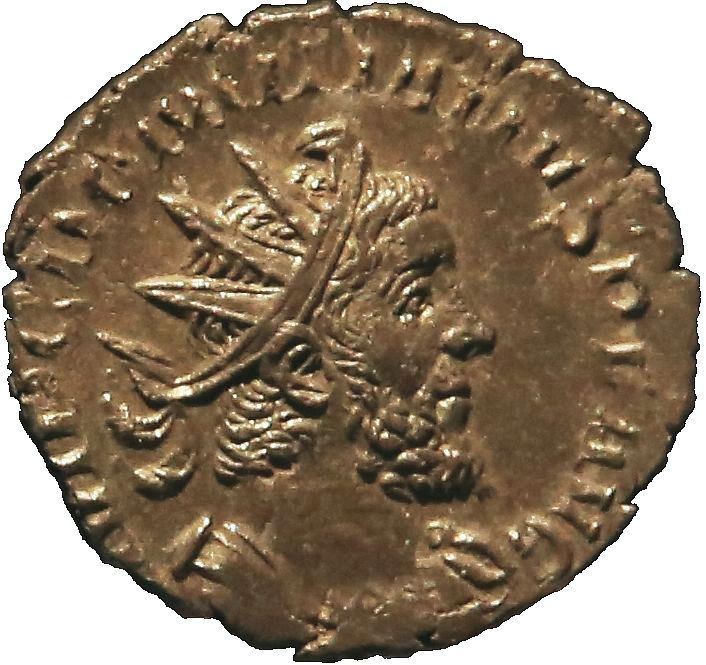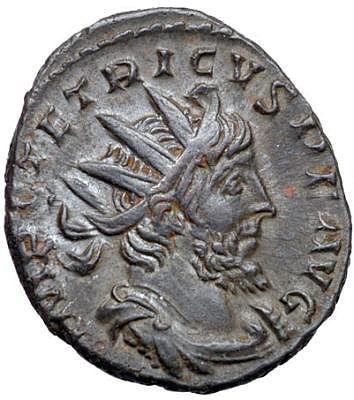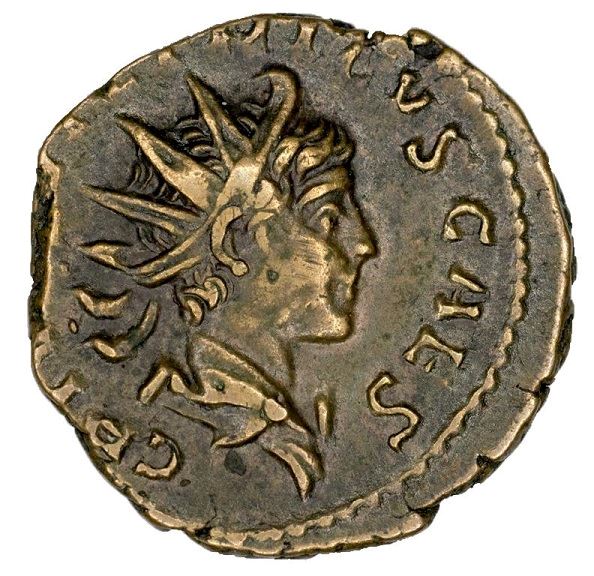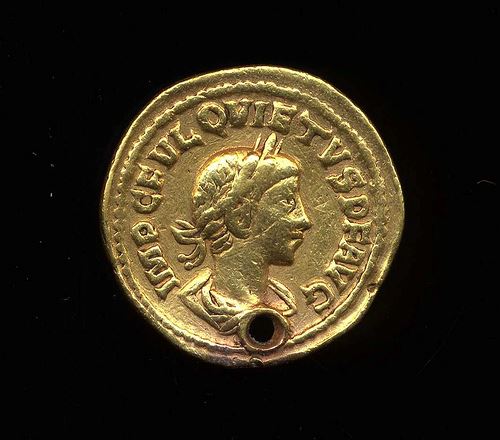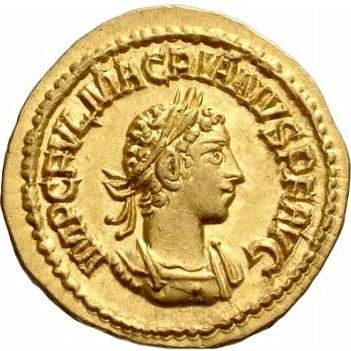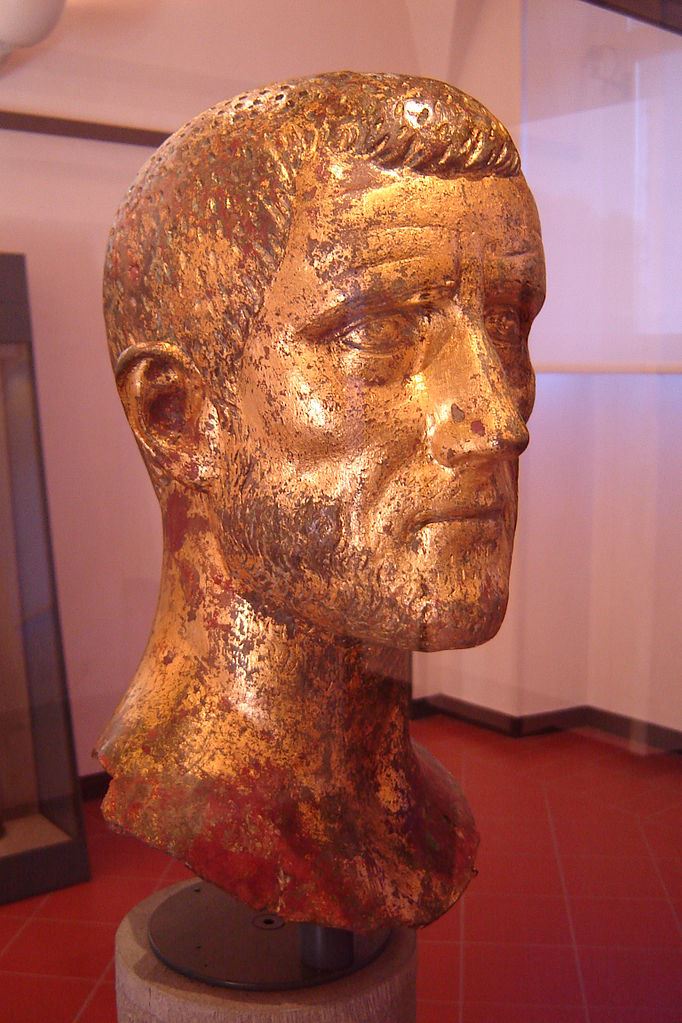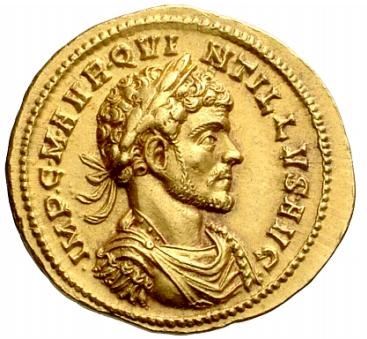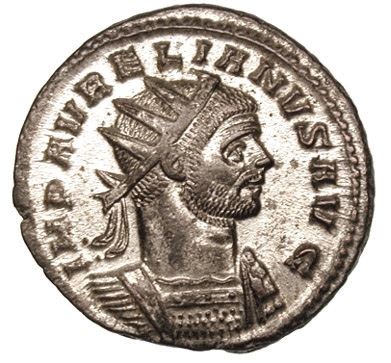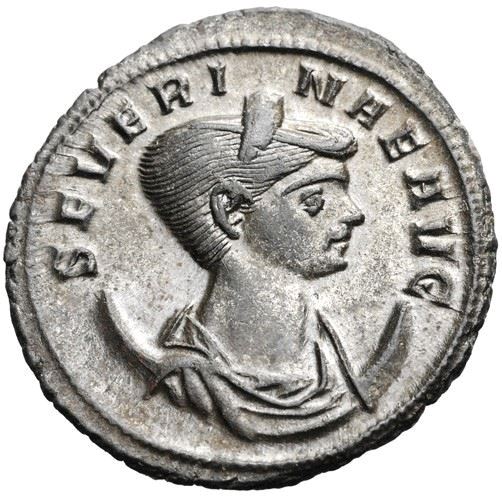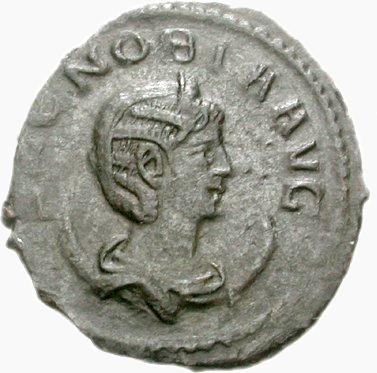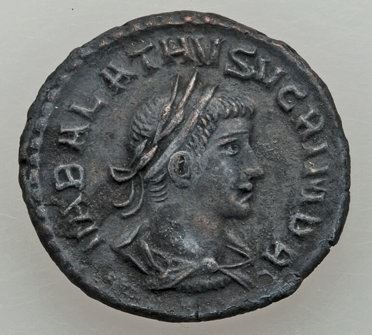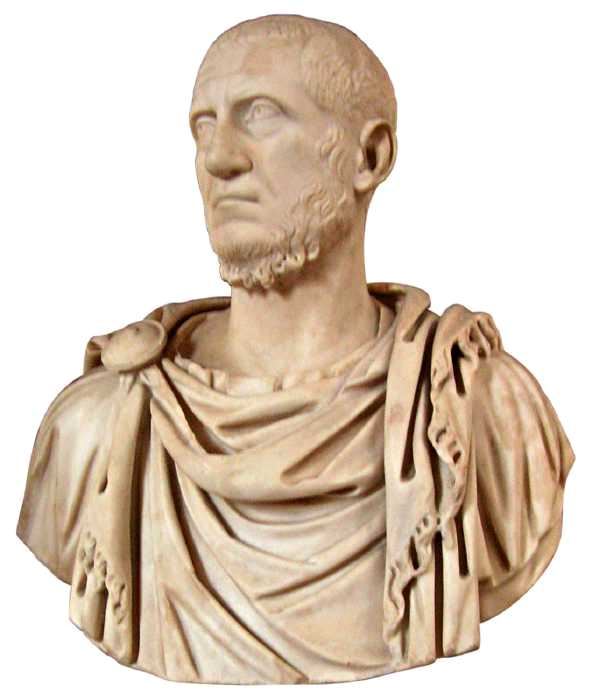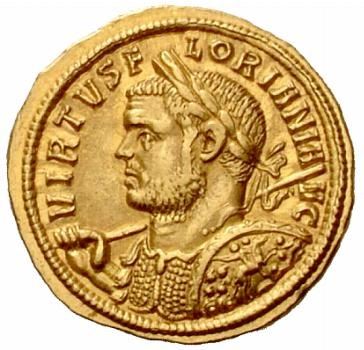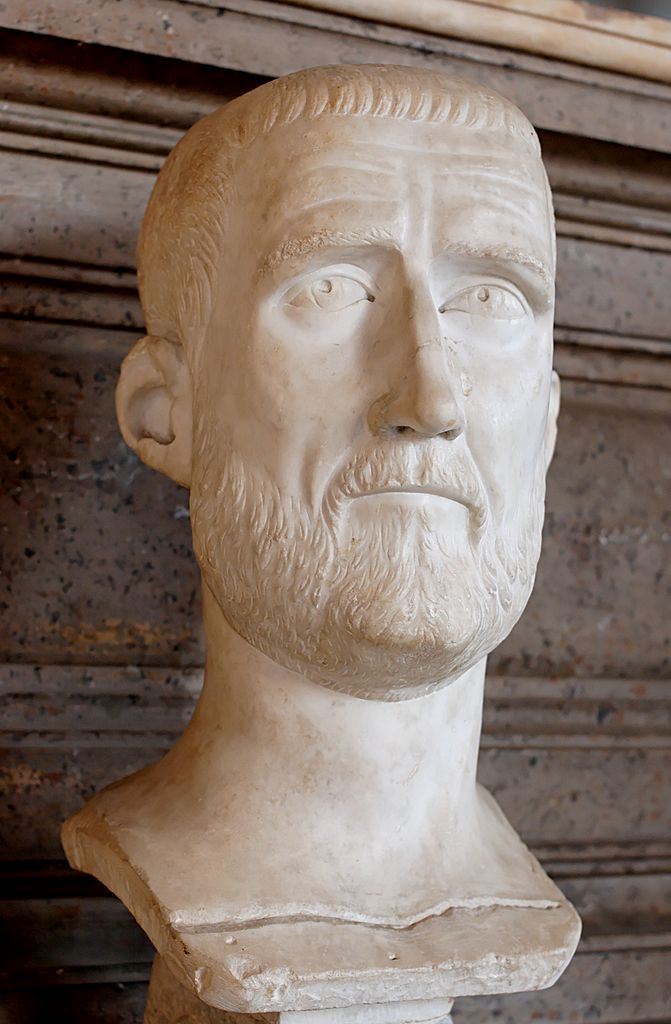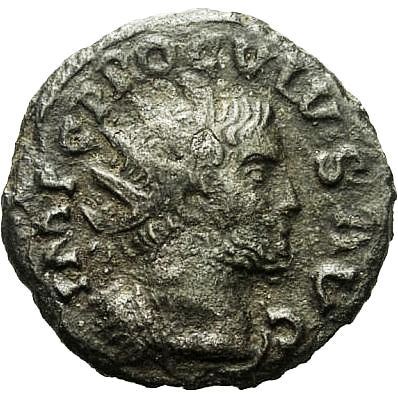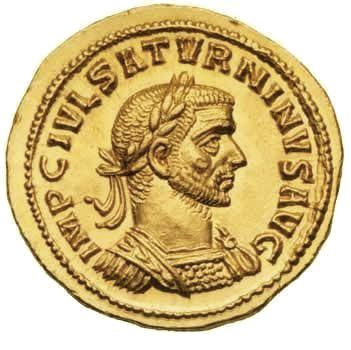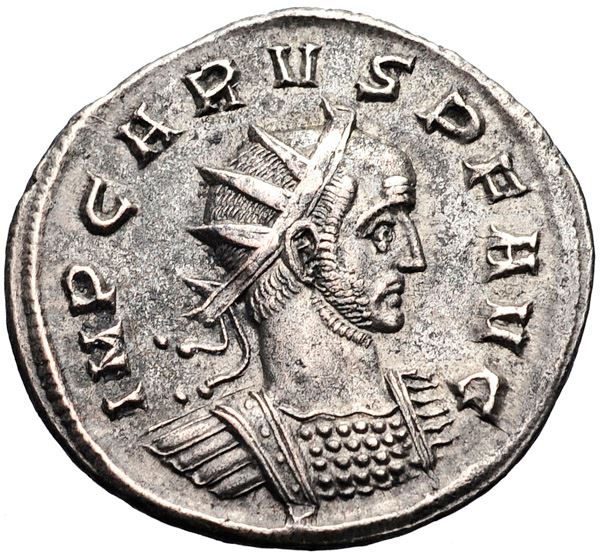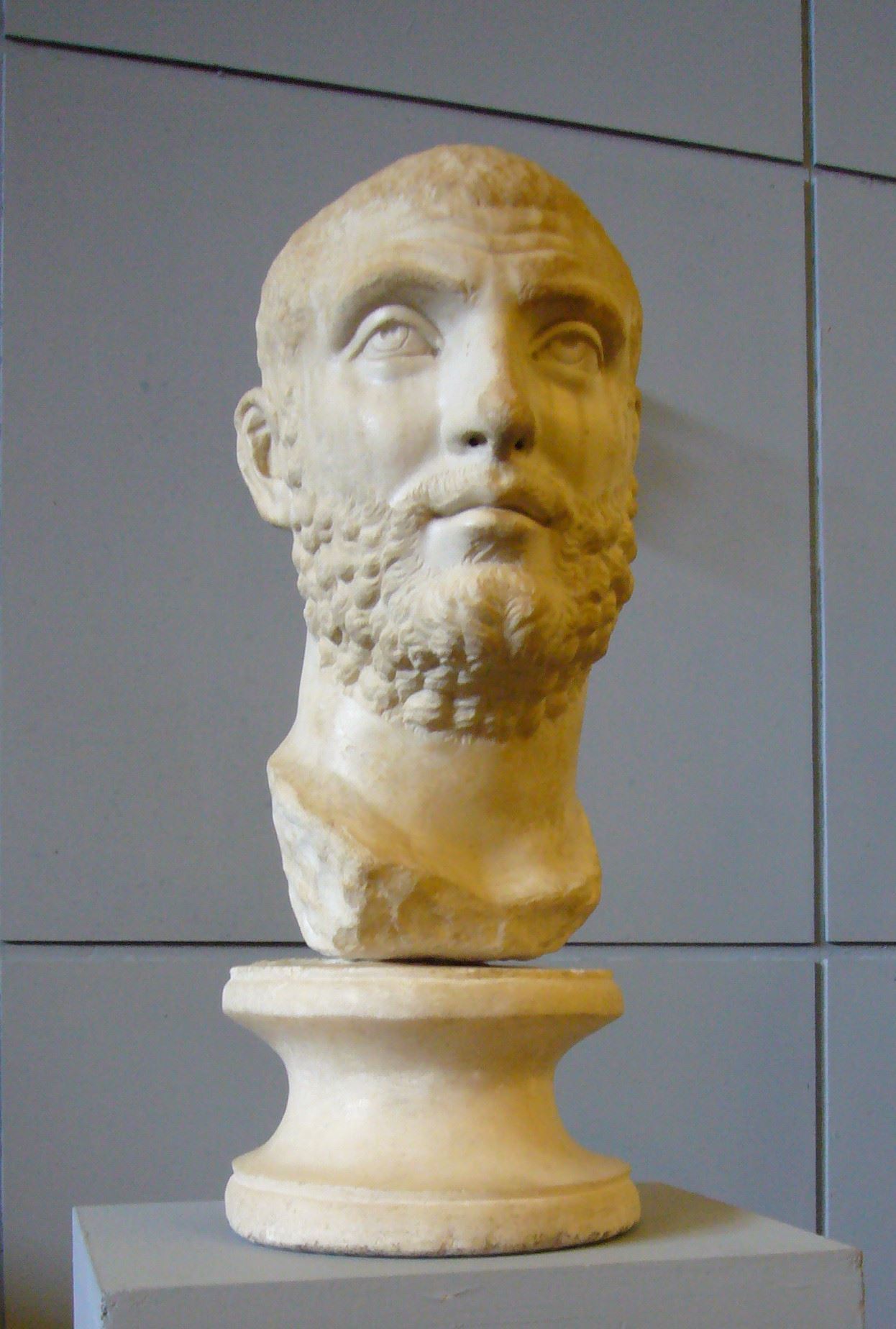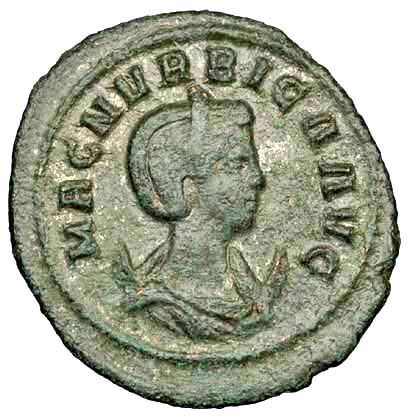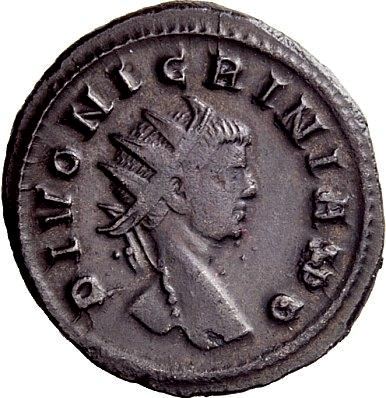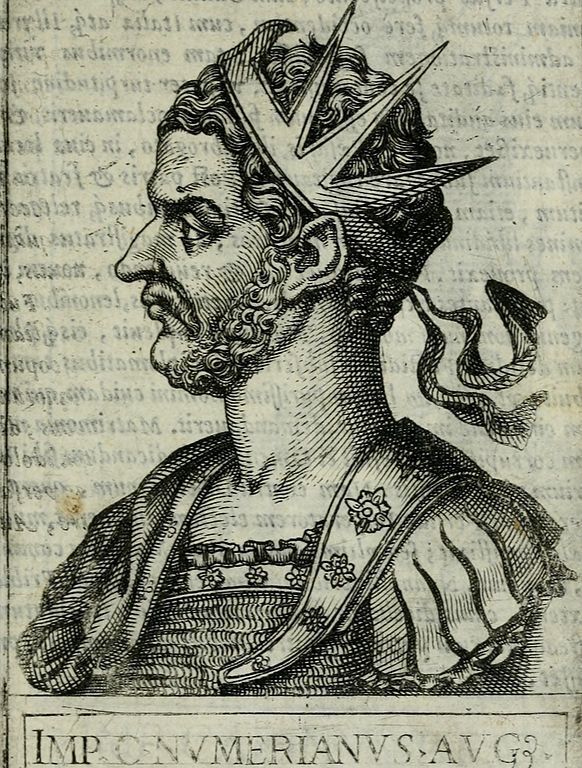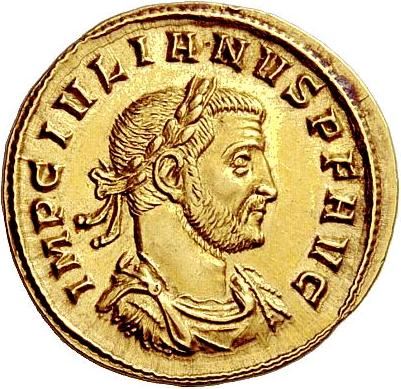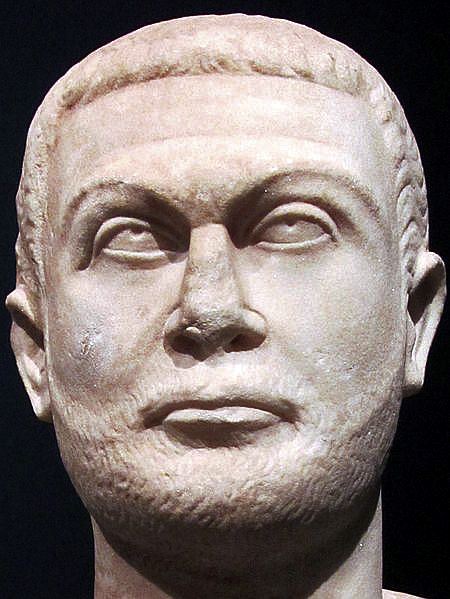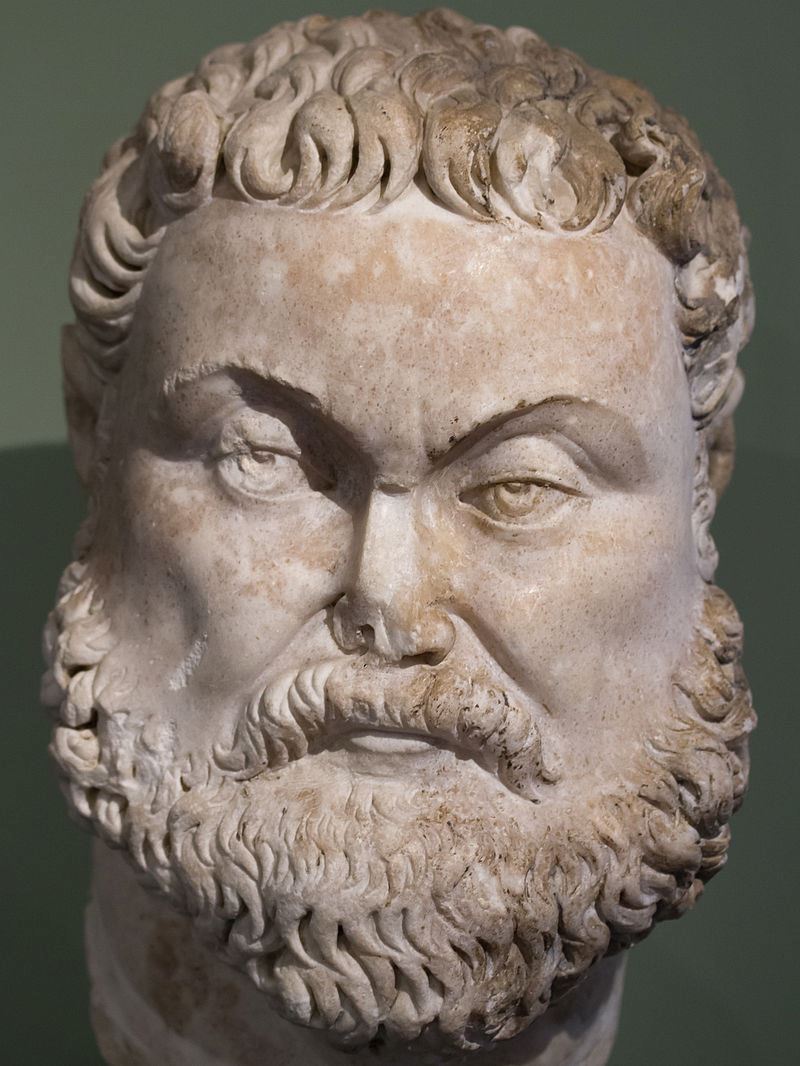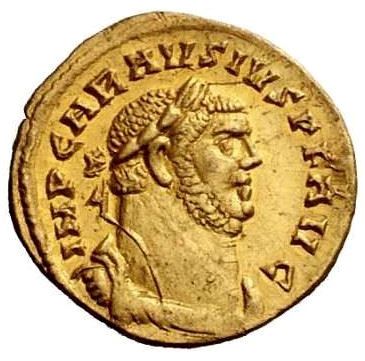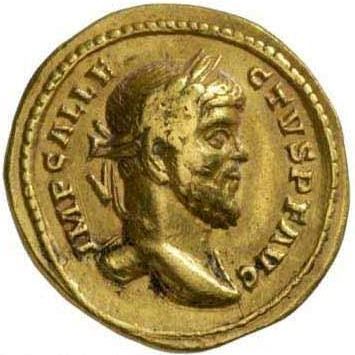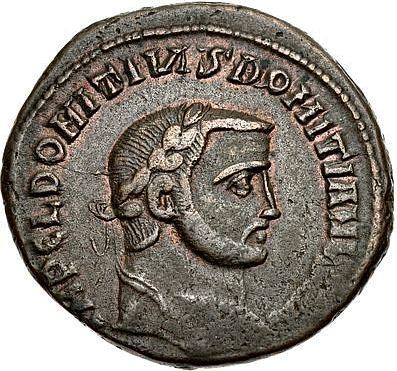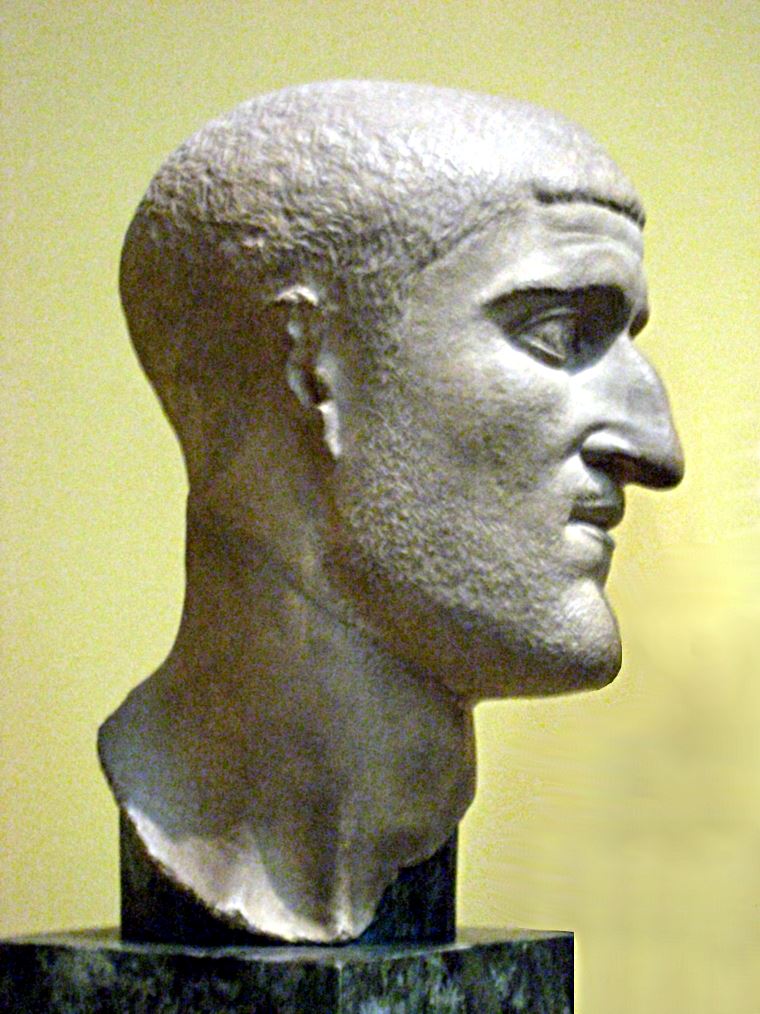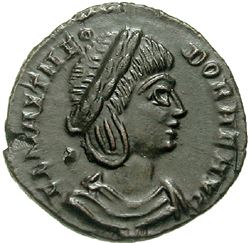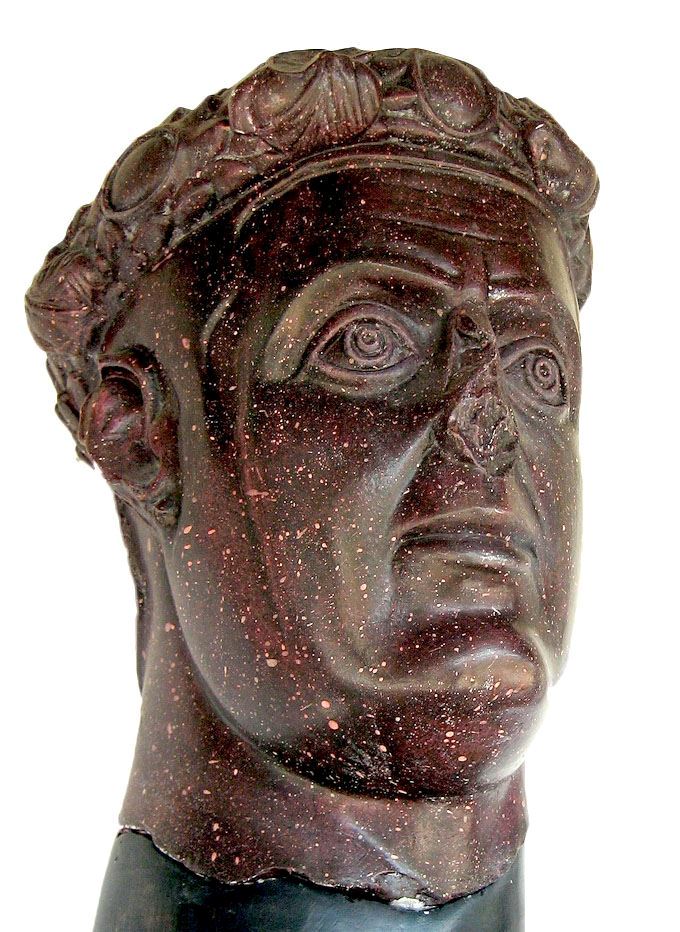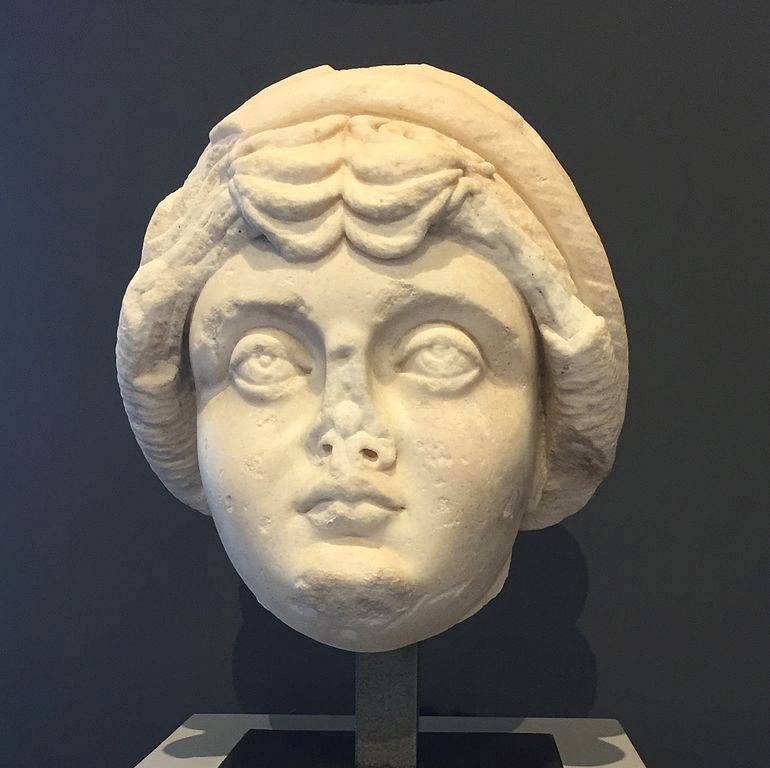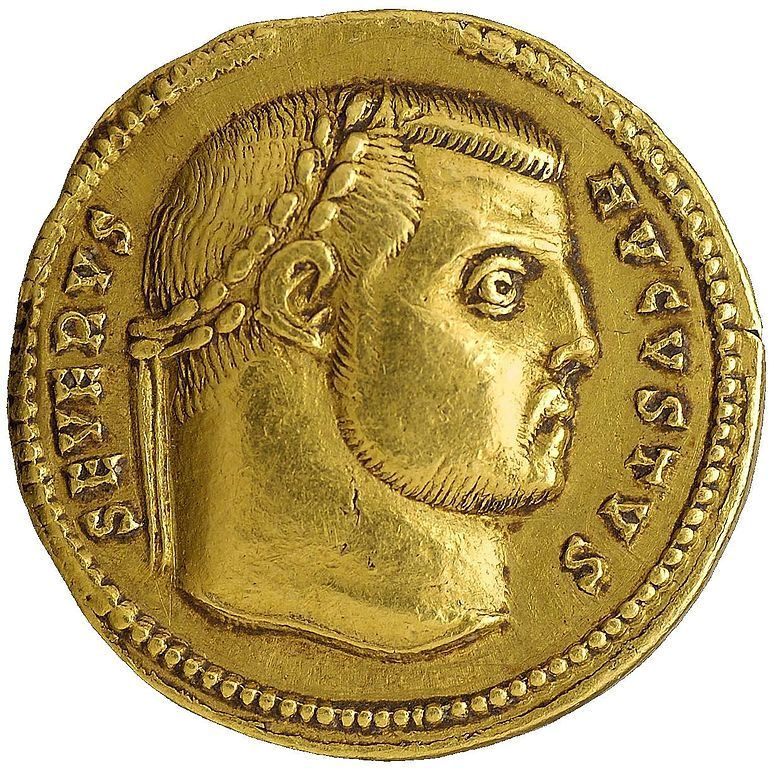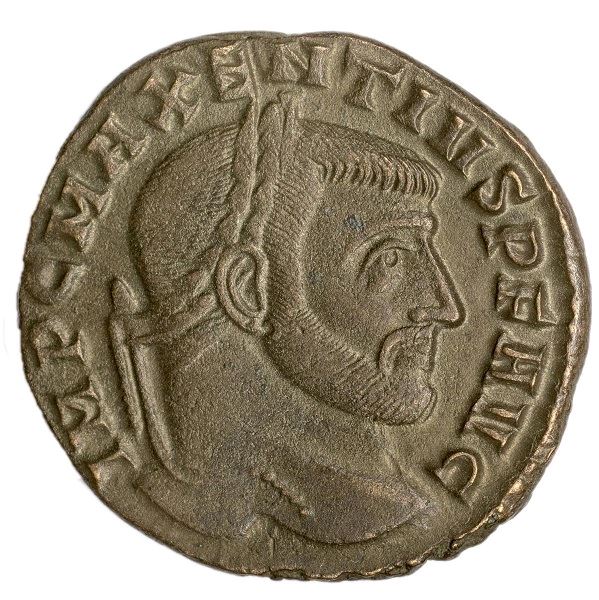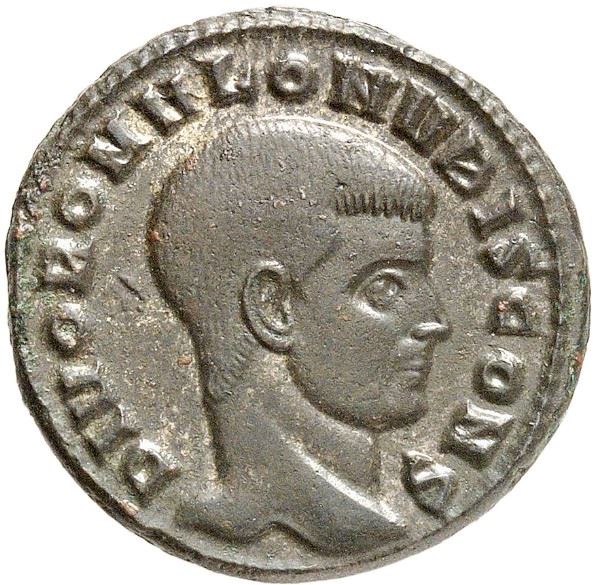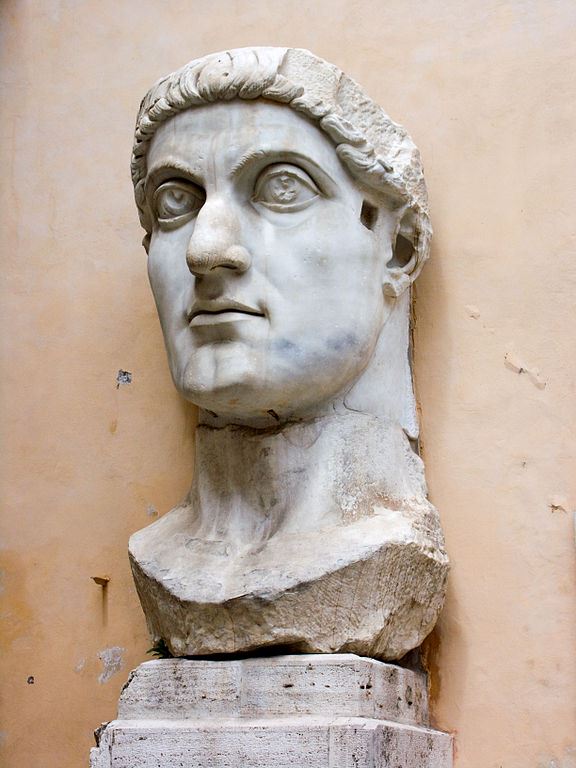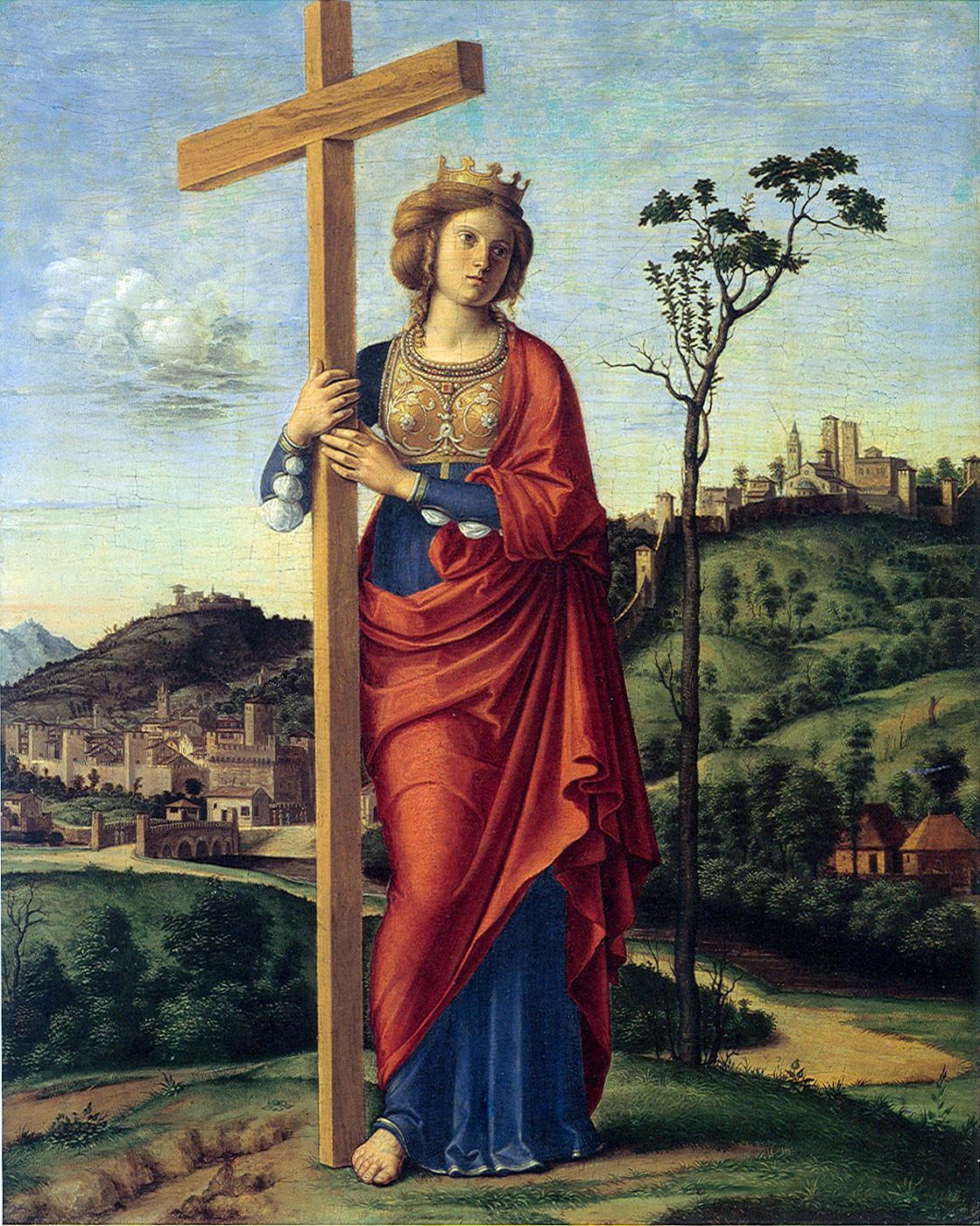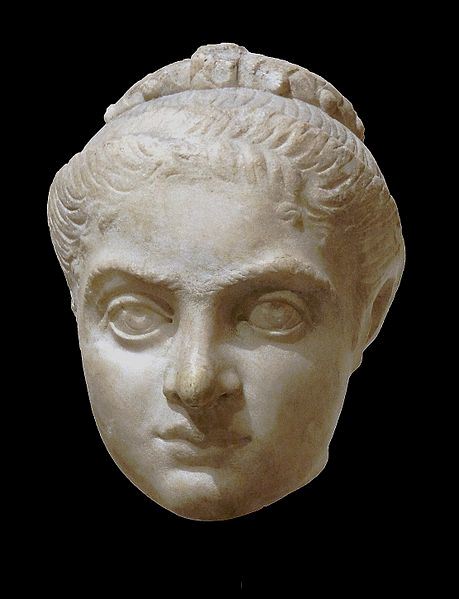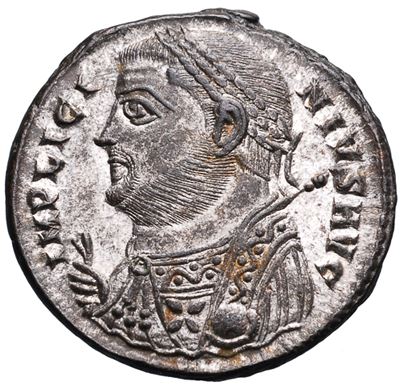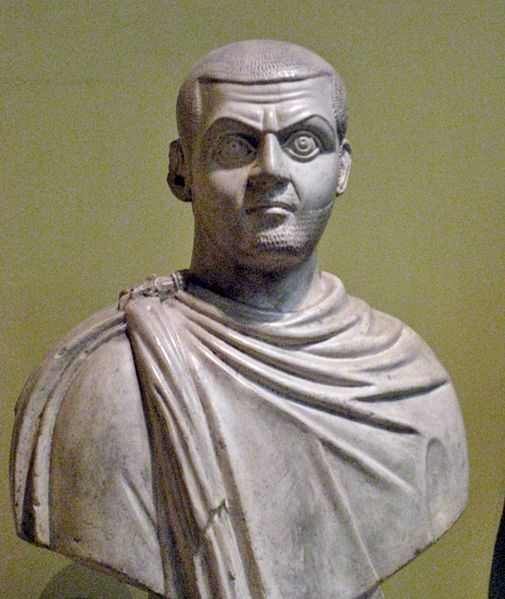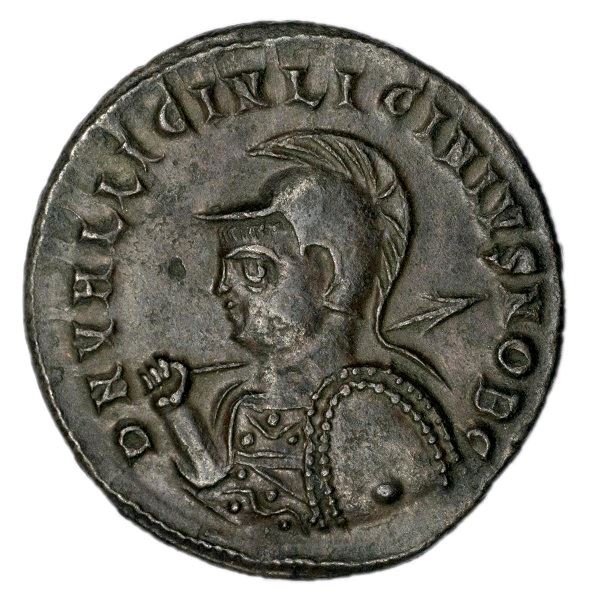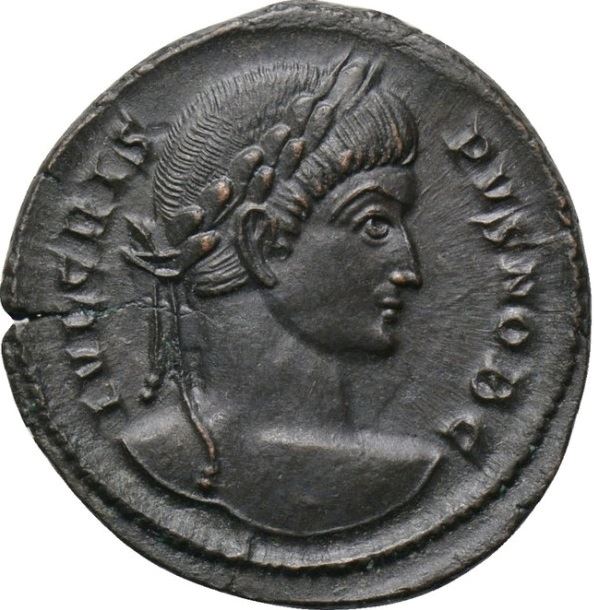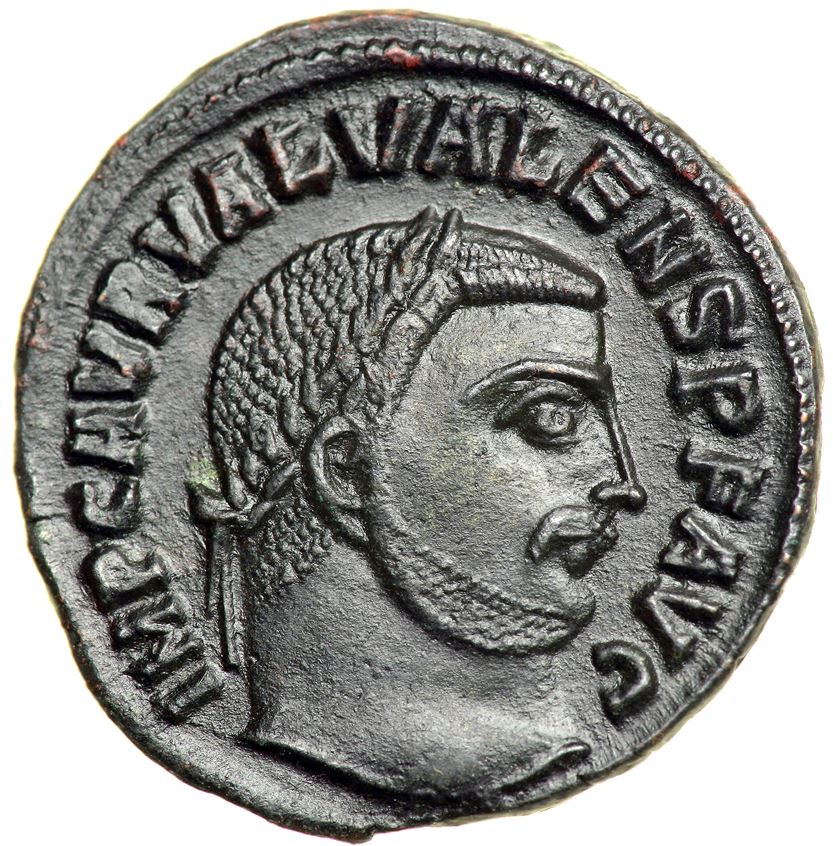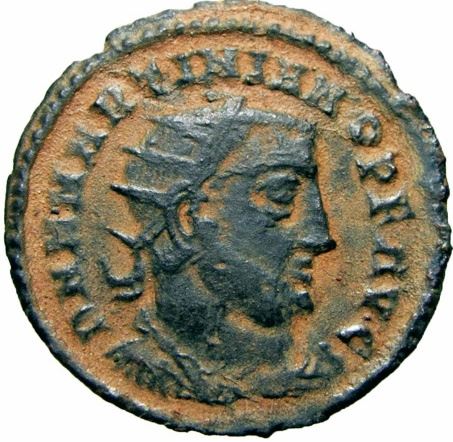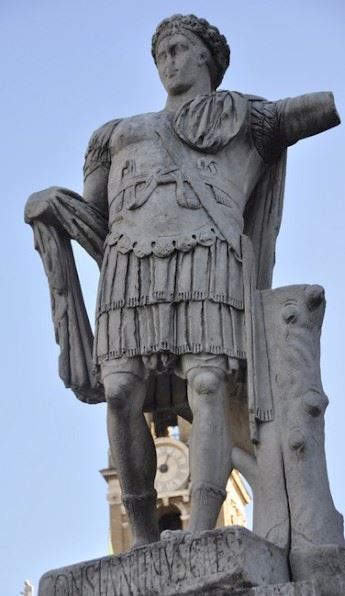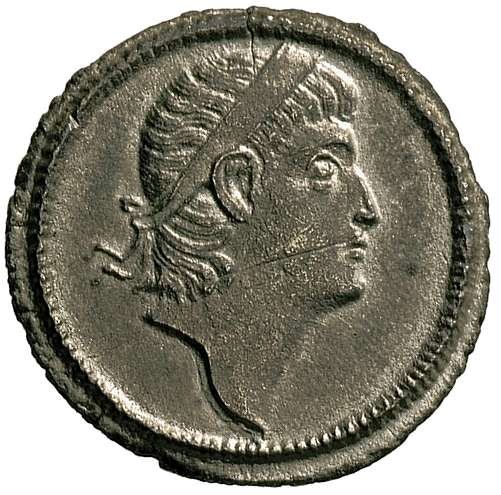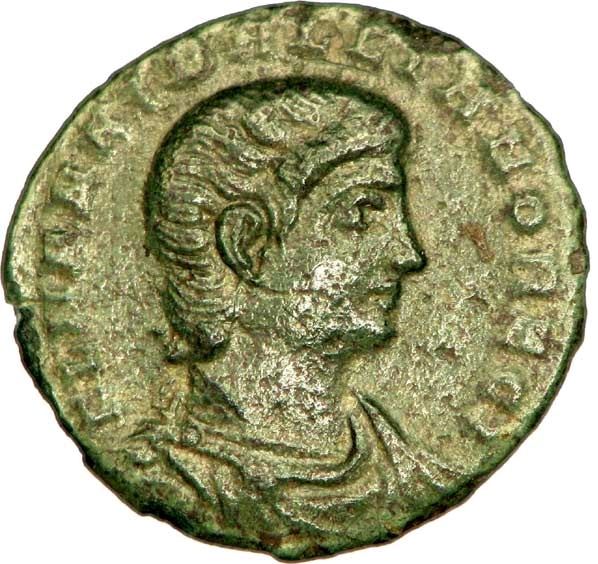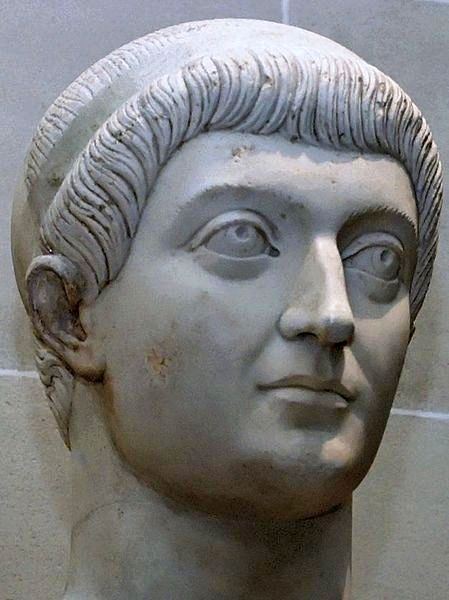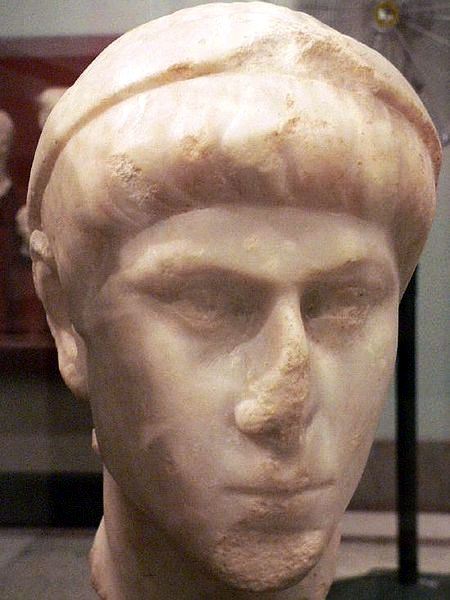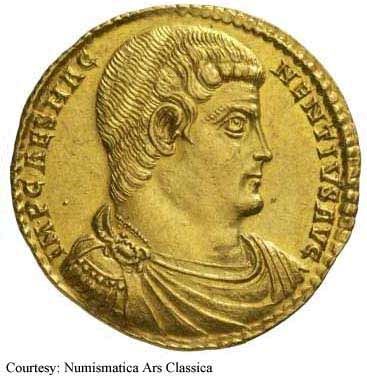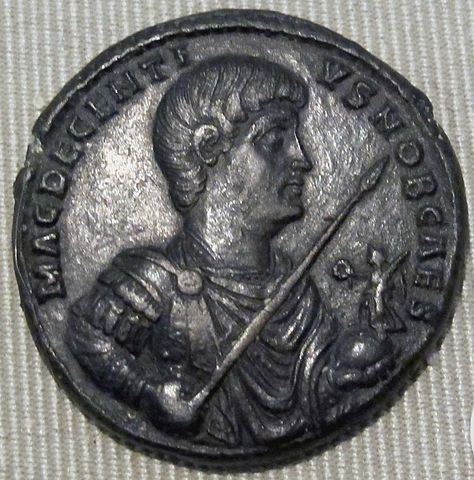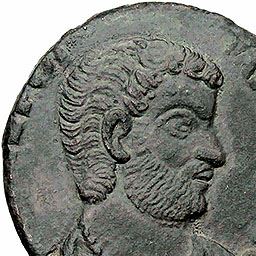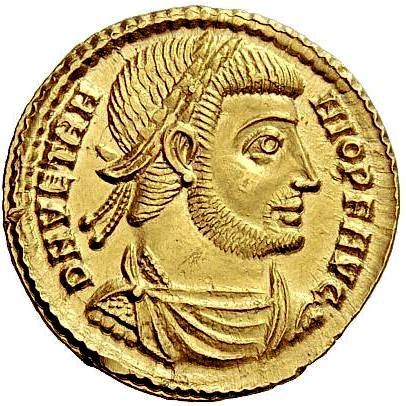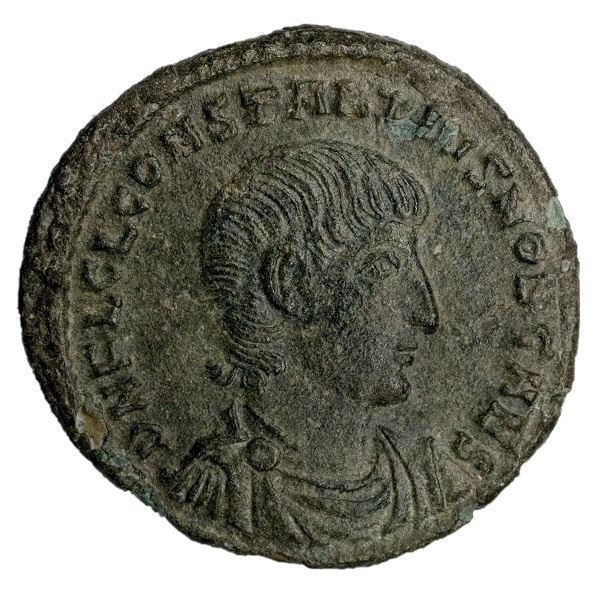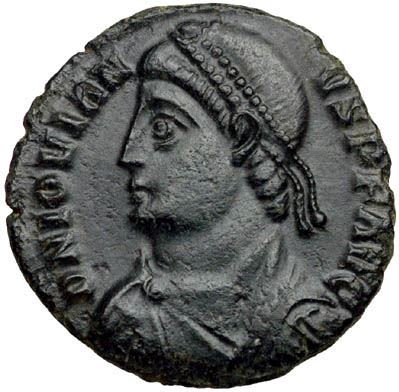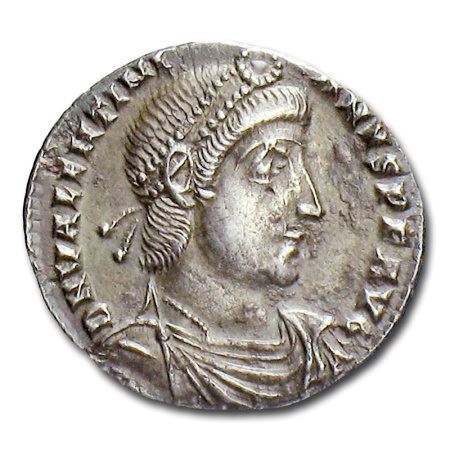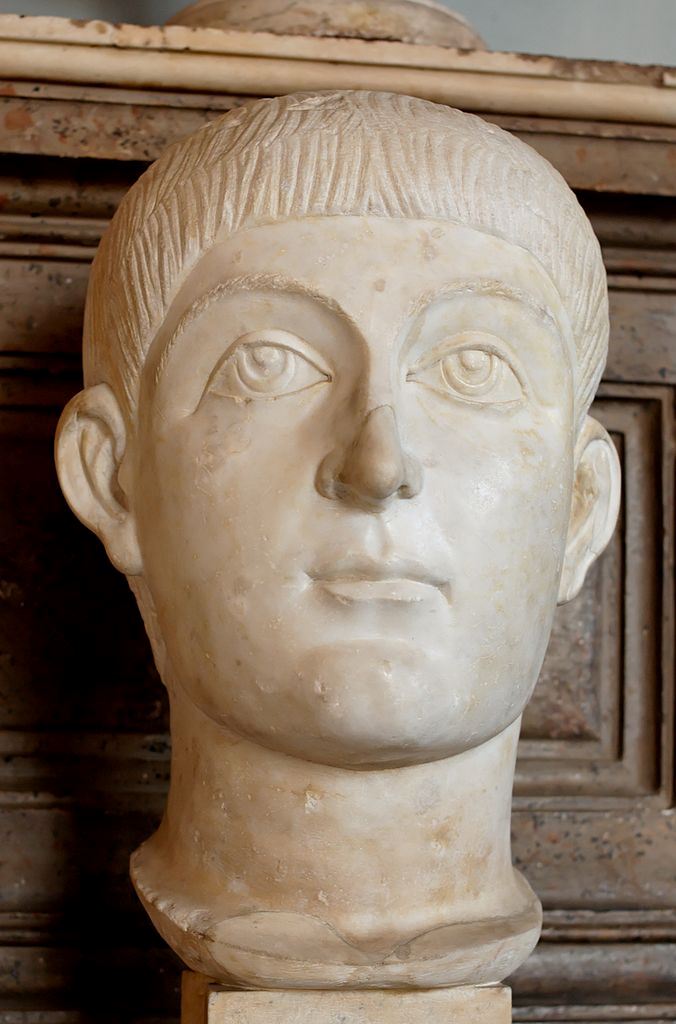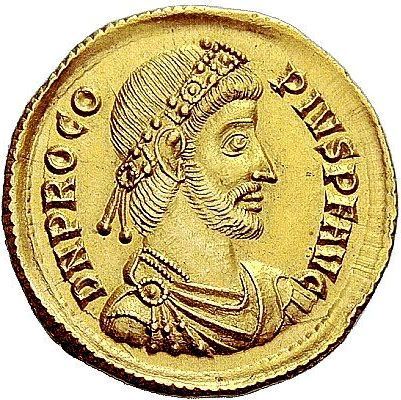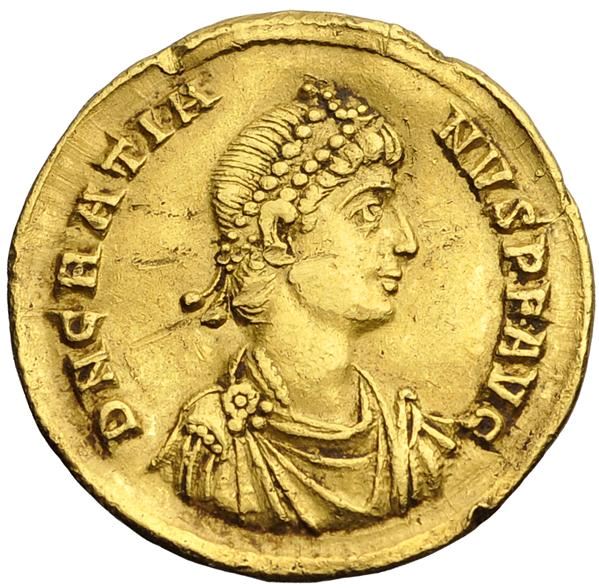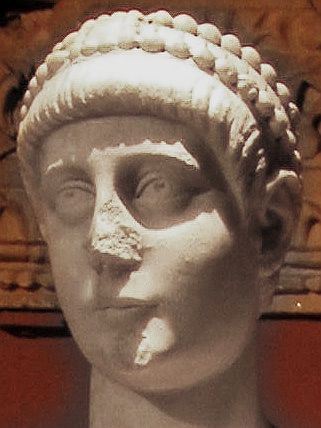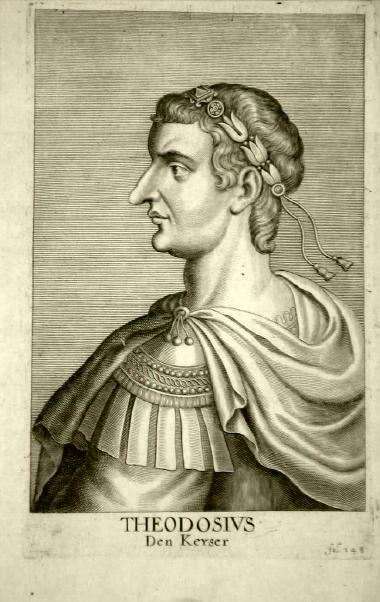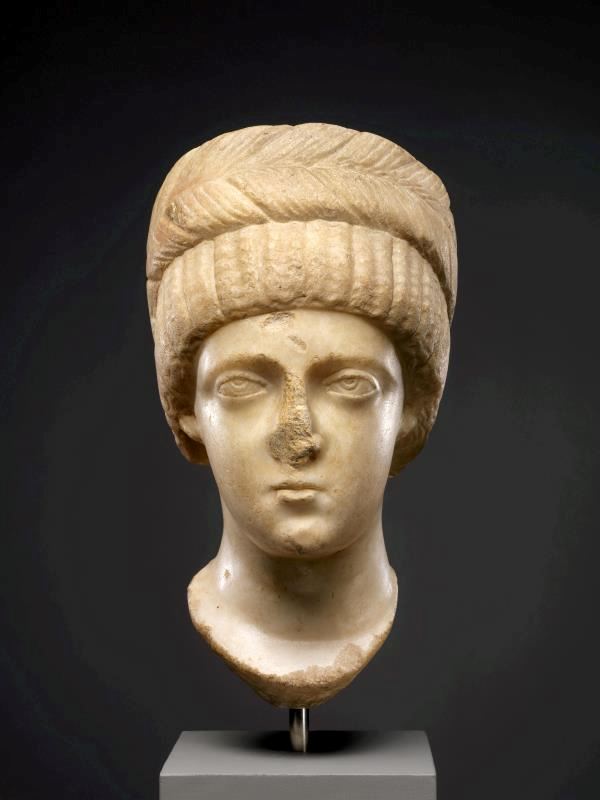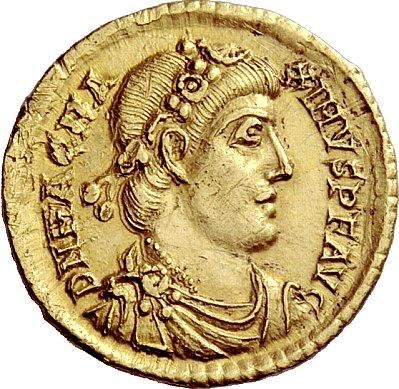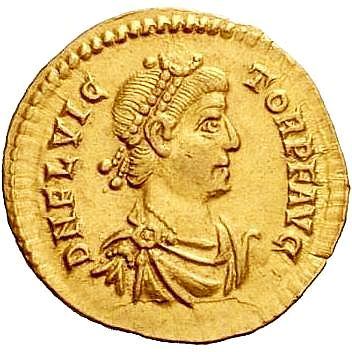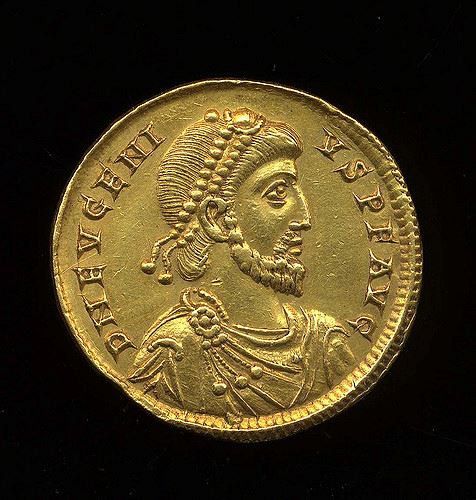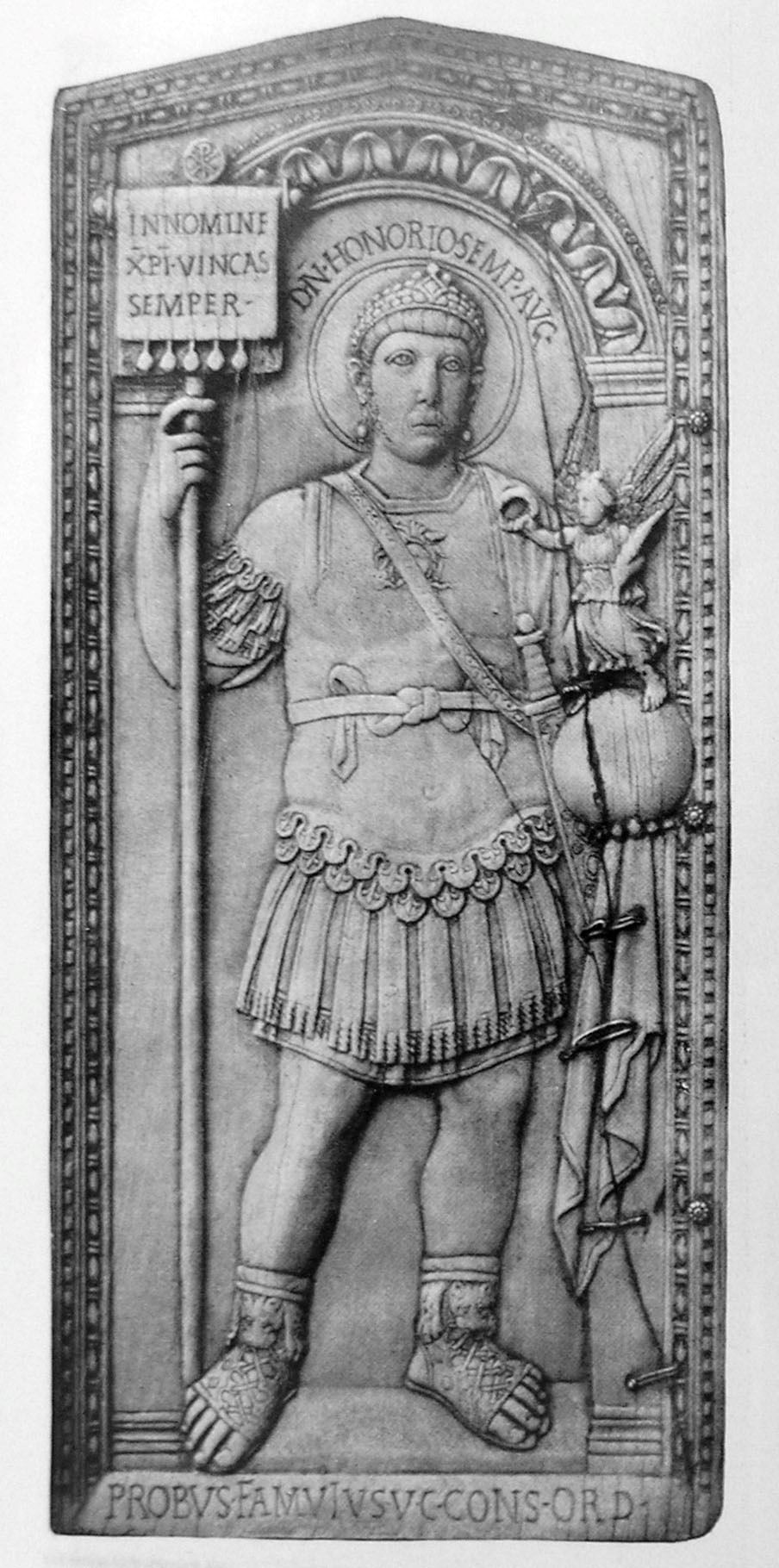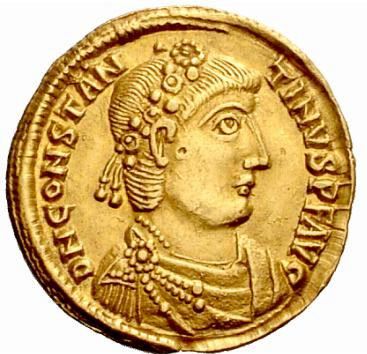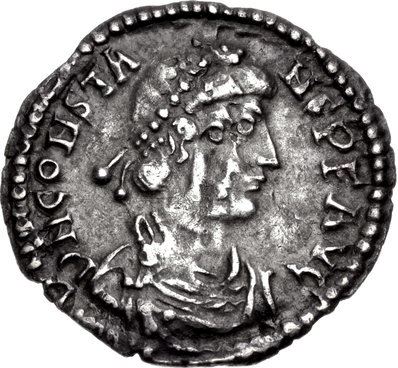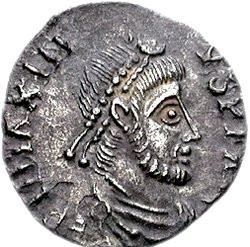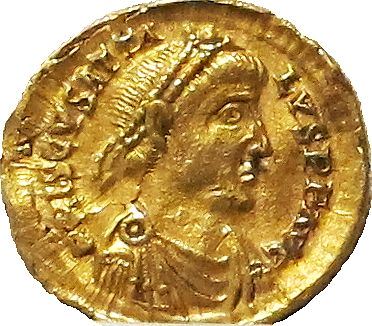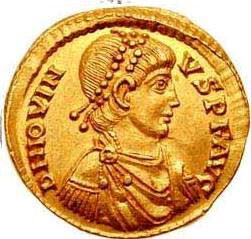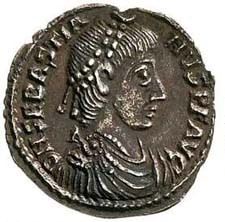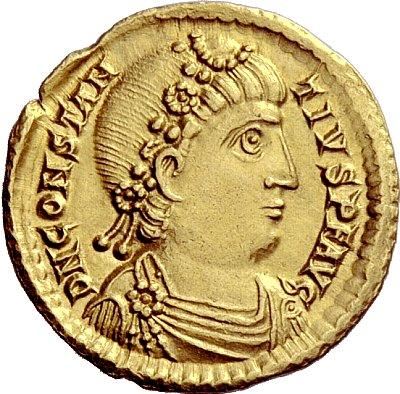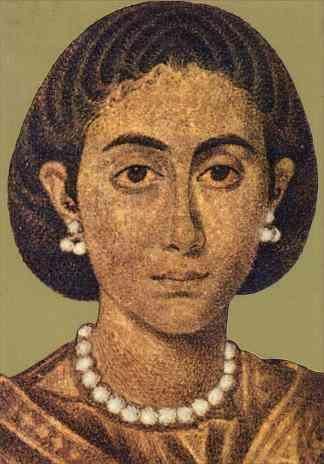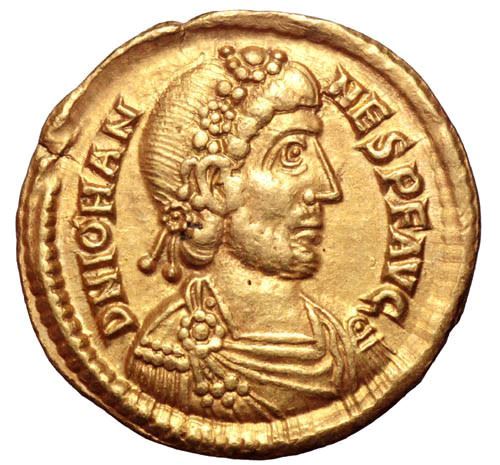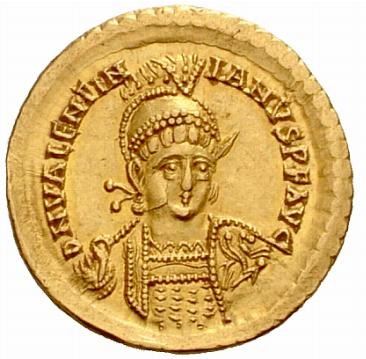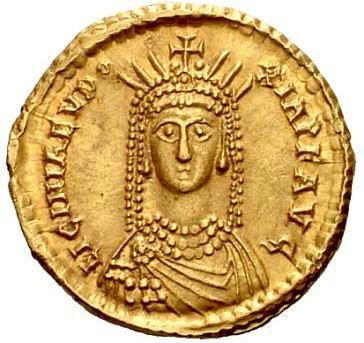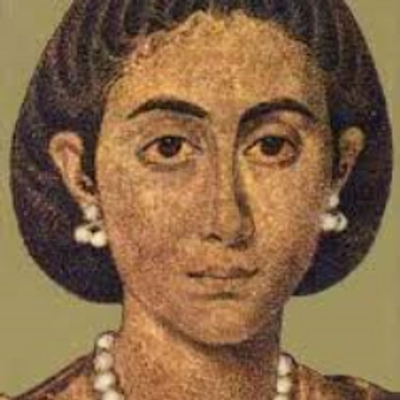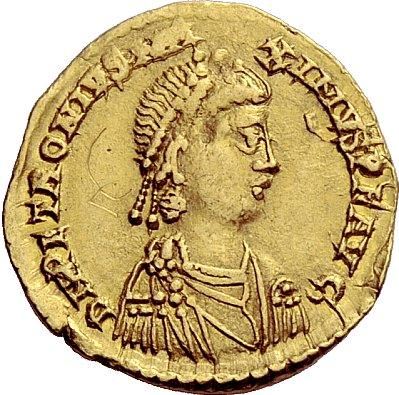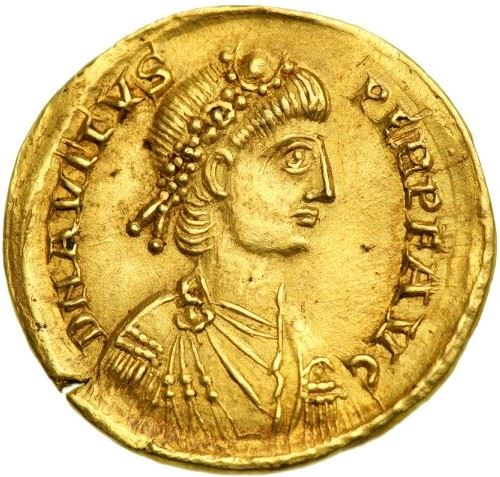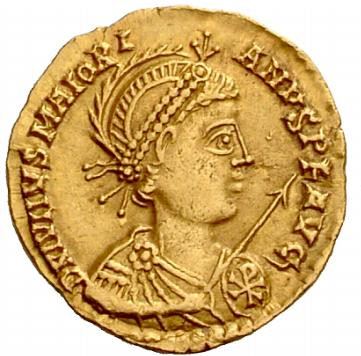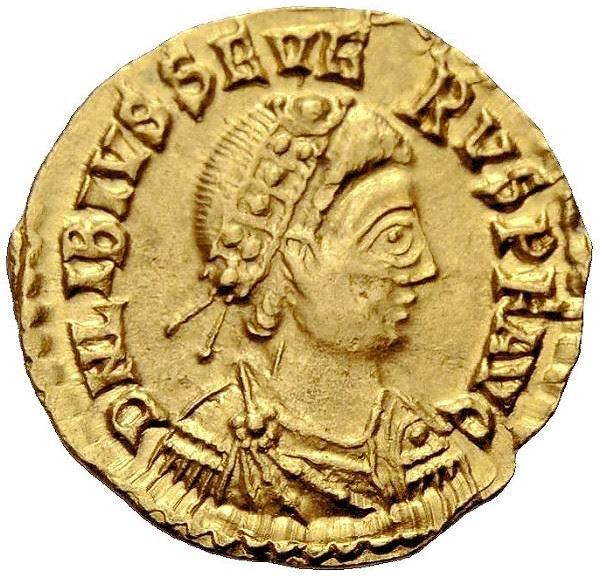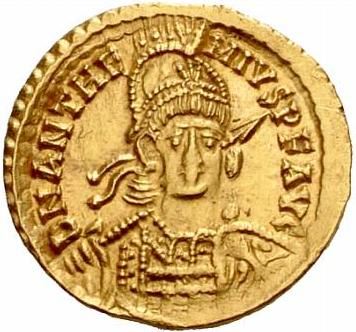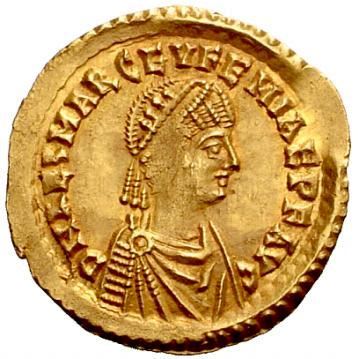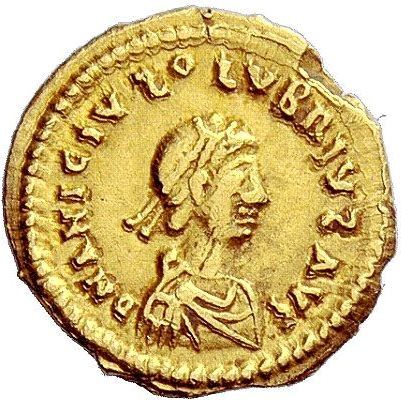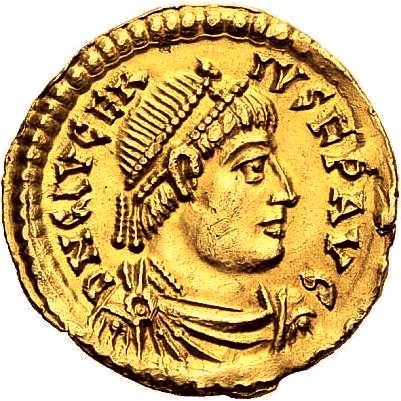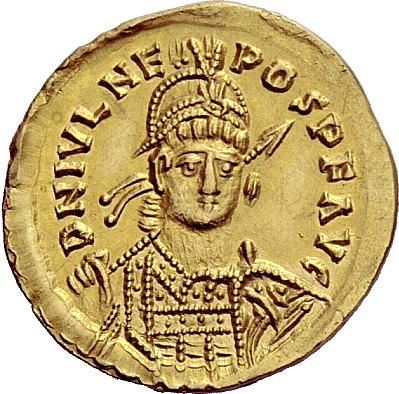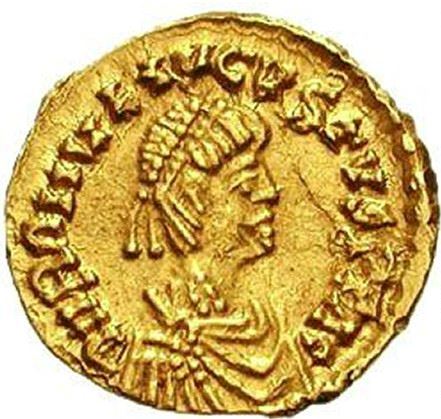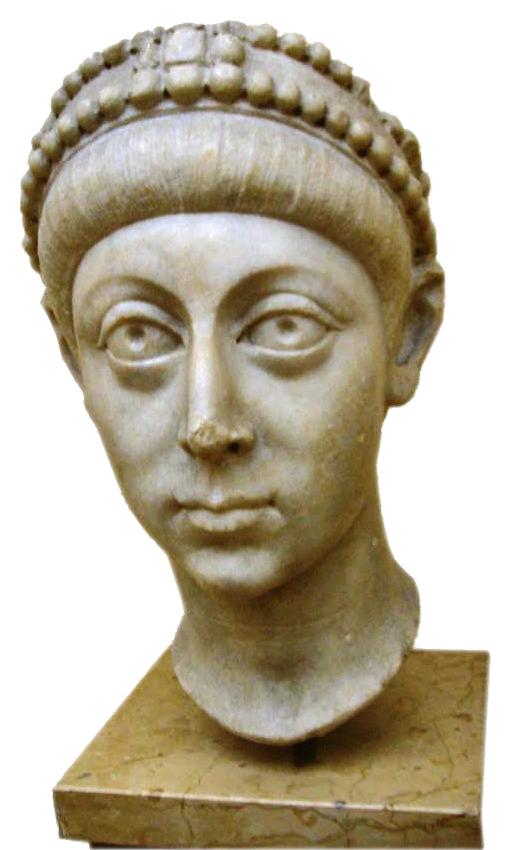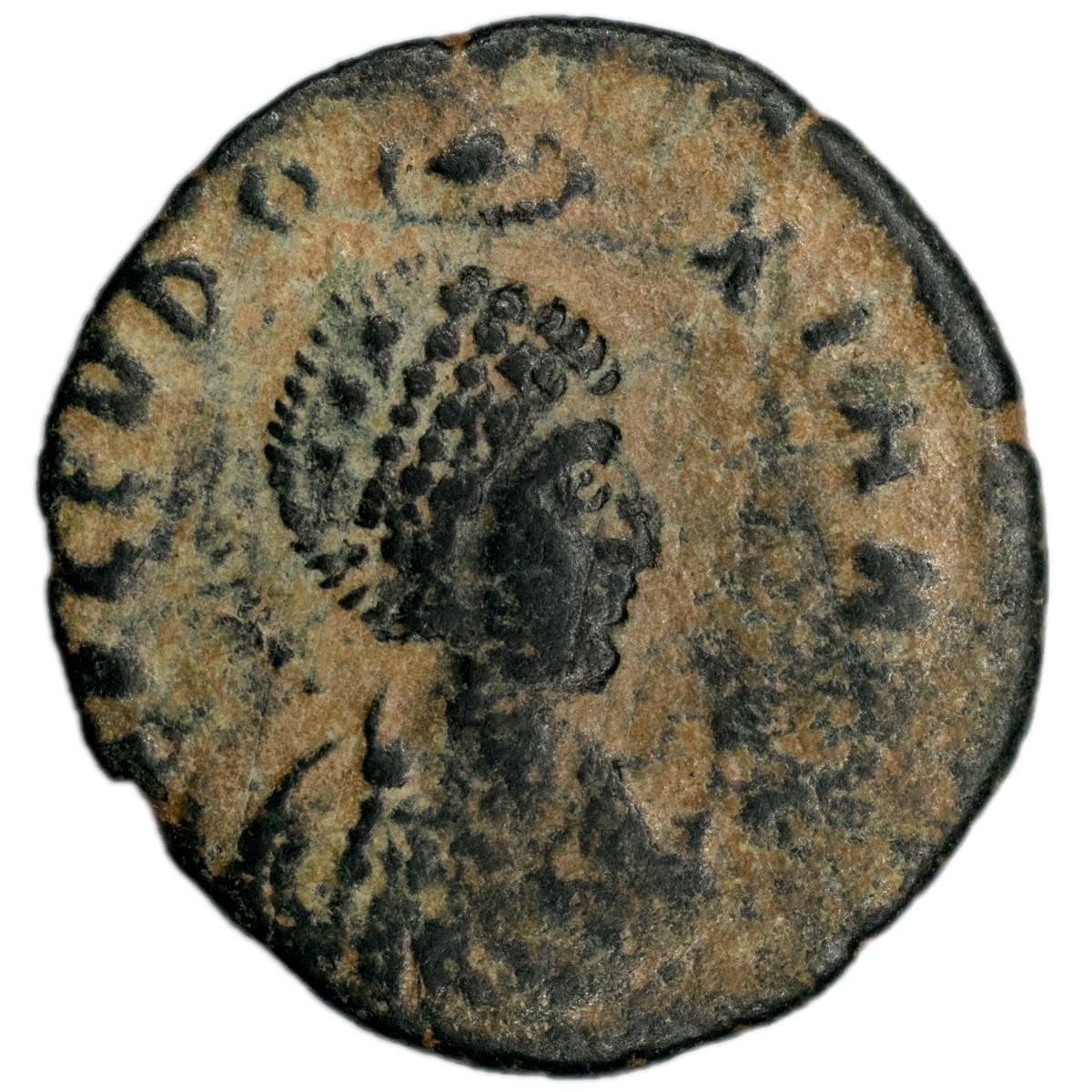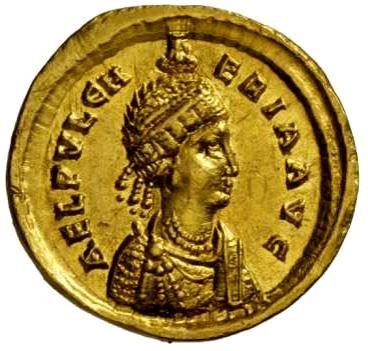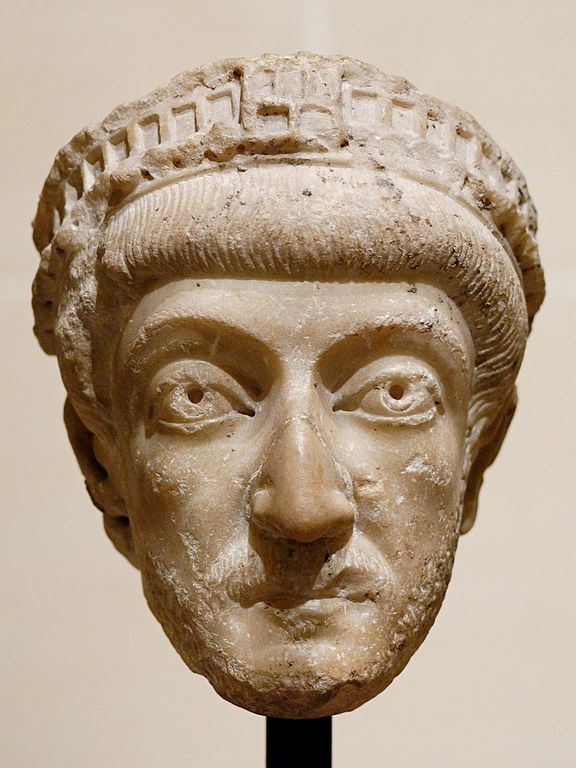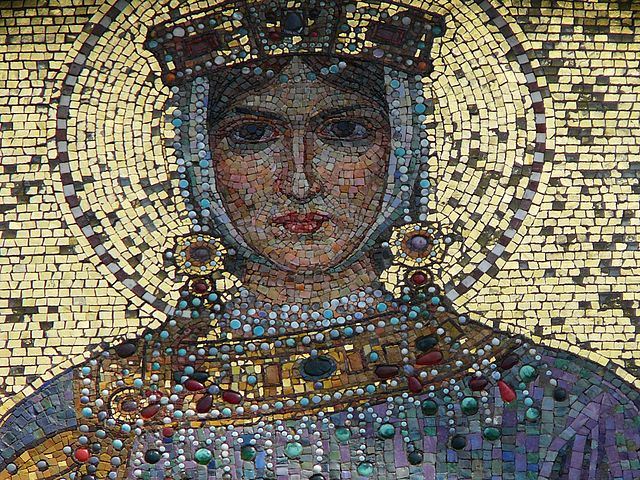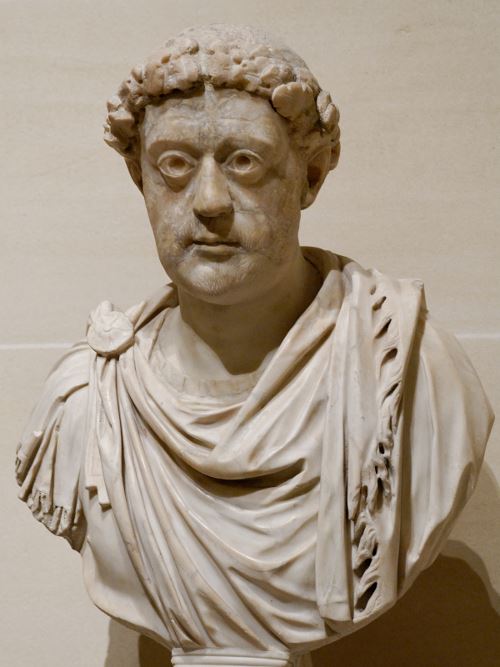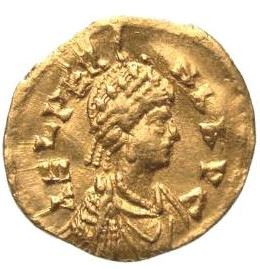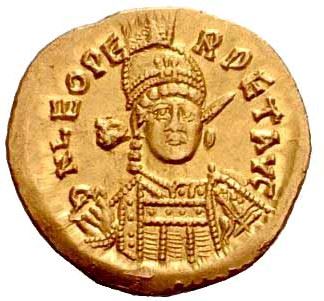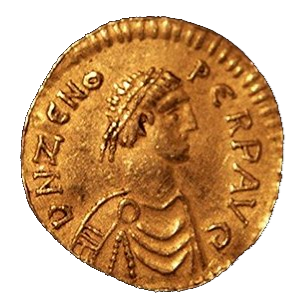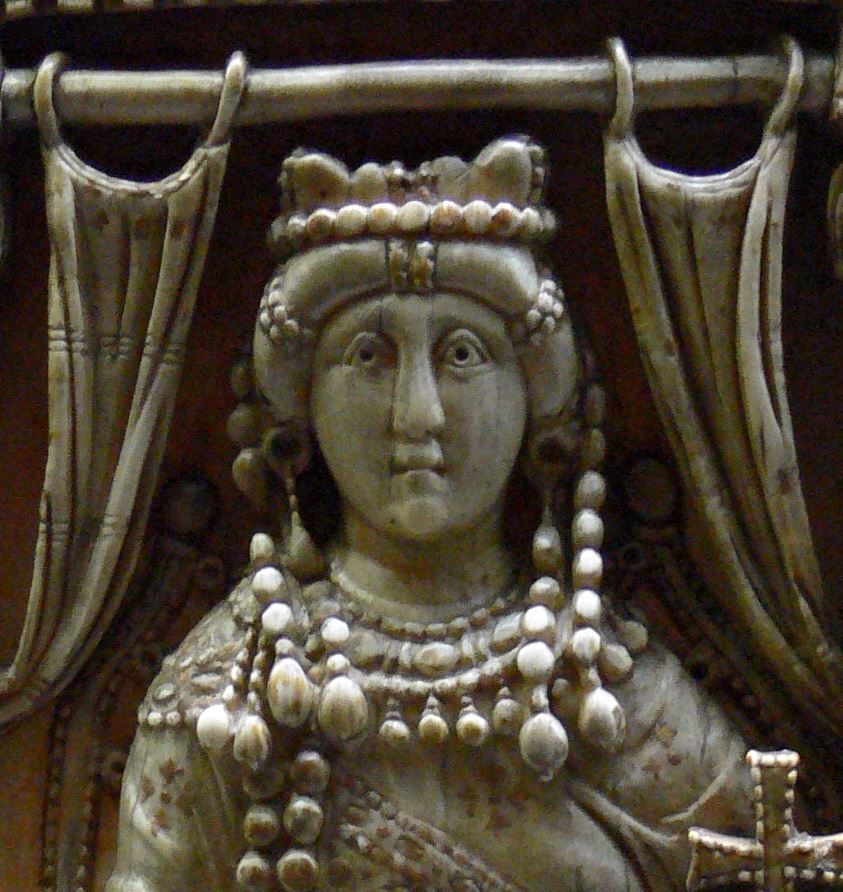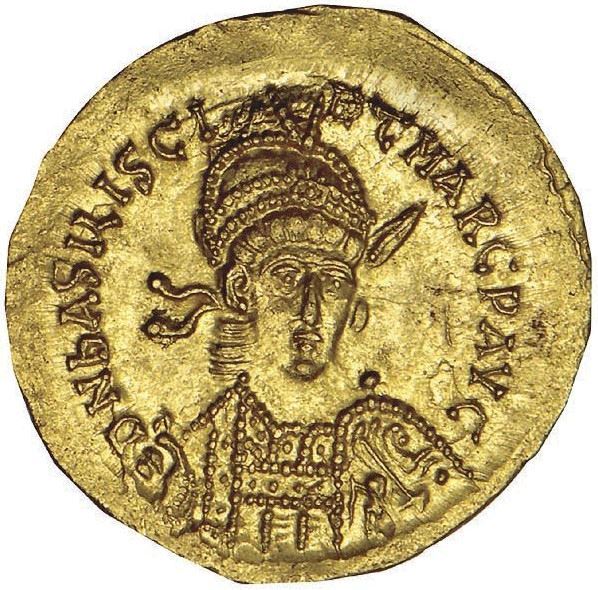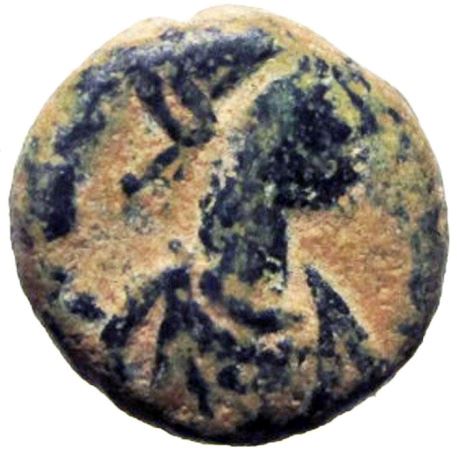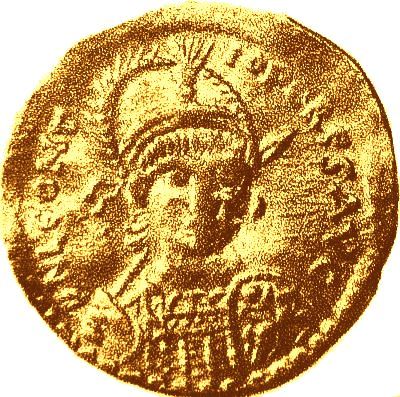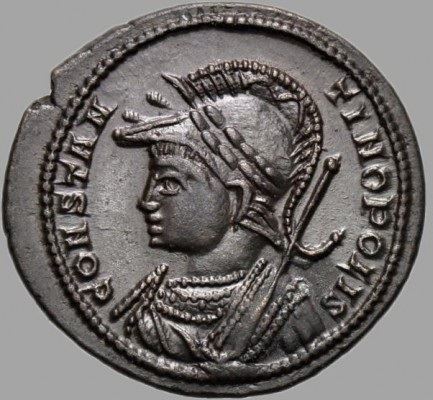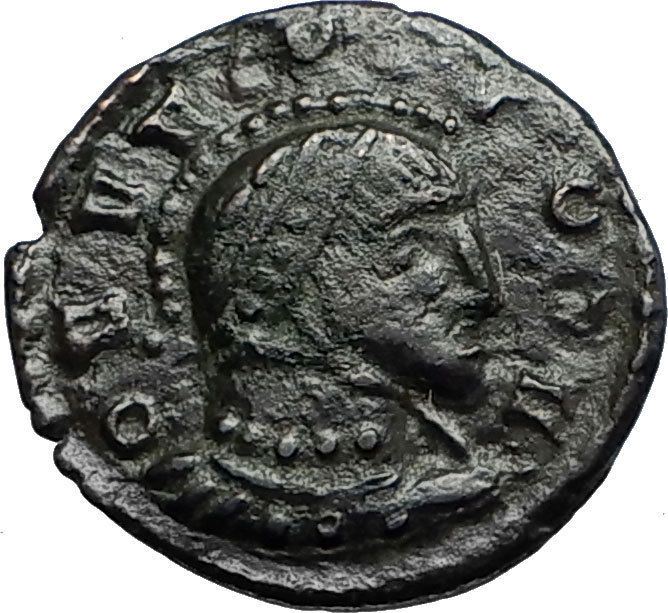Roman currency for most of Roman history consisted of gold, silver, bronze, orichalcum and copper coinage.
From its introduction to the Republic, during the third century BC, well into Imperial times, Roman currency saw many changes in form, denomination, and composition.
A persistent feature was the inflationary debasement and replacement of coins over the centuries. Notable examples of this followed the reforms of Diocletian.
The manufacture of coins in the Roman culture significantly influenced later development of coin minting in Europe.
From its introduction to the Republic, during the third century BC, well into Imperial times, Roman currency saw many changes in form, denomination, and composition.
A persistent feature was the inflationary debasement and replacement of coins over the centuries. Notable examples of this followed the reforms of Diocletian.
The manufacture of coins in the Roman culture significantly influenced later development of coin minting in Europe.
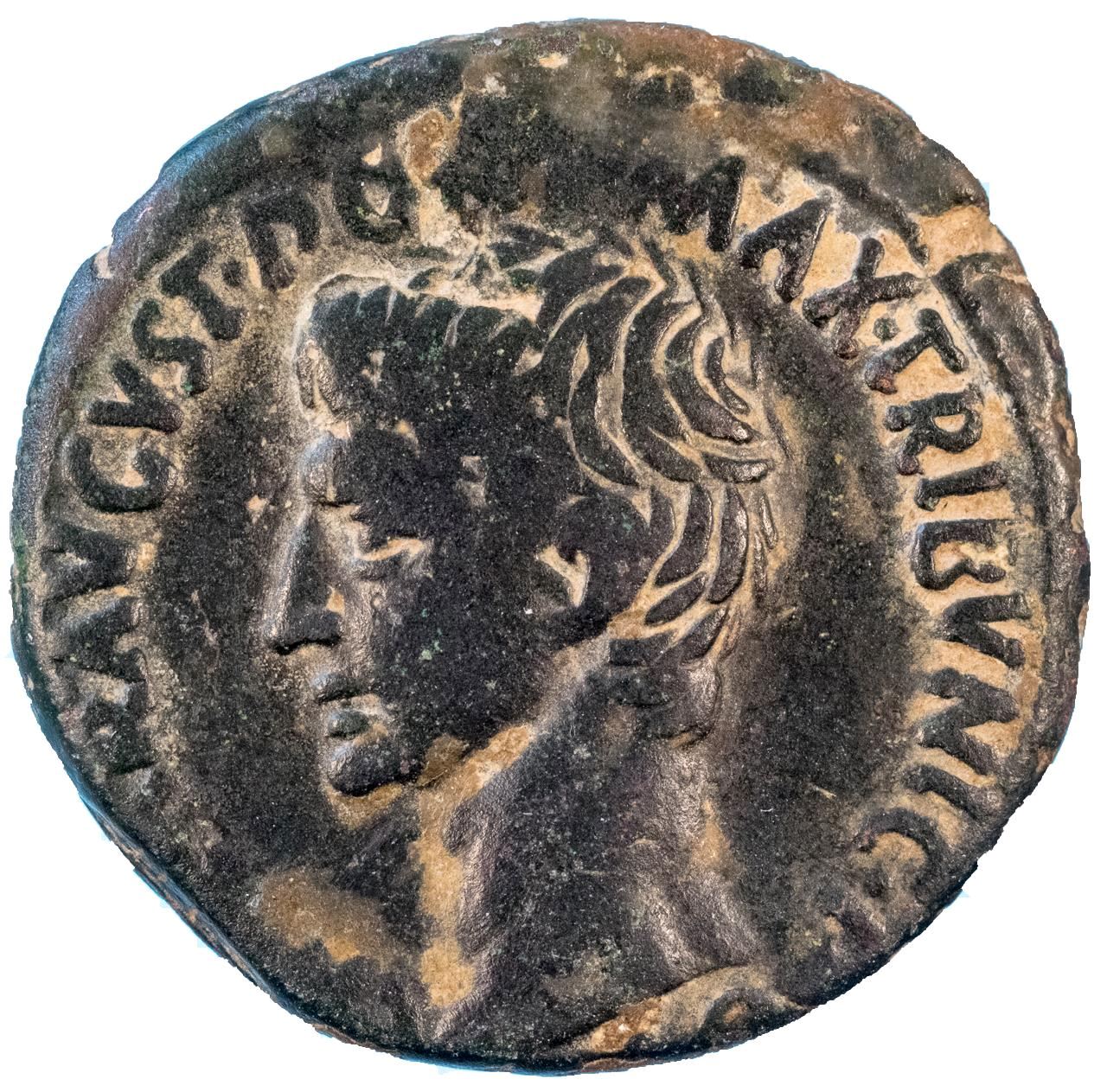
Augustus was was the founder of the Roman Principate and is considered the first Roman emperor, controlling the Roman Empire from 27 BC until his death in AD 14.
He was born Gaius Octavius, and when his maternal great-uncle Julius Caesar was assassinated in 44 BC, Octavius was named as his adopted son and heir.
Augustus restored the outward façade of the free Republic. In re...
He was born Gaius Octavius, and when his maternal great-uncle Julius Caesar was assassinated in 44 BC, Octavius was named as his adopted son and heir.
Augustus restored the outward façade of the free Republic. In re...
Livia Drusilla was the wife of the Roman emperor Augustus throughout his reign, as well as his adviser.
Livia was first married to Tiberius Claudius Nero, who fought against the Triumvirate in the civil war. She, her husband and her son - the future emperor Tiberius. Were forced to flee Rome and later Italy as the war progressed.
After peace was established Livia returned to ...
Livia was first married to Tiberius Claudius Nero, who fought against the Triumvirate in the civil war. She, her husband and her son - the future emperor Tiberius. Were forced to flee Rome and later Italy as the war progressed.
After peace was established Livia returned to ...
Marcus Vipsanius Agrippa was a Roman consul, statesman, general and architect. He was a close friend, son-in-law, and lieutenant to Augustus.
He was responsible for the construction of some of the most notable buildings in the history of Rome and for important military victories, most notably at the Battle of Actium in 31 BC against the forces of Marcus Antonius and Cleopatra VII Philop...
He was responsible for the construction of some of the most notable buildings in the history of Rome and for important military victories, most notably at the Battle of Actium in 31 BC against the forces of Marcus Antonius and Cleopatra VII Philop...
Nero Claudius Drusus Germanicus was a Roman politician and military commander. He was a patrician Claudian on his legal father's side but his maternal grandmother was from a plebeian family.
He was the son of Livia Drusilla and the legal stepson of her second husband, the Emperor Augustus. He was also brother of the Emperor Tiberius, father to both the Emperor Claudius and general Germ...
He was the son of Livia Drusilla and the legal stepson of her second husband, the Emperor Augustus. He was also brother of the Emperor Tiberius, father to both the Emperor Claudius and general Germ...
Germanicus Julius Caesar was heir-designate of the Roman Empire under Tiberius and a prominent general known for his campaigns in Germania.
He was born at Rome into a prominent branch of the patrician gens Claudia, to Nero Claudius Drusus and his wife Antonia Minor.
He became famous and beloved when he commanded eight legions against the Germans and avenged the defeat of the ...
He was born at Rome into a prominent branch of the patrician gens Claudia, to Nero Claudius Drusus and his wife Antonia Minor.
He became famous and beloved when he commanded eight legions against the Germans and avenged the defeat of the ...
Vipsania Agrippina, most commonly known as Agrippina Major was a distinguished and prominent Roman woman of the first century. She was the wife of the general and statesman Germanicus and a relative to the first Roman Emperors.
In fact, she was the second granddaughter of the Emperor Augustus, sister-in-law, stepdaughter and daughter-in-law of the Emperor Tiberius, mother of the Emperor...
In fact, she was the second granddaughter of the Emperor Augustus, sister-in-law, stepdaughter and daughter-in-law of the Emperor Tiberius, mother of the Emperor...
Tiberius Caesar Divi Augusti Filius Augustus was a Roman Emperor from 14 AD to 37 AD.
Tiberius was one of Rome's greatest generals; his conquests laid the foundations for the northern frontier. But he came to be remembered as a dark, reclusive, and sombre ruler who never really desired to be emperor; Pliny the Elder called him tristissimus hominum, "the gloomiest of men."
Aft...
Tiberius was one of Rome's greatest generals; his conquests laid the foundations for the northern frontier. But he came to be remembered as a dark, reclusive, and sombre ruler who never really desired to be emperor; Pliny the Elder called him tristissimus hominum, "the gloomiest of men."
Aft...
Drusus Julius Caesar was the son of Emperor Tiberius, and heir to the Roman Empire following the death of his adoptive brother Germanicus in AD 19.
He was born at Rome to a prominent branch of the gens Claudia, the son of Tiberius and his first wife, Vipsania Agrippina. His name at birth was Nero Claudius Drusus after his paternal uncle, Drusus I the Elder.
Drusus died sudden...
He was born at Rome to a prominent branch of the gens Claudia, the son of Tiberius and his first wife, Vipsania Agrippina. His name at birth was Nero Claudius Drusus after his paternal uncle, Drusus I the Elder.
Drusus died sudden...
Antonia Minor was the younger of two daughters of Marcus Antonius and Octavia Minor. She was a niece of the Emperor Augustus, sister-in-law of the Emperor Tiberius, paternal grandmother of the Emperor Caligula and Empress Agrippina the Younger, mother of the Emperor Claudius, and both maternal great-grandmother and paternal great-aunt of the Emperor Nero.
In 16 BC, she married the Roman...
In 16 BC, she married the Roman...
Gaius Julius Caesar Augustus Germanicus was Roman emperor from AD 37–41.
Caligula's biological father was Germanicus, and he was the great-nephew and adopted son of Emperor Tiberius. He earned the nickname "Caligula" from his father's soldiers while accompanying him during his campaigns in Germania.
He is described as a noble and moderate ruler during the first six months of...
Caligula's biological father was Germanicus, and he was the great-nephew and adopted son of Emperor Tiberius. He earned the nickname "Caligula" from his father's soldiers while accompanying him during his campaigns in Germania.
He is described as a noble and moderate ruler during the first six months of...
At various points in time during the classical era, coins which do not explicitly mention or feature a ruler, a city, or another authority were struck.
Many were struck during civil wars and other conflicts, where no clear authority had emerged victorious Others - like the coins of the mines - were meant to be used only in a particular area or within a particular context, and still oth...
Many were struck during civil wars and other conflicts, where no clear authority had emerged victorious Others - like the coins of the mines - were meant to be used only in a particular area or within a particular context, and still oth...
Tiberius Claudius Caesar Augustus Germanicus was Roman emperor from 41 to 54. Because he was afflicted with a limp and slight deafness due to sickness at a young age, his family ostracized him and excluded him from public office until his consulship, shared with his nephew Caligula in 37.
Claudius proved to be an able and efficient administrator. He was an ambitious builder, constructin...
Claudius proved to be an able and efficient administrator. He was an ambitious builder, constructin...
Tiberius Claudius Caesar Britannicus was the son of Roman emperor Claudius. For a time he was considered his father's heir, but that changed after his mother's downfall in 48, when it was revealed she had a bigamous wedding behind Claudius' back.
The next year, his father married Agrippina the Younger, Claudius' fourth and final marriage. Their marriage was followed by the adoption of A...
The next year, his father married Agrippina the Younger, Claudius' fourth and final marriage. Their marriage was followed by the adoption of A...
Julia Agrippina was a Roman Empress and one of the more prominent women in the Julio-Claudian dynasty. She was a great-granddaughter of the Emperor Augustus, great-niece and adoptive granddaughter of the Emperor Tiberius, sister of the Emperor Caligula, niece and fourth wife of the Emperor Claudius, and mother of the Emperor Nero.
Agrippina the Younger has been described by ancient sour...
Agrippina the Younger has been described by ancient sour...
Nero Claudius Caesar Augustus Germanicus was Roman emperor from 54 to 68. He was adopted by his great-uncle Claudius and became heir and successor.
Nero's mother was implicated in Claudius' death and Nero's nomination as emperor. She dominated Nero's early life and decisions until he had her murdered in 59 AD. His rule is usually associated with tyranny and extravagance, and most sourc...
Nero's mother was implicated in Claudius' death and Nero's nomination as emperor. She dominated Nero's early life and decisions until he had her murdered in 59 AD. His rule is usually associated with tyranny and extravagance, and most sourc...
Servius Sulpicius Galba Caesar Augustus was Roman Emperor for seven months from 68 to 69.
Galba's primary concern during his brief reign was restoring state finances, and to this end he undertook a number of unpopular measures, the most dangerous was his refusal to pay the praetorians the reward promised in his name; Galba scorned the notion that soldiers should be "bribed" for their lo...
Galba's primary concern during his brief reign was restoring state finances, and to this end he undertook a number of unpopular measures, the most dangerous was his refusal to pay the praetorians the reward promised in his name; Galba scorned the notion that soldiers should be "bribed" for their lo...
Lucius Clodius Macer was a legatus of the Roman Empire in Africa in the time of Nero. He revolted in May 68, cutting off the food supply of Rome.
Macer raised a legion Legio I Macriana liberatrix in addition to the Legio III Augusta that he already commanded, raising suspicion that Macer also harbored imperial ambitions, and in October 68 Galba had him killed by the procurator Trebonius...
Macer raised a legion Legio I Macriana liberatrix in addition to the Legio III Augusta that he already commanded, raising suspicion that Macer also harbored imperial ambitions, and in October 68 Galba had him killed by the procurator Trebonius...
Marcus Salvius Otho Caesar Augustus was Roman Emperor for three months, from 15 January to 16 April 69. He was the second emperor of the Year of the Four Emperors.
Otho was the governor of Lusitania, and when in 68 AD his neighbor the future Emperor Galba revolted, Otho accompanied him to Rome. Galba was childless and old, and Otho aspired to succeed him.
However, Galba named...
Otho was the governor of Lusitania, and when in 68 AD his neighbor the future Emperor Galba revolted, Otho accompanied him to Rome. Galba was childless and old, and Otho aspired to succeed him.
However, Galba named...
Aulus Vitellius Germanicus Augustus was Roman Emperor for eight months, from 16 April to 22 December AD 69.
Vitellius was proclaimed emperor following the quick succession of the previous emperors Galba and Otho, in a year of civil war known as the Year of the Four Emperors.
His claim to the throne was soon challenged by legions stationed in the eastern provinces, who proclai...
Vitellius was proclaimed emperor following the quick succession of the previous emperors Galba and Otho, in a year of civil war known as the Year of the Four Emperors.
His claim to the throne was soon challenged by legions stationed in the eastern provinces, who proclai...
Vespasian was Roman emperor from AD 69 to AD 79.
Vespasian was an accomplished general, and subjugated Judea during the Jewish rebellion of 66. While Vespasian was besieging Jerusalem, emperor Nero committed suicide and plunged Rome into a year of civil war. After Galba and Otho perished in quick succession, Vitellius became the third emperor in April 69. The Roman legions of Roman Egyp...
Vespasian was an accomplished general, and subjugated Judea during the Jewish rebellion of 66. While Vespasian was besieging Jerusalem, emperor Nero committed suicide and plunged Rome into a year of civil war. After Galba and Otho perished in quick succession, Vitellius became the third emperor in April 69. The Roman legions of Roman Egyp...
Flavia Domitilla Major was the wife of the Roman Emperor Vespasian.
She was born in Sabratha to Italian colonists who had moved there during the reign of Augustus. Her father was a humble quaestor’s clerk. Before her marriage, she was a formal mistress to an African knight.
Vespasian married her around 38 AD. She was the mother of Domitilla the Younger and of the emperors Ti...
She was born in Sabratha to Italian colonists who had moved there during the reign of Augustus. Her father was a humble quaestor’s clerk. Before her marriage, she was a formal mistress to an African knight.
Vespasian married her around 38 AD. She was the mother of Domitilla the Younger and of the emperors Ti...
Titus Flāvius Caesar Vespasiānus Augustus was Roman emperor from 79 to 81. He succeeded his father Vespasian upon his death, becoming the first Emperor to come to the throne after his own biological father.
As emperor, he is best known for completing the Colosseum and for his generosity in relieving the suffering caused by two disasters, the eruption of Mount Vesuvius in AD 79 and a fir...
As emperor, he is best known for completing the Colosseum and for his generosity in relieving the suffering caused by two disasters, the eruption of Mount Vesuvius in AD 79 and a fir...
Titus Flavius Caesar Domitianus Augustus was Roman emperor from 81 to 96.
He was the younger brother of Titus and son of Vespasian, his two predecessors on the throne, and the last member of the Flavian dynasty.
During his reign, his authoritarian rule put him at sharp odds with the senate, whose powers he drastically curtailed.
Domitian's reign came to an end in ...
He was the younger brother of Titus and son of Vespasian, his two predecessors on the throne, and the last member of the Flavian dynasty.
During his reign, his authoritarian rule put him at sharp odds with the senate, whose powers he drastically curtailed.
Domitian's reign came to an end in ...
Domitia Longina was an Empress of Rome and wife to the Roman Emperor Domitian. She was the youngest daughter of the general and consul Gnaeus Domitius Corbulo.
Domitia divorced her first husband Lucius Aelius Lamia in order to marry Domitian in 71. The marriage produced only one son, whose early death is believed to have been the cause of temporary rift between Domitia and her husband i...
Domitia divorced her first husband Lucius Aelius Lamia in order to marry Domitian in 71. The marriage produced only one son, whose early death is believed to have been the cause of temporary rift between Domitia and her husband i...
Julia Flavia was the daughter and only child to Roman Emperor Titus from his second marriage to the well-connected Marcia Furnilla.
When growing up, Titus offered her in marriage to his brother Domitian, but he refused because of his infatuation with Domitia Longina. Later she married her second paternal cousin Titus Flavius Sabinus, brother to consul Titus Flavius Clemens, who married ...
When growing up, Titus offered her in marriage to his brother Domitian, but he refused because of his infatuation with Domitia Longina. Later she married her second paternal cousin Titus Flavius Sabinus, brother to consul Titus Flavius Clemens, who married ...
Marcus Cocceius Nerva Caesar Augustus was Roman Emperor from 96 to 98.
On 18 September 96, Domitian was assassinated in a palace conspiracy involving members of the Praetorian Guard and several of his freedmen. On the same day, Nerva was declared emperor by the Roman Senate. He became Emperor at the age of sixty-five, after a lifetime of imperial service under Nero and the rulers of th...
On 18 September 96, Domitian was assassinated in a palace conspiracy involving members of the Praetorian Guard and several of his freedmen. On the same day, Nerva was declared emperor by the Roman Senate. He became Emperor at the age of sixty-five, after a lifetime of imperial service under Nero and the rulers of th...
Marcus Ulpius Trajanus was Roman emperor from 98 to 117 AD.
Trajan is remembered as a successful soldier-emperor who presided over the greatest military expansion in Roman history, leading the empire to attain its maximum territorial extent by the time of his death. He is also known for his philanthropic rule, overseeing extensive public building programs and implementing social welfare...
Trajan is remembered as a successful soldier-emperor who presided over the greatest military expansion in Roman history, leading the empire to attain its maximum territorial extent by the time of his death. He is also known for his philanthropic rule, overseeing extensive public building programs and implementing social welfare...
Pompeia Plotina Claudia Phoebe Piso was a Roman Empress and the wife of Roman Emperor Trajan.
In 100, Trajan awarded her with title of Augusta, but she did not accept the title until 105. She did not appear on coinage until 112. Plotina was the matchmaker between Hadrian and his future wife Vibia Sabina.
Plotina was renowned for her interest in philosophy, and her virtue, dig...
In 100, Trajan awarded her with title of Augusta, but she did not accept the title until 105. She did not appear on coinage until 112. Plotina was the matchmaker between Hadrian and his future wife Vibia Sabina.
Plotina was renowned for her interest in philosophy, and her virtue, dig...
Ulpia Marciana was the beloved elder sister of Roman Emperor Trajan.
After 105, her brother awarded her with the title of Augusta. She was the first sister of a Roman Emperor to receive this title. Marciana did not accept this at first, but her sister-in-law, the Empress Pompeia Plotina, insisted that she take the title.
Marciana would often travel with her brother and assis...
After 105, her brother awarded her with the title of Augusta. She was the first sister of a Roman Emperor to receive this title. Marciana did not accept this at first, but her sister-in-law, the Empress Pompeia Plotina, insisted that she take the title.
Marciana would often travel with her brother and assis...
Salonia Matidia was the daughter and only child of Ulpia Marciana and wealthy praetor Gaius Salonius Matidius Patruinus.
Her maternal uncle was the Roman emperor Trajan who had no children and treated her like his daughter. She often traveled with her uncle and assisted him with decision-making. On August 29, 112, she received the title of Augusta upon the death and divinization of Marc...
Her maternal uncle was the Roman emperor Trajan who had no children and treated her like his daughter. She often traveled with her uncle and assisted him with decision-making. On August 29, 112, she received the title of Augusta upon the death and divinization of Marc...
Publius Aelius Hadrianus Augustus was Roman emperor from 117 to 138. His predecessor, Trajan, was a maternal cousin of Hadrian's father.
Trajan did not designate an heir officially, but according to his wife Pompeia Plotina, he named Hadrian emperor immediately before his death.
Hadrian is regarded as the third of the Five Good Emperors, and is known for constructing Hadrian'...
Trajan did not designate an heir officially, but according to his wife Pompeia Plotina, he named Hadrian emperor immediately before his death.
Hadrian is regarded as the third of the Five Good Emperors, and is known for constructing Hadrian'...
Vibia Sabina was a Roman Empress, wife and second cousin, once removed, to Roman Emperor Hadrian. In 128, she was awarded the title of Augusta.
She married Hadrian in 100. She is rumored to have had an affair with Suetonius, a historian who was also Hadrian's secretary, in the year 119, which resulted in his dismissal as the Emperor's secretary.
Meanwhile, her husband was tho...
She married Hadrian in 100. She is rumored to have had an affair with Suetonius, a historian who was also Hadrian's secretary, in the year 119, which resulted in his dismissal as the Emperor's secretary.
Meanwhile, her husband was tho...
Lucius Aelius Caesar was briefly Caesar and heir to the emperor Hadrian, and the father of Emperor Lucius Verus.
Although Lucius had no military experience, he had served as a senator, and had powerful political connections; however, he was in poor health. In 136 he was adopted by Hadrian and named heir to the throne - much to the surprise of everyone.
To strengthen his posi...
Although Lucius had no military experience, he had served as a senator, and had powerful political connections; however, he was in poor health. In 136 he was adopted by Hadrian and named heir to the throne - much to the surprise of everyone.
To strengthen his posi...
Titus Aelius Hadrianus Antoninus Augustus Pius was Roman Emperor from 138 to 161. He was one of the Five Good Emperors in the Nerva–Antonine dynasty and the Aurelii.
He acquired the name Pius after his accession to the throne, either because he compelled the Senate to deify his adoptive father Hadrian, or because he had saved senators sentenced to death by Hadrian in his later years. <...
He acquired the name Pius after his accession to the throne, either because he compelled the Senate to deify his adoptive father Hadrian, or because he had saved senators sentenced to death by Hadrian in his later years. <...
Annia Galeria Faustina was a Roman empress and wife of the Roman emperor Antoninus Pius.
As a private citizen, she married Antoninus Pius between 110 and 115, and Faustina and Antoninus had a very happy marriage. Faustina bore Antoninus four children, two sons and two daughters. After Antoninus Pius' accession to the principate, the couple never left Italy.
Faustina's persona...
As a private citizen, she married Antoninus Pius between 110 and 115, and Faustina and Antoninus had a very happy marriage. Faustina bore Antoninus four children, two sons and two daughters. After Antoninus Pius' accession to the principate, the couple never left Italy.
Faustina's persona...
Marcus Aurelius Antoninus Augustus was Emperor of Rome from 161 to 180. He ruled with Lucius Verus as co-emperor from 161 until Verus' death in 169.
Marcus Aurelius was the last of the so-called Five Good Emperors. He was a practitioner of Stoicism, and his untitled writing, commonly known as Meditations, is a significant source of the modern understanding of ancient Stoic philosophy. ...
Marcus Aurelius was the last of the so-called Five Good Emperors. He was a practitioner of Stoicism, and his untitled writing, commonly known as Meditations, is a significant source of the modern understanding of ancient Stoic philosophy. ...
Annia Galeria Faustina Minor was a daughter of Roman Emperor Antoninus Pius and Roman Empress Faustina the Elder. She was a Roman Empress and wife to her maternal cousin Roman Emperor Marcus Aurelius.
Not much has survived about her life, but the Augustan History mentions adultery with sailors, gladiators, and men of rank; however, Faustina and Aurelius seem to have been very close and...
Not much has survived about her life, but the Augustan History mentions adultery with sailors, gladiators, and men of rank; however, Faustina and Aurelius seem to have been very close and...
Lucius Aurelius Verus Augustus was the co-emperor of Rome with his adoptive brother Marcus Aurelius from 161 until his own death in 169.
Lucius Verus was the first-born son to Avidia Plautia and Lucius Aelius Caesar, the first adopted son and heir of Roman Emperor Hadrian.
When his father died in early 138, Hadrian chose Antoninus Pius as his successor, on the condition that ...
Lucius Verus was the first-born son to Avidia Plautia and Lucius Aelius Caesar, the first adopted son and heir of Roman Emperor Hadrian.
When his father died in early 138, Hadrian chose Antoninus Pius as his successor, on the condition that ...
Annia Aurelia Galeria Lucilla was the daughter of Roman Emperor Marcus Aurelius and Roman Empress Faustina the Younger and an elder sister to future Roman Emperor Commodus.
In 161 Lucilla's father arranged a marriage for her with his co-ruler Lucius Verus. Verus, 18 years her senior, became her husband three years later in Ephesus in 164, and she received the title of Augusta and becam...
In 161 Lucilla's father arranged a marriage for her with his co-ruler Lucius Verus. Verus, 18 years her senior, became her husband three years later in Ephesus in 164, and she received the title of Augusta and becam...
Lucius Aelius Aurelius Commodus ruled as co-emperor with his father Marcus Aurelius from 177 to 180, and as sole emperor from 180 to 192.
Although he considered his twelve-year-reign a new “golden age,” his lack of concern for political matters, life of leisure, and extreme paranoia brought about a reign of terror.
Commodus was extremely proud of his physical prowess. He tho...
Although he considered his twelve-year-reign a new “golden age,” his lack of concern for political matters, life of leisure, and extreme paranoia brought about a reign of terror.
Commodus was extremely proud of his physical prowess. He tho...
Bruttia Crispina was Roman Empress from 178 to 191 as the consort of Roman Emperor Commodus.
As Augusta, Crispina was extensively honoured with public images during the last two years of her father-in-law's reign and the initial years of her husband's reign.
She did not seem to have any significant political influence over her husband during his bizarre reign.
Afte...
As Augusta, Crispina was extensively honoured with public images during the last two years of her father-in-law's reign and the initial years of her husband's reign.
She did not seem to have any significant political influence over her husband during his bizarre reign.
Afte...
Publius Helvius Pertinax Augustus was Roman Emperor for the first three months of 193.
As the successor to the assassinated Commodus, he was the first to serve as emperor during the tumultuous Year of the Five Emperors.
He attempted to institute several reform measures, and one of those reforms - the restoration of discipline among the Praetorian Guards - led to conflict that...
As the successor to the assassinated Commodus, he was the first to serve as emperor during the tumultuous Year of the Five Emperors.
He attempted to institute several reform measures, and one of those reforms - the restoration of discipline among the Praetorian Guards - led to conflict that...
Marcus Didius Severus Julianus Augustus was Roman emperor for nine weeks during the year 193.
Julianus ascended the throne after buying it from the Praetorian Guard, who had assassinated his predecessor Pertinax. The population would not stand for this travesty, and this discontent lead to civil war between 193 and 197.
Within weeks of buying the throne, the general Septimius...
Julianus ascended the throne after buying it from the Praetorian Guard, who had assassinated his predecessor Pertinax. The population would not stand for this travesty, and this discontent lead to civil war between 193 and 197.
Within weeks of buying the throne, the general Septimius...
Manlia Scantilla was briefly Roman Empress as wife to the Roman Emperor Didius Julianus.
Manlia Scantilla married the general Didius Julianus before his succession. Around 153, she bore Julianus a daughter and only child Didia Clara, who was known for her beauty.
Her husband became emperor on 28 March 193. On that day, Scantilla and her daughter were awarded the title of Augu...
Manlia Scantilla married the general Didius Julianus before his succession. Around 153, she bore Julianus a daughter and only child Didia Clara, who was known for her beauty.
Her husband became emperor on 28 March 193. On that day, Scantilla and her daughter were awarded the title of Augu...
Didia Clara was the daughter and only child to the Roman Emperor Didius Julianus and Empress Manlia Scantilla.
Didia Clara was reputedly one of the most beautiful women in Rome, but virtually nothing is known about her life or her personality. In her younger years, she was betrothed to a paternal cousin; but in 193 she married Sextus Cornelius Repentinus, who served as prefect of Rome d...
Didia Clara was reputedly one of the most beautiful women in Rome, but virtually nothing is known about her life or her personality. In her younger years, she was betrothed to a paternal cousin; but in 193 she married Sextus Cornelius Repentinus, who served as prefect of Rome d...
Gaius Pescennius Niger Augustus was Roman Emperor from 193 to 194 during the Year of the Five Emperors.
Commodus made Niger imperial legate of Syria in 191, and he was still serving in Syria when news of Pertinax' murder broke. Niger was proclaimed Emperor by the eastern legions by the end of April 193. He took the additional cognomen Justus, or "the Just".
In the ensuing ci...
Commodus made Niger imperial legate of Syria in 191, and he was still serving in Syria when news of Pertinax' murder broke. Niger was proclaimed Emperor by the eastern legions by the end of April 193. He took the additional cognomen Justus, or "the Just".
In the ensuing ci...
Decimus Clodius Septimius Albinus Augustus was a Roman usurper.
After Pertinax was assassinated in 193, the imperial throne was sold to Didius Julianus. Immediately afterwards, Pescennius Niger was proclaimed Emperor by the legions in Syria; Septimius Severus by the troops in Illyricum and Pannonia, and Albinus by the armies in Britain and Gaul.
In the civil war that followed...
After Pertinax was assassinated in 193, the imperial throne was sold to Didius Julianus. Immediately afterwards, Pescennius Niger was proclaimed Emperor by the legions in Syria; Septimius Severus by the troops in Illyricum and Pannonia, and Albinus by the armies in Britain and Gaul.
In the civil war that followed...
Lucius Septimius Severus Augustus was Roman emperor from 193 to 211. He was born in Leptis Magna in the Roman province of Africa, and advanced through the cursus honorum under the reigns of Marcus Aurelius and Commodus.
Severus seized power after the death of Emperor Pertinax in 193 during the Year of the Five Emperors. After deposing and killing the incumbent emperor Didius Julianus, S...
Severus seized power after the death of Emperor Pertinax in 193 during the Year of the Five Emperors. After deposing and killing the incumbent emperor Didius Julianus, S...
Iulia Domna was Empress consort of the Roman Empire, being wife to the Roman Emperor Lucius Septimius Severus and mother of Emperors Geta and Caracalla.
Julia was famous for her prodigious learning as well as her extraordinary political influence, and is remembered for being a patron of the arts, music, and philosophy, using her title and influence to spread the previously persecuted Ph...
Julia was famous for her prodigious learning as well as her extraordinary political influence, and is remembered for being a patron of the arts, music, and philosophy, using her title and influence to spread the previously persecuted Ph...
Marcus Aurelius Severus Antoninus Augustus, was Roman emperor from AD 198 to 217.
He was the eldest son of Septimius Severus and Julia Domna, and reigned jointly with his father from 198 until Severus' death in 211. Caracalla then ruled jointly with his younger brother Geta, until he had Geta murdered later that year.
Caracalla's reign was marked by domestic instability and e...
He was the eldest son of Septimius Severus and Julia Domna, and reigned jointly with his father from 198 until Severus' death in 211. Caracalla then ruled jointly with his younger brother Geta, until he had Geta murdered later that year.
Caracalla's reign was marked by domestic instability and e...
Publia Fulvia Plautilla was the only wife of the Roman emperor Caracalla, who was her paternal second cousin. This was a politically arranged marriage, meant to strengthen the position of Plautilla's father, the Praetorian Prefect Gaius Fulvius Plautianus.
Plautilla and Caracalla had a very unhappy marriage. At first, they barely tolerated each other but later, they would not even be se...
Plautilla and Caracalla had a very unhappy marriage. At first, they barely tolerated each other but later, they would not even be se...
Geta was Roman emperor alongside his father Septimius Severus and his older brother Caracalla from 209, and until 211 when he was murdered by Caracalla.
Following Geta's assassination, Caracalla ordered his brother's name to be removed from all inscriptions. The now sole emperor also took the opportunity to get rid of his political enemies, on grounds of conspiracy. Cassius Dio stated ...
Following Geta's assassination, Caracalla ordered his brother's name to be removed from all inscriptions. The now sole emperor also took the opportunity to get rid of his political enemies, on grounds of conspiracy. Cassius Dio stated ...
Marcus Opellius Severus Macrinus Augustus was Roman Emperor from April 217 to 8 June 218.
He was appointed Praetorian Prefect by Caracalla, after having served for decades as a skilled lawyer and bureaucrat. When it was prophesied that he would depose and succeed the emperor, Macrinus - fearing for his safety - resolved to have Caracalla murdered before he was condemned.
In t...
He was appointed Praetorian Prefect by Caracalla, after having served for decades as a skilled lawyer and bureaucrat. When it was prophesied that he would depose and succeed the emperor, Macrinus - fearing for his safety - resolved to have Caracalla murdered before he was condemned.
In t...
Marcus Opellius Antoninus Diadumenianus Augustus was the son of the Roman Emperor Macrinus, and served his father briefly as Caesar (May 217–218) and as Augustus (in 218).
The name stems from him being born with a caul that formed a 'diadem'.
Diadumenian had little time to enjoy his position or to learn anything from its opportunities because the legions of Syria revolted and...
The name stems from him being born with a caul that formed a 'diadem'.
Diadumenian had little time to enjoy his position or to learn anything from its opportunities because the legions of Syria revolted and...
Elagabalus was Roman emperor from 218 to 222. A member of the Severan dynasty, he was the second son of Julia Soaemias and Sextus Varius Marcellus. He was called Elagabalus only after his death.
Elagabalus showed a disregard for Roman religious traditions and sexual taboos. He replaced the traditional head of the Roman pantheon, Jupiter, with the deity Elagabalus, of whom he had been hi...
Elagabalus showed a disregard for Roman religious traditions and sexual taboos. He replaced the traditional head of the Roman pantheon, Jupiter, with the deity Elagabalus, of whom he had been hi...
Julia Maesa was a Roman citizen and daughter of Gaius Julius Bassianus, priest of the sun god Heliogabalus, the patron god of Emesa (modern Homs) in the Roman province of Syria.
As the grandmother of both the Roman emperors Elagabalus and Alexander Severus, she figured prominently in the ascension of each to the title at the age of fourteen. She was also the maternal aunt of the empero...
As the grandmother of both the Roman emperors Elagabalus and Alexander Severus, she figured prominently in the ascension of each to the title at the age of fourteen. She was also the maternal aunt of the empero...
Julia Soaemias Bassiana was a Syrian noblewoman and the mother of Roman emperor Elagabalus.
In 217, her cousin the Roman emperor Caracalla was killed and Macrinus ascended to the imperial throne. Together with her mother, Julia plotted to replace Macrinus with her second son, Bassianus. To legitimise this plot, they spread the rumour that the thirteen-year-old boy was Caracalla's illegi...
In 217, her cousin the Roman emperor Caracalla was killed and Macrinus ascended to the imperial throne. Together with her mother, Julia plotted to replace Macrinus with her second son, Bassianus. To legitimise this plot, they spread the rumour that the thirteen-year-old boy was Caracalla's illegi...
Julia Cornelia Paula was Empress of Rome from 219-220.
In early 219, Julia Maesa, eldest sister of Roman Empress Julia Domna, arranged for Cornelia Paula to marry her grandson, the new emperor Elagabalus. Their wedding was lavishly celebrated in Rome. Cornelia Paula became Elagabalus' first wife and was given the honorific title of Augusta and the family name "Julia".
In late...
In early 219, Julia Maesa, eldest sister of Roman Empress Julia Domna, arranged for Cornelia Paula to marry her grandson, the new emperor Elagabalus. Their wedding was lavishly celebrated in Rome. Cornelia Paula became Elagabalus' first wife and was given the honorific title of Augusta and the family name "Julia".
In late...
Iulia Aquilia Severa was the second and fourth wife of Emperor Elagabalus.
Severa was a Vestal Virgin and, as such, her marriage to Elagabalus in late 220 was the cause of enormous controversy — traditionally, the punishment for breaking the thirty-year vow of celibacy was death by being buried alive.
Both marriages were quickly revoked, probably on the urging of Julia Maesa....
Severa was a Vestal Virgin and, as such, her marriage to Elagabalus in late 220 was the cause of enormous controversy — traditionally, the punishment for breaking the thirty-year vow of celibacy was death by being buried alive.
Both marriages were quickly revoked, probably on the urging of Julia Maesa....
Annia Aurelia Faustina was an Anatolian Roman noblewoman. She was briefly married to the Roman emperor Elagabalus in 221 and thus a Roman empress. She was Elagabalus' third wife.
The reason for their marriage is believed to be her ties to the Nerva-Antonine dynasty. Elagabalus gave her the title of Augusta. In the end of 221, Elagabalus divorced her and returned to Julia Aquilia Severa,...
The reason for their marriage is believed to be her ties to the Nerva-Antonine dynasty. Elagabalus gave her the title of Augusta. In the end of 221, Elagabalus divorced her and returned to Julia Aquilia Severa,...
Marcus Aurelius Severus Alexander Augustus was Roman Emperor from 222 to 235 and the last emperor of the Severan dynasty.
As emperor, Alexander's peace time reign was prosperous. However, Rome was militarily confronted with the rising Sassanid Empire and growing incursions from the tribes of Germania.
He succeeded his cousin Elagabalus in 222, and was ultimately assassinated h...
As emperor, Alexander's peace time reign was prosperous. However, Rome was militarily confronted with the rising Sassanid Empire and growing incursions from the tribes of Germania.
He succeeded his cousin Elagabalus in 222, and was ultimately assassinated h...
Julia Avita Mamaea was a Roman regent.
When Elagabalus and his mother Julia Soaemias proved incompetent rulers, imperial favor fell on Alexander, Julia's son. He became emperor in 222, following Elagabalus' murder by the Praetorian Guard.
Julia and her mother became regents in the name of Alexander, then 14 years old. He never managed to escape her maternal domination, but a...
When Elagabalus and his mother Julia Soaemias proved incompetent rulers, imperial favor fell on Alexander, Julia's son. He became emperor in 222, following Elagabalus' murder by the Praetorian Guard.
Julia and her mother became regents in the name of Alexander, then 14 years old. He never managed to escape her maternal domination, but a...
Seia Herennia Sallustia Barbia Orbiana Augusta was an Empress of the Roman Empire and briefly the wife of Emperor Severus Alexander. She was known for her beauty, which was captured in multiple works of art.
In August 225, at about the age of 16 years, she wed Roman Emperor Severus Alexander in an arrangement organized by the emperor's mother, Julia Mamaea.
After Orbiana wa...
In August 225, at about the age of 16 years, she wed Roman Emperor Severus Alexander in an arrangement organized by the emperor's mother, Julia Mamaea.
After Orbiana wa...
Gaius Julius Verus Maximinus Augustus, also known as Maximinus Thrax, was Roman Emperor from 235 to 238.
He rose to power when his legion - Legio IV 'Italica' - killed Emperor Alexander Severus and his mother in 235 and elected the stern general emperor.
Maximinus was a provincial of low birth, and was seen by the Senate as a barbarian, not even a true Roman, despite Caracall...
He rose to power when his legion - Legio IV 'Italica' - killed Emperor Alexander Severus and his mother in 235 and elected the stern general emperor.
Maximinus was a provincial of low birth, and was seen by the Senate as a barbarian, not even a true Roman, despite Caracall...
Caecilia Paulina was a Roman Empress and consort to Emperor Maximinus Thrax, who ruled in 235–238.
Almost nothing is known about her life, as ancient writers rarely mentioned her by name. Her husband never set foot in Rome, thus it is likely that neither did she, at least in her time married to the Emperor.
Paulina had one son, Gaius Julius Verus Maximus, appointed Caesar in ...
Almost nothing is known about her life, as ancient writers rarely mentioned her by name. Her husband never set foot in Rome, thus it is likely that neither did she, at least in her time married to the Emperor.
Paulina had one son, Gaius Julius Verus Maximus, appointed Caesar in ...
Gaius Julius Verus Maximus was the son of the Roman Emperor Maximinus Thrax and his wife, Caecilia Paulina.
Maximinus appointed his son Maximus caesar around 236, but he held little real power. Both were murdered by the Praetorian Guard in May 238, during the Siege of Aquileia in the Year of the Six Emperors.
In contrast to almost all other 3rd century rulers, Maximus is more...
Maximinus appointed his son Maximus caesar around 236, but he held little real power. Both were murdered by the Praetorian Guard in May 238, during the Siege of Aquileia in the Year of the Six Emperors.
In contrast to almost all other 3rd century rulers, Maximus is more...
Marcus Antonius Gordianus Sempronianus Romanus Africanus was Roman Emperor for one month with his son Gordian II in 238, the Year of the Six Emperors.
During the reign of Alexander Severus, Gordian became governor of the province of Africa Proconsularis. When Maximinus Thrax killed Alexander Severus and assumed the throne, a tax revolt broke out in Africa - and Gordian was forced to ass...
During the reign of Alexander Severus, Gordian became governor of the province of Africa Proconsularis. When Maximinus Thrax killed Alexander Severus and assumed the throne, a tax revolt broke out in Africa - and Gordian was forced to ass...
Marcus Antonius Gordianus Sempronianus Romanus Africanus Augustus was Roman Emperor for one month with his father Gordian I in 238, the Year of the Six Emperors.
During the reign of Alexander Severus, Gordian's father became governor of the province of Africa Proconsularis. When Maximinus Thrax killed Alexander Severus and assumed the throne, a tax revolt broke out in Africa - and the G...
During the reign of Alexander Severus, Gordian's father became governor of the province of Africa Proconsularis. When Maximinus Thrax killed Alexander Severus and assumed the throne, a tax revolt broke out in Africa - and the G...
Decimus Caelius Calvinus Balbinus Pius Augustus was Roman Emperor with Pupienus for three months in 238, the Year of the Six Emperors.
Not much is known about Balbinus before his elevation to emperor. When the Gordians were proclaimed Emperors in Africa, the Senate appointed a committee of twenty men, including Balbinus, to co-ordinate operations against Maximinus Thrax. On the news of ...
Not much is known about Balbinus before his elevation to emperor. When the Gordians were proclaimed Emperors in Africa, the Senate appointed a committee of twenty men, including Balbinus, to co-ordinate operations against Maximinus Thrax. On the news of ...
Marcus Clodius Pupienus Maximus Augustus was Roman Emperor with Balbinus for three months in 238, during the Year of the Six Emperors.
When the Gordians were proclaimed Emperors in Africa, the Senate appointed a committee of twenty men to co-ordinate operations against Maximinus until the arrival of the Gordians. On the news of the Gordians' defeat and deaths, the Senate voted for two m...
When the Gordians were proclaimed Emperors in Africa, the Senate appointed a committee of twenty men to co-ordinate operations against Maximinus until the arrival of the Gordians. On the news of the Gordians' defeat and deaths, the Senate voted for two m...
Marcus Antonius Gordianus Pius Augustus was Roman Emperor from 238 AD to 244 AD.
At the age of 13, he became the youngest sole legal Roman emperor throughout the existence of the united Roman Empire. Due to Gordian's age the imperial government was surrendered to the Senate.
In 241, Gordian was married to Furia Sabinia Tranquillina, daughter of the newly appointed praetorian...
At the age of 13, he became the youngest sole legal Roman emperor throughout the existence of the united Roman Empire. Due to Gordian's age the imperial government was surrendered to the Senate.
In 241, Gordian was married to Furia Sabinia Tranquillina, daughter of the newly appointed praetorian...
Furia Sabinia Tranquillina was the Empress of Rome and wife of Emperor Gordian III.
In 241 her father was appointed the head of the Praetorian Guard by the Roman Emperor Gordian III. In May that year, Tranquillina had married Gordian.
She became a Roman Empress and received the honorific title of Augusta. Her marriage to Gordian was an admission by the young emperor of both...
In 241 her father was appointed the head of the Praetorian Guard by the Roman Emperor Gordian III. In May that year, Tranquillina had married Gordian.
She became a Roman Empress and received the honorific title of Augusta. Her marriage to Gordian was an admission by the young emperor of both...
Marcus Iulius Philippus Augustus, also known commonly by his nickname Philip the Arab, was Roman Emperor from 244 to 249.
He was born in Arabia Petraea, in a city situated in modern-day Syria, and went on to become a major figure in the Roman Empire.
He achieved power after the death of Gordian III, and quickly negotiated a peace with the Sassanid Empire. During his reign, Ro...
He was born in Arabia Petraea, in a city situated in modern-day Syria, and went on to become a major figure in the Roman Empire.
He achieved power after the death of Gordian III, and quickly negotiated a peace with the Sassanid Empire. During his reign, Ro...
Marcia Otacilia Severa was the Empress of Rome and wife of Emperor Marcus Julius Philippus or Philip I Arabs, who reigned over the Roman Empire from 244 to 249.
Severa and Philip are generally considered as the first Christian imperial couple, because during their reign the persecutions of Christians had ceased and the couple had become tolerant towards Christianity but their beliefs ha...
Severa and Philip are generally considered as the first Christian imperial couple, because during their reign the persecutions of Christians had ceased and the couple had become tolerant towards Christianity but their beliefs ha...
Marcus Julius Philippus Severus, also known as Philippus II, Philip II and Philip the Younger, was the son and heir of the Roman Emperor Philip the Arab by his wife Roman Empress Marcia Otacilia Severa.
When his father became emperor in 244, the younger Philip was appointed Caesar. In 247 he became consul, and was later elevated by his father to the rank of Augustus and co-ruler.
...
When his father became emperor in 244, the younger Philip was appointed Caesar. In 247 he became consul, and was later elevated by his father to the rank of Augustus and co-ruler.
...
Tiberius Claudius Marinus Pacatianus was a usurper in the Danube area of the Roman Empire during the time of Philip I Arabs.
He is known from coins, and from mentions in Zosimus and Zonaras, who say that he was an officer in one of the Danube legions. According to Zosimus, the revolts of Pacatianus in Moesia and Iotapianus in Syria prompted Philip to offer to the Roman Senate to step do...
He is known from coins, and from mentions in Zosimus and Zonaras, who say that he was an officer in one of the Danube legions. According to Zosimus, the revolts of Pacatianus in Moesia and Iotapianus in Syria prompted Philip to offer to the Roman Senate to step do...
Marcus F. Ru. Jotapianus was a usurper in the eastern provinces of the Roman Empire during the reign of Emperor Philip the Arab, around 249. He is known from his rare coins and from accounts in Aurelius Victor, Zosimus, and Polemius Silvius.
He led a rebellion started in Syria, towards the end of Philip's rule, against the increase in taxation ordered by the rector Orientis Priscus, Phi...
He led a rebellion started in Syria, towards the end of Philip's rule, against the increase in taxation ordered by the rector Orientis Priscus, Phi...
Caesar Gaius Messius Quintus Traianus Decius Augustus was Roman Emperor from 249 to 251.
Around 245, Emperor Philip I entrusted Decius with an important command on the Danube. By the end of 248 or 249, Decius was sent to quell the revolt of Pacatianus and his troops in Moesia and Pannonia - and after the collapse of the revolt, Decius reluctantly let the troops proclaim him Emperor. ...
Around 245, Emperor Philip I entrusted Decius with an important command on the Danube. By the end of 248 or 249, Decius was sent to quell the revolt of Pacatianus and his troops in Moesia and Pannonia - and after the collapse of the revolt, Decius reluctantly let the troops proclaim him Emperor. ...
Annia Cupressenia Herennia Etruscilla was an Augusta and later regent of the Roman Empire, married to Emperor Decius, and mother of Emperors Herennius Etruscus and Hostilian.
As with most third-century Roman Empresses, very little is known about her. She was probably of senatorial family. It is assumed that her ancestors settled in Etrurian lands.
Herennia married Decius prob...
As with most third-century Roman Empresses, very little is known about her. She was probably of senatorial family. It is assumed that her ancestors settled in Etrurian lands.
Herennia married Decius prob...
Quintus Herennius Etruscus Messius Decius Augustus was Roman emperor in 251, in a joint rule with his father Decius. Emperor Hostilian was his younger brother.
Herennius was made emperor in early 251, and accompanied his father on an expedition against king Cniva of the Goths, to punish him for several raids. Hostilian remained in Rome and the empress Herennia Etruscilla was named regen...
Herennius was made emperor in early 251, and accompanied his father on an expedition against king Cniva of the Goths, to punish him for several raids. Hostilian remained in Rome and the empress Herennia Etruscilla was named regen...
Gaius Valens Hostilianus Messius Quintus Augustus was Roman emperor in 251.
He was born in Sirmium sometime after 230, as the son of the future emperor Decius by his wife Herennia Etruscilla. He was the younger brother of emperor Herennius Etruscus.
Following his father's accession to the throne, Hostilian received the treatment of an imperial prince, but was always kept in t...
He was born in Sirmium sometime after 230, as the son of the future emperor Decius by his wife Herennia Etruscilla. He was the younger brother of emperor Herennius Etruscus.
Following his father's accession to the throne, Hostilian received the treatment of an imperial prince, but was always kept in t...
Gaius Vibius Afinius Trebonianus Gallus Augustus was Roman Emperor from 251 to 253, in a joint rule with his son Volusianus.
His early career was a typical cursus honorum. In 250 he was nominated governor of Moesia Superior, an appointment that showed the confidence of Emperor Trajan Decius in him.
In June 251, Decius and his co-emperor and son Herennius Etruscus died in the ...
His early career was a typical cursus honorum. In 250 he was nominated governor of Moesia Superior, an appointment that showed the confidence of Emperor Trajan Decius in him.
In June 251, Decius and his co-emperor and son Herennius Etruscus died in the ...
Gaius Vibius Volusianus Augustus was a Roman Emperor from 251 to 253. He was son to emperor Trebonianus Gallus by his wife Afinia Gemina Baebiana.
The death of Decius in early June 251 led to Trebonianus Gallus' elevation to the throne. Gallus adopted Decius' son Hostilian and made him co-ruler. Volusianus was named Caesar and Princeps Juventutis. Later in 251 Hostilian died of the plag...
The death of Decius in early June 251 led to Trebonianus Gallus' elevation to the throne. Gallus adopted Decius' son Hostilian and made him co-ruler. Volusianus was named Caesar and Princeps Juventutis. Later in 251 Hostilian died of the plag...
Aemilianus, also known as Aemilian, was Roman Emperor for three months in 253.
Commander of the Moesian troops, he obtained an important victory against the invading Goths and was, for this reason, acclaimed Emperor by his army. He then moved quickly to Italy, where he defeated Emperor Trebonianus Gallus, only to be killed by his own men when another general, Valerian, proclaimed himsel...
Commander of the Moesian troops, he obtained an important victory against the invading Goths and was, for this reason, acclaimed Emperor by his army. He then moved quickly to Italy, where he defeated Emperor Trebonianus Gallus, only to be killed by his own men when another general, Valerian, proclaimed himsel...
Gaia Cornelia Supera was probably the Empress of Rome and wife of Emperor Aemilianus.
Nothing is known about her life, except through numismatic evidences. Her full name on the coins is C[AIA] CORNEL[IA] SVPERA AVG[VSTA], or alternatively CORNEL[IA] SVPERA AVG[VSTA] or COR[NELIA] SVPERA AV[GVSTA]. Her coins are extremely rare.
Her name and monuments were condemned after Valer...
Nothing is known about her life, except through numismatic evidences. Her full name on the coins is C[AIA] CORNEL[IA] SVPERA AVG[VSTA], or alternatively CORNEL[IA] SVPERA AVG[VSTA] or COR[NELIA] SVPERA AV[GVSTA]. Her coins are extremely rare.
Her name and monuments were condemned after Valer...
Silbannacus is a mysterious figure believed to have been a usurper in the Roman Empire during the time of Philip I (244-249), or between the fall of Aemilianus and the rise to power of Valerian (253).
Silbannacus is known only from a two coins, an antoninianus reputedly found in Lorraine and a second coin, which - according to the style - was struck in Rome, and since the shortened lege...
Silbannacus is known only from a two coins, an antoninianus reputedly found in Lorraine and a second coin, which - according to the style - was struck in Rome, and since the shortened lege...
Lucius Julius Aurelius Sulpicius Severus Uranius Antoninus was a usurper who reigned in Syria around 253-254 AD.
We know almost nothing about Uranius Antoninus, except that he was originally a priest called Sampsiceramus, and that he struck silver and gold coinage in the Imperial style and bronze coinage in the local style, with greek legends.
All his coins are very rare. <...
We know almost nothing about Uranius Antoninus, except that he was originally a priest called Sampsiceramus, and that he struck silver and gold coinage in the Imperial style and bronze coinage in the local style, with greek legends.
All his coins are very rare. <...
Publius Licinius Valerianus Augustus, also known as Valerian the Elder, was Roman Emperor from 253 to 260 AD.
Early in his reign, affairs in Europe went from bad to worse, and the whole West fell into disorder. In the East, Antioch had fallen into the hands of a Sassanid vassal and Armenia was occupied by Shapur I. Valerian headed East to face the Persian threat.
He was taken...
Early in his reign, affairs in Europe went from bad to worse, and the whole West fell into disorder. In the East, Antioch had fallen into the hands of a Sassanid vassal and Armenia was occupied by Shapur I. Valerian headed East to face the Persian threat.
He was taken...
Egnatia Mariniana was probably the wife of Roman Emperor Valerian and mother of Emperor Gallienus.
Several coins bearing the legend DIVAE MARINIANAE date back to the beginning of the reign of Valerian and Gallienus.
Given the practice of deifying the wives who died before their husbands' assumption of the Principate, it is possible that Mariniana died before Valerian took po...
Several coins bearing the legend DIVAE MARINIANAE date back to the beginning of the reign of Valerian and Gallienus.
Given the practice of deifying the wives who died before their husbands' assumption of the Principate, it is possible that Mariniana died before Valerian took po...
Publius Licinius Cornelius Valerianus was the eldest son of Roman Emperor Gallienus and Empress Cornelia Salonina.
Shortly after his acclamation as Emperor, Valerian I made Gallienus his co-Emperor and his grandson, Valerian II, Caesar. He was placed in the care of one Ingenuus, who seems to have held an extraordinary command as governor of the Illyrian provinces.
In 257, V...
Shortly after his acclamation as Emperor, Valerian I made Gallienus his co-Emperor and his grandson, Valerian II, Caesar. He was placed in the care of one Ingenuus, who seems to have held an extraordinary command as governor of the Illyrian provinces.
In 257, V...
Publius Licinius Egnatius Gallienus Augustus was Roman Emperor with his father Valerian from 253 to 260 and alone from 260 to 268.
He ruled during the Crisis of the Third Century that nearly caused the collapse of the empire. While he won a number of military victories, he was unable to prevent the secession of the important provinces of Palmyra and Gaul
He was murdered by c...
He ruled during the Crisis of the Third Century that nearly caused the collapse of the empire. While he won a number of military victories, he was unable to prevent the secession of the important provinces of Palmyra and Gaul
He was murdered by c...
Julia Cornelia Salonina was an Augusta of the Roman Empire, married to Roman Emperor Gallienus and mother of Valerian II, Saloninus, and Marinianus.
Her name is reported on coins with Latin legend as Cornelia Salonina; however, from the Greek coinage come the names Iulia Cornelia Salonina, Publia Licinia Cornelia Salonina, and Salonina Chrysogona ("begotten of gold").
Her fat...
Her name is reported on coins with Latin legend as Cornelia Salonina; however, from the Greek coinage come the names Iulia Cornelia Salonina, Publia Licinia Cornelia Salonina, and Salonina Chrysogona ("begotten of gold").
Her fat...
Publius Licinius Cornelius Saloninus Valerianus was Roman Emperor in 260.
Following his brother Valerian II's death in 258, Saloninus was appointed Caesar by his father and sent to Gaul to make sure his father's authority was respected there.
Unfortunately, this endeavour failed spectacularly and the general Postumus was declared emperor by his troops as the first so-called ...
Following his brother Valerian II's death in 258, Saloninus was appointed Caesar by his father and sent to Gaul to make sure his father's authority was respected there.
Unfortunately, this endeavour failed spectacularly and the general Postumus was declared emperor by his troops as the first so-called ...
P. C. Regalianus was a Dacian general who turned against the Roman Empire and became himself emperor for a brief period, being murdered by the hands who raised him to power.
The main source of information is the unreliable and for the most part fabricated Historia Augusta, and other sources call him Trebellianus, Aurelius Victor, or Regillianus.
After the defeat and capture ...
The main source of information is the unreliable and for the most part fabricated Historia Augusta, and other sources call him Trebellianus, Aurelius Victor, or Regillianus.
After the defeat and capture ...
Sulpicia Dryantilla was the wife of Regalianus, Roman usurper against Gallienus.
Regalianus gave her the title of Augusta to legitimize his claim. Virtually nothing is known of her except that she was the daughter of Claudia Ammiana Dryantilla and Sulpicius Pollio, an accomplished senator and officer under Caracalla.
She most likely died in 260 along with her husband, when h...
Regalianus gave her the title of Augusta to legitimize his claim. Virtually nothing is known of her except that she was the daughter of Claudia Ammiana Dryantilla and Sulpicius Pollio, an accomplished senator and officer under Caracalla.
She most likely died in 260 along with her husband, when h...
Marcus Cassianius Latinius Postumus was a Roman commander of provincial origin who ruled as emperor in the west.
The Roman army in Gaul threw off its allegiance to Gallienus around the year 260, and Postumus assumed the title and powers of emperor in the provinces of Gaul, Germania, Britannia and Hispania, thereby founding what scholars have dubbed the Gallic Empire.
Followin...
The Roman army in Gaul threw off its allegiance to Gallienus around the year 260, and Postumus assumed the title and powers of emperor in the provinces of Gaul, Germania, Britannia and Hispania, thereby founding what scholars have dubbed the Gallic Empire.
Followin...
Ulpius Cornelius Laelianus was a usurper against Postumus, the emperor of the Gallic Empire.
Laelianus declared himself emperor at Moguntiacum in February/March 269, after repulsing a Germanic invasion.
His rebellion lasted only about two months before he was executed, reputedly by his own soldiers, or by Postumus' troops after the siege of Moguntiacum, which was also fatal ...
Laelianus declared himself emperor at Moguntiacum in February/March 269, after repulsing a Germanic invasion.
His rebellion lasted only about two months before he was executed, reputedly by his own soldiers, or by Postumus' troops after the siege of Moguntiacum, which was also fatal ...
Marcus Aurelius Marius was briefly emperor of the Gallic Empire in 269 following the death of Postumus.
According to tradition, he was a blacksmith by trade, and rose through the ranks of the Roman army to become an officer. He was present with the army that revolted at Moguntiacum (Mainz) after the emperor Postumus refused to allow it to sack the city.
After murdering the em...
According to tradition, he was a blacksmith by trade, and rose through the ranks of the Roman army to become an officer. He was present with the army that revolted at Moguntiacum (Mainz) after the emperor Postumus refused to allow it to sack the city.
After murdering the em...
Marcus Piavonius Victorinus emperor in the Gallic provinces from 268 to 270 or 269 to 271, following the brief reign of Marius.
Hailing from Gaul, Victorinus was born to a family of great wealth, and was a soldier under Postumus. He showed considerable ability and rose swiftly to become co-consul with Postumus in 268.
After engineering the death of Marius, Victorinus was decl...
Hailing from Gaul, Victorinus was born to a family of great wealth, and was a soldier under Postumus. He showed considerable ability and rose swiftly to become co-consul with Postumus in 268.
After engineering the death of Marius, Victorinus was decl...
Domitianus was probably a Roman soldier of the mid-third century AD who was acclaimed emperor, probably in northern Gaul in late 270 or early 271 AD, and struck coins to advertise his elevation.
Given that his reign lasted for, at best, only a few weeks after his acclamation and he does not seem to have secured significant military or political support Domitianus is more properly categ...
Given that his reign lasted for, at best, only a few weeks after his acclamation and he does not seem to have secured significant military or political support Domitianus is more properly categ...
Gaius Pius Esuvius Tetricus was Emperor of the Gallic Empire (Imperium Galliarum), reigning 271-274, succeeding the murdered Victorinus and ending with his surrender on the battlefield to the Roman emperor Aurelian.
Tetricus, who ruled with his son, Tetricus II, was the last of the Gallic emperors.
According to literary sources, after being displayed as trophies at Aurelian'...
Tetricus, who ruled with his son, Tetricus II, was the last of the Gallic emperors.
According to literary sources, after being displayed as trophies at Aurelian'...
Caius Pius Esuvius Tetricus was the son of Tetricus I, Emperor of the Gallic Empire (270-274).
In 273, he was raised to the rank of Caesar, with the title of princeps iuventutis, and in January 274 he started his first consulship, together with his father.
After the defeat and deposition of his father in the autumn of 274, he appeared as a prisoner in Aurelian's triumph, but ...
In 273, he was raised to the rank of Caesar, with the title of princeps iuventutis, and in January 274 he started his first consulship, together with his father.
After the defeat and deposition of his father in the autumn of 274, he appeared as a prisoner in Aurelian's triumph, but ...
Titus Fulvius Junius Quietus was a Roman usurper. He was the son of Fulvius Macrianus, also known as Macrianus Major, and the brother of fellow usurper Macrianus Minor.
Quietus, his father and his brother were in Mesopotamia in 260, when the Roman army was defeated, and Valerian was captured. With help from his father, Quietus gained the imperial office together with his brother Macria...
Quietus, his father and his brother were in Mesopotamia in 260, when the Roman army was defeated, and Valerian was captured. With help from his father, Quietus gained the imperial office together with his brother Macria...
Titus Fulvius Iunius Macrianus was a Roman usurper. He was the son of Fulvius Macrianus, also known as Macrianus Major, and the brother of fellow usurper Quietus.
Macrianus, his father and his brother were in Mesopotamia in 260, when the Roman army was defeated, and Valerian was captured. With help from his father, Macrianus gained the imperial office together with his brother Quietus. ...
Macrianus, his father and his brother were in Mesopotamia in 260, when the Roman army was defeated, and Valerian was captured. With help from his father, Macrianus gained the imperial office together with his brother Quietus. ...
Marcus Aurelius Valerius Claudius Augustus, commonly known as Claudius II Gothicus, was Roman emperor from 268 to 270.
During his reign he fought successfully against the Alemanni and scored a victory against the Goths at the Battle of Naissus, which earned him the epithet 'Gothicus' - Conqueror of the Goths.
He died after succumbing to the Plague of Cyprian that ravaged the ...
During his reign he fought successfully against the Alemanni and scored a victory against the Goths at the Battle of Naissus, which earned him the epithet 'Gothicus' - Conqueror of the Goths.
He died after succumbing to the Plague of Cyprian that ravaged the ...
Marcus Aurelius Claudius Quintillus Augustus was Roman Emperor for a few months in 270.
Originating from a low-born family, Quintillus came to prominence with the accession of his brother Claudius II Gothicus to the imperial throne in 268. He was declared emperor either by the Senate or by his brother’s soldiers upon the latter's death in 270.
The few records of Quintillus' r...
Originating from a low-born family, Quintillus came to prominence with the accession of his brother Claudius II Gothicus to the imperial throne in 268. He was declared emperor either by the Senate or by his brother’s soldiers upon the latter's death in 270.
The few records of Quintillus' r...
Lucius Domitius Aurelianus Augustus was Roman Emperor from 270 to 275. Born in humble circumstances, he rose through the military ranks to become emperor.
During his reign, he defeated the Alamanni after a devastating war. He also defeated the Goths, Vandals, Juthungi, Sarmatians, and Carpi, and he restored the Empire's eastern provinces after his conquest of the Palmyrene Empire in 273...
During his reign, he defeated the Alamanni after a devastating war. He also defeated the Goths, Vandals, Juthungi, Sarmatians, and Carpi, and he restored the Empire's eastern provinces after his conquest of the Palmyrene Empire in 273...
Ulpia Severina was a Roman Empress, the wife of the emperor Aurelian.
Very little is known about her, as there are no literary sources mentioning her existence. Almost everything known about her, including her name, is gathered from coins and inscriptions.
There is considerable numismatic evidence for Ulpia Severina ruling in her own right between the death of Aurelian and th...
Very little is known about her, as there are no literary sources mentioning her existence. Almost everything known about her, including her name, is gathered from coins and inscriptions.
There is considerable numismatic evidence for Ulpia Severina ruling in her own right between the death of Aurelian and th...
Septimia Zenobia was queen of the Syria-based Palmyrene Empire. She was born to a noble Palmyrene family and married the ruler of the city, Odaenathus. After Odaenathus' assassination, Zenobia became the regent of her son Vaballathus and held de facto power throughout his reign.
In 270, Zenobia launched an invasion which brought most of the Roman East under her sway and culminated with ...
In 270, Zenobia launched an invasion which brought most of the Roman East under her sway and culminated with ...
Lucius Julius Aurelius Septimius Vaballathus Athenodorus was king of the Palmyrene Empire centered at Palmyra, Syria, who came to power as a child, ruling with his regent, his mother Queen Zenobia.
Initially the Roman Emperor Aurelian recognized Vaballathus' rule, and early coins issued by Zenobia under Vaballathus's name, also acknowledge Aurelian as emperor.
Zenobia, howeve...
Initially the Roman Emperor Aurelian recognized Vaballathus' rule, and early coins issued by Zenobia under Vaballathus's name, also acknowledge Aurelian as emperor.
Zenobia, howeve...
Marcus Claudius Tacitus Augustus was Roman Emperor from 275 to 276.
He circulated copies of the historian Gaius Cornelius Tacitus' work, which was barely read at the time, and so we perhaps have him to thank for the partial survival of Tacitus' work. His claimed descent from the historian is most likely a fabrication, however.
In the course of his long life he discharged the...
He circulated copies of the historian Gaius Cornelius Tacitus' work, which was barely read at the time, and so we perhaps have him to thank for the partial survival of Tacitus' work. His claimed descent from the historian is most likely a fabrication, however.
In the course of his long life he discharged the...
Marcus Annius Florianus Augustus was Roman Emperor for a few months in 276.
He was reportedly a maternal half-brother to the Emperor Tacitus - and as the appointed Praetorian Prefect in Tacitus's army in his campaign against the Goths, he was chosen by the army in the West to succeed Tacitus in 276, without the consensus of the Roman Senate.
The army in the East elected Probu...
He was reportedly a maternal half-brother to the Emperor Tacitus - and as the appointed Praetorian Prefect in Tacitus's army in his campaign against the Goths, he was chosen by the army in the West to succeed Tacitus in 276, without the consensus of the Roman Senate.
The army in the East elected Probu...
Marcus Aurelius Probus Augustus was Roman Emperor from 276 to 282.
During his reign, the Rhine and Danube frontier was strengthened after successful wars against several Germanic tribes such as the Goths, Alamanni, Longiones, Franks, Burgundians, and Vandals.
According to Joannes Zonaras, in 282 the commander of the Praetorian Guard Marcus Aurelius Carus was proclaimed, more ...
During his reign, the Rhine and Danube frontier was strengthened after successful wars against several Germanic tribes such as the Goths, Alamanni, Longiones, Franks, Burgundians, and Vandals.
According to Joannes Zonaras, in 282 the commander of the Praetorian Guard Marcus Aurelius Carus was proclaimed, more ...
Proculus was a Roman usurper, one of the "minor pretenders". According to Historia Augusta, he took the purple against Emperor Probus in 280, although this is now disputed.
Proculus was an ambitious soldier, who had commanded more than one legion as tribune; when in 280 he was asked by the people of Lugdunum (Lyon) who had started a rebellion against Emperor Probus to take the purple, h...
Proculus was an ambitious soldier, who had commanded more than one legion as tribune; when in 280 he was asked by the people of Lugdunum (Lyon) who had started a rebellion against Emperor Probus to take the purple, h...
C Julius Saturninus was a Roman usurper against Emperor Probus. He was appointed governor of Syria by Probus in 279 AD, and the two were friends and allies.
However, after Probus had left Syria for the Rhine in 280, unruly soldiers and the people of Alexandria forced a reluctant Saturninus to accept imperial office. He fled from Alexandria to escape the pressure but changed his mind i...
However, after Probus had left Syria for the Rhine in 280, unruly soldiers and the people of Alexandria forced a reluctant Saturninus to accept imperial office. He fled from Alexandria to escape the pressure but changed his mind i...
Marcus Aurelius Carus Augustus was Roman Emperor from 282 to 283. During his short reign, Carus fought the Germanic tribes and Sarmatians along the Danube frontier with success. He brought stability in the empire and died in 283 aged 61.
During his campaign against the Sassanid Empire, he sacked their capital Ctesiphon, but died shortly thereafter. Some sources claim that he died after ...
During his campaign against the Sassanid Empire, he sacked their capital Ctesiphon, but died shortly thereafter. Some sources claim that he died after ...
Marcus Aurelius Carinus Augustus was Roman Emperor from 283 to 285. The elder son of emperor Carus, he was first appointed Caesar and in the beginning of 283 co-emperor of the western portion of the empire by his father.
He fought with success against the Germanic Quadi tribes, but soon returned to Rome, where he celebrated the annual ludi Romani on a scale of unexampled magnificence. <...
He fought with success against the Germanic Quadi tribes, but soon returned to Rome, where he celebrated the annual ludi Romani on a scale of unexampled magnificence. <...
Magnia Urbica was wife of the emperor Carus, until recently mistakenly thought to be the wife of her own son Carinus.
While both Carinus and Numerian were killed in 284 CE it is unclear what her own fate may have been or even if she predeceased them.
She was granted the honorifics Augusta, and Mater castrorum, senatus ac patriae, "Mother of the (Military) camp, Senate and Fa...
While both Carinus and Numerian were killed in 284 CE it is unclear what her own fate may have been or even if she predeceased them.
She was granted the honorifics Augusta, and Mater castrorum, senatus ac patriae, "Mother of the (Military) camp, Senate and Fa...
Marcus Aurelius Nigrinianus was probably the son of Roman Emperor Carinus and an heir to the throne, and grandson of the Roman Emperor Carus who founded his royal family.
Not much is known about him. It has been proposed that he was actually the son of Aurelia Paulina, Carinus' sister and thus the Emperor's nephew.
Nigrinian died in infancy in late 284 or early 285. After his...
Not much is known about him. It has been proposed that he was actually the son of Aurelia Paulina, Carinus' sister and thus the Emperor's nephew.
Nigrinian died in infancy in late 284 or early 285. After his...
Marcus Aurelius Numerius Numerianus Augustus was Roman Emperor from 283 to 284 with his older brother Carinus.
They were sons of Carus, a general raised to the office of praetorian prefect under Emperor Probus in 282. When Carus died in 283, the two brothers became Augusti.
Their reign was short; in 284 Numerian was found dead in his coach while travelling to Rome to consoli...
They were sons of Carus, a general raised to the office of praetorian prefect under Emperor Probus in 282. When Carus died in 283, the two brothers became Augusti.
Their reign was short; in 284 Numerian was found dead in his coach while travelling to Rome to consoli...
Marcus Aurelius Sabinus Julianus, known as Julian of Pannonia, was a Roman usurper against Emperor Carinus or Maximian.
It is possible that up to four usurpers with a similar name rebelled in a time-frame of a decade, but at least one of them is known by numismatic evidence.
Julianus was a corrector in northern Italy. Soon after the news of the death of Emperor Carus or Nume...
It is possible that up to four usurpers with a similar name rebelled in a time-frame of a decade, but at least one of them is known by numismatic evidence.
Julianus was a corrector in northern Italy. Soon after the news of the death of Emperor Carus or Nume...
Gaius Aurelius Valerius Diocletianus Augustus, born Diocles, was Roman emperor from 284 to 305.
Born to a family of low status in the Roman province of Dalmatia, Diocletian rose through the ranks of the military to become cavalry commander to the Emperor Carus. After the deaths of Carus and his son Numerian on campaign in Persia, Diocletian was proclaimed emperor. The title was also cl...
Born to a family of low status in the Roman province of Dalmatia, Diocletian rose through the ranks of the military to become cavalry commander to the Emperor Carus. After the deaths of Carus and his son Numerian on campaign in Persia, Diocletian was proclaimed emperor. The title was also cl...
Marcus Aurelius Valerius Maximianus Herculius Augustus was Roman Emperor from 286 to 305.
He was Caesar from 285 to 286, then Augustus from 286 to 305. He shared the latter title with his co-emperor and superior, Diocletian, whose political brain complemented Maximian's military brawn.
In late 306, Maximian took the title of Augustus again and aided his son Maxentius' rebell...
He was Caesar from 285 to 286, then Augustus from 286 to 305. He shared the latter title with his co-emperor and superior, Diocletian, whose political brain complemented Maximian's military brawn.
In late 306, Maximian took the title of Augustus again and aided his son Maxentius' rebell...
Marcus Aurelius Mausaeus Valerius Carausius was a military commander of the Roman Empire in the 3rd century, who usurped power in 286.
He declared himself emperor in Britain and northern Gaul (Imperium Britanniarum), only 13 years after the Gallic Empire was ended in 273.
He held power for seven years, fashioning the name "Emperor of the North" for himself, before being assas...
He declared himself emperor in Britain and northern Gaul (Imperium Britanniarum), only 13 years after the Gallic Empire was ended in 273.
He held power for seven years, fashioning the name "Emperor of the North" for himself, before being assas...
Allectus was a Roman-Britannic usurper-emperor in Britain and northern Gaul from 293 to 296.
Allectus was treasurer to Carausius, a Menapian officer in the Roman navy who had seized power in Britain and northern Gaul in 286. In 293 Carausius was isolated. Allectus assassinated Carausius and assumed command himself.
Allectus was defeated by an expeditionay force led by Constan...
Allectus was treasurer to Carausius, a Menapian officer in the Roman navy who had seized power in Britain and northern Gaul in 286. In 293 Carausius was isolated. Allectus assassinated Carausius and assumed command himself.
Allectus was defeated by an expeditionay force led by Constan...
Lucius Domitius Domitianus was a Roman usurper against Diocletian, who seized power for a short time in Aegyptus.
He revolted against Diocletian in 297 AD, but died in December of the same year, when Diocletian went to Aegyptus to quell the revolt.
Numismatic and papyrological evidence support Domitianus' claim for the purple. It is possible that the rebellion was sparked by ...
He revolted against Diocletian in 297 AD, but died in December of the same year, when Diocletian went to Aegyptus to quell the revolt.
Numismatic and papyrological evidence support Domitianus' claim for the purple. It is possible that the rebellion was sparked by ...
Marcus Flavius Valerius Constantius Herculius Augustus, commonly known as Constantius Chlorus, was Caesar from 293 to 305, and Augustus in the west from 305 to 306.
He was the father of Constantine the Great and founder of the Constantinian dynasty.
As Caesar, he defeated the usurper Allectus in Britain and campaigned extensively along the Rhine frontier, defeating the Alaman...
He was the father of Constantine the Great and founder of the Constantinian dynasty.
As Caesar, he defeated the usurper Allectus in Britain and campaigned extensively along the Rhine frontier, defeating the Alaman...
Flavia Maximiana Theodora was a Roman Empress, and the second wife of Constantius Chlorus.
The couple married in 293 AD, after Constantius set aside his first wife, Helena, who was the mother of future emperor Constantine the Great.
Although the marriage was political in nature, Theodora and Constantius had six children together; Flavius Dalmatius, Julius Constantius, Hanniba...
The couple married in 293 AD, after Constantius set aside his first wife, Helena, who was the mother of future emperor Constantine the Great.
Although the marriage was political in nature, Theodora and Constantius had six children together; Flavius Dalmatius, Julius Constantius, Hanniba...
Gaius Galerius Valerius Maximianus Augustus was Roman Emperor from 305 to 311.
He served with distinction as a soldier under Emperors Aurelian and Probus, and in 293 at the establishment of the Tetrarchy, was designated Caesar along with Constantius Chlorus, receiving in marriage Diocletian's daughter Galeria Valeria.
Galerius was promoted to Augustus in 305, and laboured for...
He served with distinction as a soldier under Emperors Aurelian and Probus, and in 293 at the establishment of the Tetrarchy, was designated Caesar along with Constantius Chlorus, receiving in marriage Diocletian's daughter Galeria Valeria.
Galerius was promoted to Augustus in 305, and laboured for...
Galeria Valeria was the daughter of Roman Emperor Diocletian and wife of his co-emperor Galerius.
Galeria was raised to the title of Augusta and Mater Castrorum in November 308. She adopted her husband's illegitimate son, Candidianus, as her own.
When Galerius died in 311, Licinius was entrusted with the care of Valeria and her mother Prisca. The two women, however, fled fro...
Galeria was raised to the title of Augusta and Mater Castrorum in November 308. She adopted her husband's illegitimate son, Candidianus, as her own.
When Galerius died in 311, Licinius was entrusted with the care of Valeria and her mother Prisca. The two women, however, fled fro...
Flavius Valerius Severus Augustus was a Western Roman Emperor from 306 to 307.
Severus was of humble birth, born in Northern Illyria around the middle of the third century AD. He rose to become a senior officer in the Roman army, and as an old friend of Galerius, that emperor ordered that Severus be appointed Caesar of the Western Roman Empire.
On the death of Constantius I ...
Severus was of humble birth, born in Northern Illyria around the middle of the third century AD. He rose to become a senior officer in the Roman army, and as an old friend of Galerius, that emperor ordered that Severus be appointed Caesar of the Western Roman Empire.
On the death of Constantius I ...
Marcus Aurelius Valerius Maxentius Augustus was Roman Emperor from 306 to 312. He was the son of former Emperor Maximian and the son-in-law of Emperor Galerius.
When Constantius Chlorus died in 306, his son Constantine was crowned emperor and subsequently accepted by Galerius into the tetrarchy as Caesar. This set the precedent for Maxentius' accession later in the same year.
...
When Constantius Chlorus died in 306, his son Constantine was crowned emperor and subsequently accepted by Galerius into the tetrarchy as Caesar. This set the precedent for Maxentius' accession later in the same year.
...
Valerius Romulus, also Marcus Aurelius Romulus, was the son of the Caesar and later usurper Maxentius and of Valeria Maximilla, daughter of Emperor Galerius.
He was consul with his father in 308 and 309; the fact that Maxentius was the only consul for year 310 suggests that Valerius died in 309.
He was buried in a tomb along the Via Appia. After his death, his status was rai...
He was consul with his father in 308 and 309; the fact that Maxentius was the only consul for year 310 suggests that Valerius died in 309.
He was buried in a tomb along the Via Appia. After his death, his status was rai...
Flavius Valerius Aurelius Constantinus Augustus was Roman Emperor from 306 to 337 AD. He was the son of Constantius I 'Chlorus'.
After his father's death in 306 AD, Constantine was proclaimed emperor and emerged victorious in a series of civil wars against the emperors Maxentius and Licinius to become sole ruler of both west and east by 324 AD.
As emperor, Constantine enacte...
After his father's death in 306 AD, Constantine was proclaimed emperor and emerged victorious in a series of civil wars against the emperors Maxentius and Licinius to become sole ruler of both west and east by 324 AD.
As emperor, Constantine enacte...
Flavia Iulia Helena Augusta was an Empress of the Roman Empire, and mother of Emperor Constantine the Great.
Born in Drepana, Bithynia in Asia Minor, she became the consort of the future Roman Emperor Constantius Chlorus and the mother of the future Emperor Constantine the Great. She ranks as an important figure in the history of Christianity and of the world due to her major influence...
Born in Drepana, Bithynia in Asia Minor, she became the consort of the future Roman Emperor Constantius Chlorus and the mother of the future Emperor Constantine the Great. She ranks as an important figure in the history of Christianity and of the world due to her major influence...
Flavia Maxima Fausta was a Roman Empress, daughter of the Roman Emperor Maximianus.
In 307, her father Maximianus married her to Constantine I, who set aside his wife Minervina in her favour. Empress Fausta was held in high esteem by Constantine, and proof of his favour was that in 324 she was proclaimed Augusta; previously she held the title of Nobilissima Femina.
However ...
In 307, her father Maximianus married her to Constantine I, who set aside his wife Minervina in her favour. Empress Fausta was held in high esteem by Constantine, and proof of his favour was that in 324 she was proclaimed Augusta; previously she held the title of Nobilissima Femina.
However ...
Lucius Domitius Alexander was vicarius of Africa when Emperor Maxentius ordered him to send his son as hostage to Rome. Alexander refused and proclaimed himself emperor in 308.
Apart from the provinces in north Africa (Algeria, Tunisia and western Libya), Domitius Alexander also controlled Sardinia. At the time of his accession, he was already at an advanced age. There is evidence in an...
Apart from the provinces in north Africa (Algeria, Tunisia and western Libya), Domitius Alexander also controlled Sardinia. At the time of his accession, he was already at an advanced age. There is evidence in an...
Gaius Valerius Licinianus Licinius Augustus was a Roman emperor from 308 to 324. Born to a Dacian peasant family, Licinius was a close friend and ally of emperor Galerius.
For most of his reign he was the colleague and rival of Constantine I, with whom he co-authored the Edict of Milan that granted official toleration to Christians in the Roman Empire.
In 324, he was finally ...
For most of his reign he was the colleague and rival of Constantine I, with whom he co-authored the Edict of Milan that granted official toleration to Christians in the Roman Empire.
In 324, he was finally ...
Gaius Valerius Galerius Maximinus Daia Augustus, also known as Maximinus Daia or Maximinus Daza, was Roman Emperor from 308 to 313.
Maximinus was born of Dacian peasant stock to the sister of the emperor Galerius. He rose to high distinction after joining the army.
In 305, his maternal uncle Galerius became the eastern Augustus and adopted Maximinus, raising him to the rank o...
Maximinus was born of Dacian peasant stock to the sister of the emperor Galerius. He rose to high distinction after joining the army.
In 305, his maternal uncle Galerius became the eastern Augustus and adopted Maximinus, raising him to the rank o...
Valerius Licinianus Licinius was the son of Roman emperor Licinius. He nominally served as Caesar in the eastern empire from 317 to 324 AD while his father was Augustus.
After his father's defeat by Constantine at the Battle of Chrysopolis, Licinius the elder was initially spared and placed in captivity at Thessalonica. However, within a year Constantine seems to have regretted his leni...
After his father's defeat by Constantine at the Battle of Chrysopolis, Licinius the elder was initially spared and placed in captivity at Thessalonica. However, within a year Constantine seems to have regretted his leni...
Flavius Julius Crispus was a Caesar of the Roman Empire. He was the first-born son of Constantine I and Minervina. He was well liked by his father and the army, and was the most likely successor to the imperial reins.
However, in 326 Crispus was suddenly tried by a local court in Istria and executed - at his fathers orders, no less.
Ancient hisorians claim that his step-moth...
However, in 326 Crispus was suddenly tried by a local court in Istria and executed - at his fathers orders, no less.
Ancient hisorians claim that his step-moth...
Aurelius Valerius Valens was Roman Emperor from late 316 to March 1, 317. Valens had previously been dux limitis (duke of the frontier) in Dacia.
Valens was named emperor by Licinius during the first civil war between himself and Constantine I. After losing the Battle of Cibalae, Constantine forced Licinius to depose Valens.
The peace treaty was finalized at Serdica on 1 Marc...
Valens was named emperor by Licinius during the first civil war between himself and Constantine I. After losing the Battle of Cibalae, Constantine forced Licinius to depose Valens.
The peace treaty was finalized at Serdica on 1 Marc...
Sextus Marcius Martinianus was Roman Emperor from July to 18 September 324. He was appointed co-emperor by Licinius.
In 324, as the second civil war between Licinius and Constantine I was at its height, the situation for Licinius was not promising. He decided to replace Constantine (in name only) as western Augustus. As his replacement he named Martinian co-emperor, as he had previously...
In 324, as the second civil war between Licinius and Constantine I was at its height, the situation for Licinius was not promising. He decided to replace Constantine (in name only) as western Augustus. As his replacement he named Martinian co-emperor, as he had previously...
Flavius Claudius Constantinus Augustus was Roman Emperor from 337 to 340.
Constantine II was the eldest son of Constantine the Great and Fausta, after the death of his half-brother Crispus.
Following the death of his father in 337, Constantine II initially became emperor jointly with his brothers Constantius II and Constans, with the Empire divided between them and their cou...
Constantine II was the eldest son of Constantine the Great and Fausta, after the death of his half-brother Crispus.
Following the death of his father in 337, Constantine II initially became emperor jointly with his brothers Constantius II and Constans, with the Empire divided between them and their cou...
Flavius Dalmatius was a Caesar of the Roman Empire, and member of the Constantinian dynasty.
Dalmatius was the nephew of Constantine I. His father, also named Flavius Dalmatius, was the half-brother of Constantine and served as censor. He was the brother of Hannibalianus.
On 18 September 335, he was raised to the rank of Caesar, with the control of Thracia, Achaea and Macedon...
Dalmatius was the nephew of Constantine I. His father, also named Flavius Dalmatius, was the half-brother of Constantine and served as censor. He was the brother of Hannibalianus.
On 18 September 335, he was raised to the rank of Caesar, with the control of Thracia, Achaea and Macedon...
Flavius Hannibalianus was a member of the Constantinian dynasty.
Hannibalianus was the son of Flavius Dalmatius, and the nephew of Constantine I. He married Constantia, Constantine's eldest daughter.
In 337, Hannibalianus was made Rex Regum et Ponticarum Gentium, "King of the Kings and of the Pontic People". It was probably Constantine's intention to put Hannibalianus on the ...
Hannibalianus was the son of Flavius Dalmatius, and the nephew of Constantine I. He married Constantia, Constantine's eldest daughter.
In 337, Hannibalianus was made Rex Regum et Ponticarum Gentium, "King of the Kings and of the Pontic People". It was probably Constantine's intention to put Hannibalianus on the ...
Flavius Iulius Constans Augustus was Roman Emperor from 337 to 350. He was the third and youngest son of Constantine the Great and Fausta, his father's second wife.
With Constantine’s death in 337, Constans and his two brothers, Constantine II and Constantius II, divided the Roman world between themselves and disposed of virtually all relatives who could possibly have a claim to the thr...
With Constantine’s death in 337, Constans and his two brothers, Constantine II and Constantius II, divided the Roman world between themselves and disposed of virtually all relatives who could possibly have a claim to the thr...
Flavius Julius Constantius Augustus was Roman Emperor from 337 to 361. As the second son of Constantine I and Fausta, he ascended to the throne with his brothers Constantine II and Constans upon their father's death.
His brother Constans was overthrown and assassinated in 350 by the usurper Magnentius. Constantius II then defeated Magnentius to become the sole ruler of the Empire.
...
His brother Constans was overthrown and assassinated in 350 by the usurper Magnentius. Constantius II then defeated Magnentius to become the sole ruler of the Empire.
...
Flavius Magnus Magnentius Augustus was a usurper of the Roman Empire from 350 to 353.
Born in Samarobriva (Amiens), Gaul, Magnentius was the commander of the Imperial guard units. When the army grew dissatisfied with the behavior of Roman Emperor Constans, it elevated Magnentius. Constans was abandoned by all except a handful of retainers, and he was slain shortly afterwards by a troop ...
Born in Samarobriva (Amiens), Gaul, Magnentius was the commander of the Imperial guard units. When the army grew dissatisfied with the behavior of Roman Emperor Constans, it elevated Magnentius. Constans was abandoned by all except a handful of retainers, and he was slain shortly afterwards by a troop ...
Magnus Decentius was a usurper of the Western Roman Empire against emperor Constantius II. Decentius was possibly the cousin or brother of Magnentius, who had revolted against Constantius on 18 January 350.
Magnentius elevated Decentius to the rank of Caesar that winter, to oversee the defence of Gaul and the Rhine frontier. He was appointed consul ordinarius in 352.
When Mag...
Magnentius elevated Decentius to the rank of Caesar that winter, to oversee the defence of Gaul and the Rhine frontier. He was appointed consul ordinarius in 352.
When Mag...
Julius Nepotianus, sometimes known in English as Nepotian, was a member of the Constantinian dynasty who reigned as a short-lived usurper of the Roman Empire.
Nepotianus was the son of Eutropia, half-sister of Emperor Constantine I, and of Virius Nepotianus. On his mother's side, he was the grandson of Emperor Constantius Chlorus and Flavia Maximiana Theodora.
After the revol...
Nepotianus was the son of Eutropia, half-sister of Emperor Constantine I, and of Virius Nepotianus. On his mother's side, he was the grandson of Emperor Constantius Chlorus and Flavia Maximiana Theodora.
After the revol...
Flavius Vetranio Augustus was a Roman soldier and statesman, a native of the province of Moesia (in modern Serbia). He was briefly Augustus of the Roman Empire between the 1. March – 25. December 350.
He was asked by Constantina, the sister of Roman Emperor Constantius II, to proclaim himself Emperor. Her brother Constans had been killed by Magnentius earlier that year and she probably...
He was asked by Constantina, the sister of Roman Emperor Constantius II, to proclaim himself Emperor. Her brother Constans had been killed by Magnentius earlier that year and she probably...
Flavius Claudius Constantius Gallus , commonly known as Constantius Gallus, was a member of the Constantinian dynasty and Caesar of the Roman Empire from 351 to 354.
Gallus was a half-first cousin to the sons of Constantine the Great; Constans, Constantine II & Constantius II. In 350, Magnentius had rebelled, killed the emperor Constans, and proclaimed himself emperor. Constantius II p...
Gallus was a half-first cousin to the sons of Constantine the Great; Constans, Constantine II & Constantius II. In 350, Magnentius had rebelled, killed the emperor Constans, and proclaimed himself emperor. Constantius II p...
Flavius Claudius Iulianus Augustus, also known as Julian the Apostate, was Roman Emperor from 361 to 363.
Julian became Caesar over the western provinces by order of Constantius II in 355, and campaigned successfully against the Alamanni and Franks. In 360 he was proclaimed Augustus by his soldiers, sparking a civil war between Julian and Constantius. Before the two could face each othe...
Julian became Caesar over the western provinces by order of Constantius II in 355, and campaigned successfully against the Alamanni and Franks. In 360 he was proclaimed Augustus by his soldiers, sparking a civil war between Julian and Constantius. Before the two could face each othe...
Flavius Iovianus Augustus was Roman Emperor from 363 to 364.
Upon the death of emperor Julian the Apostate during his campaign against the Sassanid Empire, Jovian was hastily declared emperor by his soldiers. He sought peace with the Persians on humiliating terms and reestablished Christianity as the state church.
His reign lasted only eight months; After making peace with ...
Upon the death of emperor Julian the Apostate during his campaign against the Sassanid Empire, Jovian was hastily declared emperor by his soldiers. He sought peace with the Persians on humiliating terms and reestablished Christianity as the state church.
His reign lasted only eight months; After making peace with ...
Flavius Valentinianus Augustus, also known as Valentinian the Great, was Roman emperor from 364 to 375. Upon becoming emperor he made his brother Valens co-emperor, giving him rule of the east while Valentinian retained the west.
Valentinian fought successfully against the Alamanni, Quadi, and Sarmatians. His brilliant general Count Theodosius defeated a revolt in Africa and the Great C...
Valentinian fought successfully against the Alamanni, Quadi, and Sarmatians. His brilliant general Count Theodosius defeated a revolt in Africa and the Great C...
Flavius Julius Valens Augustus was Eastern Roman Emperor from 364 to 378.
He was given the eastern half of the empire by his brother Valentinian I after the latter's accession to the throne.
He was a careful administrator, but very suspicious of plots and without any military merit whatsoever.
In 378, Valens fought the combined forces of the Visigoths at Adrianop...
He was given the eastern half of the empire by his brother Valentinian I after the latter's accession to the throne.
He was a careful administrator, but very suspicious of plots and without any military merit whatsoever.
In 378, Valens fought the combined forces of the Visigoths at Adrianop...
Procopius was a member of the Constantinian dynasty and a usurper against Valentinian I and Valens in 365-366 AD.
According to Zosimus, Julian had given Procopius an imperial robe. When Jovian was acclaimed Emperor, Procopius gave him the robe and asked to be allowed to retire to private life. Jovian accepted.
After Jovian's death, Valentinian I and Valens tried to arrest Pro...
According to Zosimus, Julian had given Procopius an imperial robe. When Jovian was acclaimed Emperor, Procopius gave him the robe and asked to be allowed to retire to private life. Jovian accepted.
After Jovian's death, Valentinian I and Valens tried to arrest Pro...
Flavius Gratianus Augustus was Roman emperor from 367 to 383.
He was the son of Emperor Valentinian I by Marina Severa, and was born at Sirmium. He ruled alongside his father from 367 to 375, alongside his brother Valentinian II from 375 to 379, and finally alongside Theodosius I from 379 to 383, as Augustus in the west.
By using foreign bodyguards, and appearing in public in...
He was the son of Emperor Valentinian I by Marina Severa, and was born at Sirmium. He ruled alongside his father from 367 to 375, alongside his brother Valentinian II from 375 to 379, and finally alongside Theodosius I from 379 to 383, as Augustus in the west.
By using foreign bodyguards, and appearing in public in...
Flavius Valentinianus Augustus was Roman Emperor from AD 375 to 392.
Valentinian himself seems to have exercised no real authority, and was a figurehead for various powerful interests: his mother, his co-emperors, and powerful generals.
He was thoroughly dominated by the Frankish general Arbogast. When Valentinian formally dismissed Arbogast, the latter ignored the order, pub...
Valentinian himself seems to have exercised no real authority, and was a figurehead for various powerful interests: his mother, his co-emperors, and powerful generals.
He was thoroughly dominated by the Frankish general Arbogast. When Valentinian formally dismissed Arbogast, the latter ignored the order, pub...
Flavius Theodosius Augustus, also known as Theodosius the Great, was Roman Emperor from AD 379 to AD 395.
Theodosius was the last emperor to rule over both the eastern and the western halves of the Roman Empire. He issued decrees that effectively made Orthodox Nicene Christianity the official state church of the Roman Empire. He neither prevented nor punished the destruction of prominen...
Theodosius was the last emperor to rule over both the eastern and the western halves of the Roman Empire. He issued decrees that effectively made Orthodox Nicene Christianity the official state church of the Roman Empire. He neither prevented nor punished the destruction of prominen...
Aelia Flavia Flaccilla was Roman empress and first wife of the Roman Emperor Theodosius I. She was of Hispanian Roman descent.
During her marriage to Theodosius, she gave birth to two sons — future Emperors Arcadius and Honorius — and a daughter, Aelia Pulcheria. She was titled Augusta, as her coinage shows.
She died early in 386, aged 30.
During her marriage to Theodosius, she gave birth to two sons — future Emperors Arcadius and Honorius — and a daughter, Aelia Pulcheria. She was titled Augusta, as her coinage shows.
She died early in 386, aged 30.
Flavius Magnus Maximus Augustus was Western Roman Emperor from 383 to 388.
In 383, as commander of Britain, he usurped the throne against emperor Gratian, and by negotiation with emperor Theodosius I, he was made emperor in Britannia and Gaul the next year while Gratian's brother Valentinian II retained Italy, Pannonia, Hispania, and Africa.
In 387, Maximus' ambitions led hi...
In 383, as commander of Britain, he usurped the throne against emperor Gratian, and by negotiation with emperor Theodosius I, he was made emperor in Britannia and Gaul the next year while Gratian's brother Valentinian II retained Italy, Pannonia, Hispania, and Africa.
In 387, Maximus' ambitions led hi...
Flavius Victor Augustus was the son of Magnus Maximus. He was proclaimed an Augustus by his father and ruled nominally from 384 to his death in 388.
Originally considered a usurper, Maximus and Victor gained recognition of their legitimacy for their co-reign by Theodosius in 386. In 387, Maximus campaigned in Italy against Valentinian II. Victor was left behind in Trier. His father defe...
Originally considered a usurper, Maximus and Victor gained recognition of their legitimacy for their co-reign by Theodosius in 386. In 387, Maximus campaigned in Italy against Valentinian II. Victor was left behind in Trier. His father defe...
Flavius Eugenius was a usurper in the Western Roman Empire against Emperor Theodosius I. Though himself a Christian, he was the last Emperor to support Roman polytheism.
A former teacher of grammar and rhetoric, as well as magister scrinorum, Eugenius was an acquaintance of the Frankish magister militum and of the de facto ruler of the Western Roman Empire, Arbogast.
Followin...
A former teacher of grammar and rhetoric, as well as magister scrinorum, Eugenius was an acquaintance of the Frankish magister militum and of the de facto ruler of the Western Roman Empire, Arbogast.
Followin...
Flavius Honorius Augustus was Western Roman Emperor from 393 to 423.
He was the younger son of emperor Theodosius I and his first wife Aelia Flaccilla, and brother of Arcadius, who was the Eastern Emperor from 395 until his death in 408.
Even by the standards of the rapidly declining Western Empire, Honorius's reign was precarious and chaotic. His reign was supported by his ...
He was the younger son of emperor Theodosius I and his first wife Aelia Flaccilla, and brother of Arcadius, who was the Eastern Emperor from 395 until his death in 408.
Even by the standards of the rapidly declining Western Empire, Honorius's reign was precarious and chaotic. His reign was supported by his ...
Flavius Claudius Constantinus - known as Constantine III - was a Roman general who declared himself Western Roman Emperor in Britannia in 407 and established himself in Gaul.
Recognised by the Emperor Honorius in 409, Constantine suffered a collapse of support and military setbacks that led to his abdication in 411. He was captured and executed shortly afterwards.
Coins of Co...
Recognised by the Emperor Honorius in 409, Constantine suffered a collapse of support and military setbacks that led to his abdication in 411. He was captured and executed shortly afterwards.
Coins of Co...
Constans II was the eldest son of the Western Roman Emperor Constantine III and was appointed co-emperor by him from 409 to 411.
Whether Constans II was a usurper is open to debate: he was crowned after Constantine III had been recognised as co-emperor by Honorius. However, this recognition would not have included the right to extend the imperial power to Constantine's family.
...
Whether Constans II was a usurper is open to debate: he was crowned after Constantine III had been recognised as co-emperor by Honorius. However, this recognition would not have included the right to extend the imperial power to Constantine's family.
...
Maximus was a Roman usurper in Hispania between 409 and 411 AD. He had been elected by general Gerontius, who might have been his father. Maximus managed some degree of rule over the provinces of Hispania, and struck coins at the mint at Barcino.
In the first 18 months of his reign Gerontius's forces defeated Constantine III's forces, killed his son Constans at Vienna, and trapped Const...
In the first 18 months of his reign Gerontius's forces defeated Constantine III's forces, killed his son Constans at Vienna, and trapped Const...
Priscus Attalus was twice Roman usurper (in 409 and in 414), against Emperor Honorius, with Visigothic support.
He was an important senator in Rome, and was twice proclaimed emperor by the Visigoths, in an effort to impose their terms on the ineffectual Emperor Honorius, in Ravenna.
He held the title of Emperor in Rome, during 409, and later in Burdigala in 414. His two reig...
He was an important senator in Rome, and was twice proclaimed emperor by the Visigoths, in an effort to impose their terms on the ineffectual Emperor Honorius, in Ravenna.
He held the title of Emperor in Rome, during 409, and later in Burdigala in 414. His two reig...
Jovinus was a Gallo-Roman senator and claimed to be Roman Emperor (411–413 AD).
Following the defeat of Constantine III, Jovinus was proclaimed emperor at Mainz in 411, a puppet supported by the Burgundians and the Alans. He keps his position in Gaul for two years, long enough to issue coinage that shows him wearing the imperial diadem. In 413AD he elevated his brother, Sabastianus, to ...
Following the defeat of Constantine III, Jovinus was proclaimed emperor at Mainz in 411, a puppet supported by the Burgundians and the Alans. He keps his position in Gaul for two years, long enough to issue coinage that shows him wearing the imperial diadem. In 413AD he elevated his brother, Sabastianus, to ...
Sabastianus - one of the most obscure usurpers - was the brother of almost equally obscure Jovinus, a Gallo-Roman senator who claimed to be emperor in 411 AD.
Both were in fact puppets of a coalition of barbarian gallic & german tribes, who used his so-called imperial power to obtain a permit for settling inside Roman borders.
Both Sabastianus and his brother were killed by t...
Both were in fact puppets of a coalition of barbarian gallic & german tribes, who used his so-called imperial power to obtain a permit for settling inside Roman borders.
Both Sabastianus and his brother were killed by t...
Flavius Constantius Augustus as Western Roman Emperor for seven months in 421. A prominent general and politician, he was the power behind the throne for much of the 410s, and in 421 briefly became co-emperor of the Western Empire with Honorius.
He married the sister of Honorius & Arcadius - Galla Placidia - and had two children with her, and on the 8th of February 421 AD he was proclai...
He married the sister of Honorius & Arcadius - Galla Placidia - and had two children with her, and on the 8th of February 421 AD he was proclai...
Aelia Galla Placidia, daughter of the Roman emperor Theodosius I, was regent to Valentinian III from 423 until his majority in 437, and a major force in Roman politics for most of her life.
She was queen consort to Ataulf, king of the Visigoths from 414 until his death in 415, and briefly empress consort to Constantius III in 421.
Her life is far too eventful to adequately su...
She was queen consort to Ataulf, king of the Visigoths from 414 until his death in 415, and briefly empress consort to Constantius III in 421.
Her life is far too eventful to adequately su...
Iohannes Augustus was a Roman usurper (423–425) against Valentinian III.
He was a senior civil servant at the time of his elevation, and Procopius praised him as "both gentle and well-endowed with sagacity and thoroughly capable of valorous deeds." Unlike the Theodosian emperors, he tolerated all Christian sects.
Joannes had hoped that he could come to an agreement with the E...
He was a senior civil servant at the time of his elevation, and Procopius praised him as "both gentle and well-endowed with sagacity and thoroughly capable of valorous deeds." Unlike the Theodosian emperors, he tolerated all Christian sects.
Joannes had hoped that he could come to an agreement with the E...
Flavius Placidius Valentinianus Augustus was Western Roman Emperor from 425 to 455.
Appointed when he was only two years old, Valentinian had excellent ancestry - he was the son, grandson, great-grandson, cousin, and nephew (twice over) of Roman Emperors.
This was of little help to him; his reign is marked by the dismemberment of the Western Empire. By the time of his death, ...
Appointed when he was only two years old, Valentinian had excellent ancestry - he was the son, grandson, great-grandson, cousin, and nephew (twice over) of Roman Emperors.
This was of little help to him; his reign is marked by the dismemberment of the Western Empire. By the time of his death, ...
Licinia Eudoxia was a Roman Empress, daughter of Eastern Roman Emperor Theodosius II. In 424, she was betrothed to Valentinian III. He was four years old, Eudoxia only two. They married in 437 AD, and had two daughters before he was killed in 455 AD by two Scytian mercenaries.
Since Valentinian III had no male descendants, several candidates to the throne presented themselves. Eudoxia s...
Since Valentinian III had no male descendants, several candidates to the throne presented themselves. Eudoxia s...
Justa Grata Honoria was the older sister of the Western Roman Emperor Valentinian III — famous for her plea of love and help to Attila the Hun, which led to his proclamation of his claim to rule the Western Roman Empire.
Coins attest that she was granted the title of Augusta not long after the ascension of her brother in 426.
Honoria's plea to Attila for help gave him the per...
Coins attest that she was granted the title of Augusta not long after the ascension of her brother in 426.
Honoria's plea to Attila for help gave him the per...
Flavius Anicius Petronius Maximus Augustus was Western Roman Emperor for two and a half months in 455.
A wealthy senator and a prominent aristocrat, he was instrumental in the murders of the Western Roman magister militum, Flavius Aëtius, and the Western Roman Emperor Valentinian III. After gaining control of the palace, Maximus consolidated his hold on power by immediately marrying L...
A wealthy senator and a prominent aristocrat, he was instrumental in the murders of the Western Roman magister militum, Flavius Aëtius, and the Western Roman Emperor Valentinian III. After gaining control of the palace, Maximus consolidated his hold on power by immediately marrying L...
Marcus Maecilius Flavius Eparchius Avitus was Western Roman Emperor from 8 or 9 July 455 to 17 October 456. He was a senator and a high-ranking officer both in the civil and military administration, as well as Bishop of Piacenza.
A Gallo-Roman aristocrat, he opposed the reduction of the Western Roman Empire to Italy alone, both politically and from an administrative point of view.
...
A Gallo-Roman aristocrat, he opposed the reduction of the Western Roman Empire to Italy alone, both politically and from an administrative point of view.
...
Flavius Julius Valerius Majorianus was the Western Roman Emperor from 457 to 461.
A prominent general of the Late Roman army, Majorian deposed Emperor Avitus in 457 and succeeded him. He was the last emperor to make a concerted effort to restore the Western Roman Empire, but possessed little more than Italy, Dalmatia, and some territory in northern Gaul.
Majorian sought to re...
A prominent general of the Late Roman army, Majorian deposed Emperor Avitus in 457 and succeeded him. He was the last emperor to make a concerted effort to restore the Western Roman Empire, but possessed little more than Italy, Dalmatia, and some territory in northern Gaul.
Majorian sought to re...
lavius Libius Severus Serpentius Augustus was Western Roman Emperor from 461 to his death in 465.
Severus was one of the last Western Emperors, emptied of any effective power (the real power was in the hands of the powerful magister militum Ricimer), and unable to solve the many problems affecting the Empire; the sources describe him as a pious and religious Christian.
The de...
Severus was one of the last Western Emperors, emptied of any effective power (the real power was in the hands of the powerful magister militum Ricimer), and unable to solve the many problems affecting the Empire; the sources describe him as a pious and religious Christian.
The de...
Procopius Anthemius Augustus was Western Roman Emperor from 467 to 472.
Perhaps the last capable Western Roman Emperor, Anthemius attempted to solve the two primary military challenges facing the remains of the Western Roman Empire: the resurgent Visigoths, under Euric, whose domain straddled the Pyrenees; and the unvanquished Vandals, under Geiseric, in undisputed control of North Afr...
Perhaps the last capable Western Roman Emperor, Anthemius attempted to solve the two primary military challenges facing the remains of the Western Roman Empire: the resurgent Visigoths, under Euric, whose domain straddled the Pyrenees; and the unvanquished Vandals, under Geiseric, in undisputed control of North Afr...
Aelia Marcia Euphemia was the wife of Anthemius, Western Roman Emperor. She was the only known daughter of Marcian, Emperor in the East.
Euphemia was featured as an Augusta in Roman currency from c. 467 to 472. However her role as an Empress is only confirmed by these Archaeological evidence as the literary accounts cease mentioning her by the point Anthemius moved to Italia.
...
Euphemia was featured as an Augusta in Roman currency from c. 467 to 472. However her role as an Empress is only confirmed by these Archaeological evidence as the literary accounts cease mentioning her by the point Anthemius moved to Italia.
...
Anicius Olybrius Augustus was Western Roman Emperor from April or May 472 until his death later that year.
His rule was not recognised as legitimate by the Eastern Roman Empire.
He was in reality a puppet ruler put on the throne by the Roman general of Germanic descent Ricimer, and was mainly interested in religion; while the actual power was held by Ricimer and his nephew G...
His rule was not recognised as legitimate by the Eastern Roman Empire.
He was in reality a puppet ruler put on the throne by the Roman general of Germanic descent Ricimer, and was mainly interested in religion; while the actual power was held by Ricimer and his nephew G...
Flavius Glycerius Augustus was a Western Roman Emperor from 473 to 474. Elevated by his Magister militum Gundobad, Glycerius was rejected by the court at Constantinople, who chose Julius Nepos instead.
In 474, Julius Nepos disembarked at Portus and deposed Glycerius without a fight. Glycerius was sent to Dalmatia as Bishop of Salona, serving a religious life until his death.
...
In 474, Julius Nepos disembarked at Portus and deposed Glycerius without a fight. Glycerius was sent to Dalmatia as Bishop of Salona, serving a religious life until his death.
...
Flavius Iulius Nepos Augustus was Western Roman Emperor de facto from 474 to 475 and de jure until 480.
Nepos was elevated to Western Roman Emperor in 474 by the Eastern Roman Emperor Leo I in order to replace the usurper Glycerius. Nepos was deposed in 475 by Orestes, who took control of the government at Ravenna on August 28, 475, forcing Nepos to flee by ship to Dalmatia. Orestes cr...
Nepos was elevated to Western Roman Emperor in 474 by the Eastern Roman Emperor Leo I in order to replace the usurper Glycerius. Nepos was deposed in 475 by Orestes, who took control of the government at Ravenna on August 28, 475, forcing Nepos to flee by ship to Dalmatia. Orestes cr...
Romulus Augustus was a Roman emperor and alleged usurper who ruled the Western Roman Empire from 31 October AD 475 until 4 September AD 476.
Romulus, little more than a child, acted as a figurehead for his father's rule and reigned for only ten months, before he was deposed and the Imperial office abolished.
His deposition by Odoacer traditionally marks the end of the Roman ...
Romulus, little more than a child, acted as a figurehead for his father's rule and reigned for only ten months, before he was deposed and the Imperial office abolished.
His deposition by Odoacer traditionally marks the end of the Roman ...
Arcadius was emperor of the East between 383 and 408 AD. He was the eldest son of Theodosius I and his first wife Aelia Flaccilla, and brother of the Western Emperor Honorius.
Arcadius was a weak ruler, and his reign was dominated by a series of powerful ministers and by his wife, Aelia Eudoxia.
Eudoxia's influence was strongly opposed by John Chrysostom, the Patriarch of Con...
Arcadius was a weak ruler, and his reign was dominated by a series of powerful ministers and by his wife, Aelia Eudoxia.
Eudoxia's influence was strongly opposed by John Chrysostom, the Patriarch of Con...
Aelia Eudoxia was the Empress consort of the East-Roman Emperor Arcadius.
Empress Eudoxia had no desire to remain as politically anonymous as was expected of an empress. Instead, she thoroughly dominated not only Arcadius, but also played an active political and religious role.
She died at 21 due to complications following a miscarriage.
Empress Eudoxia had no desire to remain as politically anonymous as was expected of an empress. Instead, she thoroughly dominated not only Arcadius, but also played an active political and religious role.
She died at 21 due to complications following a miscarriage.
Aelia Pulcheria was Regent of the eastern Roman Empire during the minority of her brother Theodosius II, and empress by marriage to Marcian. She was the oldest surviving child of Arcadius and Aelia Eudoxia.
In 415, the fifteen-year old Pulcheria took over the reins of government as the guardian of her younger brother Theodosius II and was also proclaimed "Augusta" (Empress).
...
In 415, the fifteen-year old Pulcheria took over the reins of government as the guardian of her younger brother Theodosius II and was also proclaimed "Augusta" (Empress).
...
Flavius Theodosius Iunior Augustus, commonly surnamed Theodosius the Calligrapher, was the Eastern Roman Emperor from 408 to 450.
Theodosius was born in 401 as the son of Emperor Arcadius and Aelia Eudoxia. In January 402 he was proclaimed co-Augustus, the youngest person ever to bear this title in Roman history. In 408, his father died and the seven-year-old boy became Emperor of the E...
Theodosius was born in 401 as the son of Emperor Arcadius and Aelia Eudoxia. In January 402 he was proclaimed co-Augustus, the youngest person ever to bear this title in Roman history. In 408, his father died and the seven-year-old boy became Emperor of the E...
Aelia Eudocia Augusta was a Greek Eastern Roman Empress by marriage to Theodosius II, and a prominent historical figure in understanding the rise of Christianity.
Eudocia and Theodosius II had three children - Licinia Eudoxia, born in 422, was the oldest and would go on to marry her cousin the Western Roman emperor Valentinian III. The other two died young.
In 443 AD, she was...
Eudocia and Theodosius II had three children - Licinia Eudoxia, born in 422, was the oldest and would go on to marry her cousin the Western Roman emperor Valentinian III. The other two died young.
In 443 AD, she was...
Flavius Marcianus Augustus was Roman Emperor in the East from 450 to 457.
Under Marcian's rule and reforms, the Eastern Empire recovered somewhat and was protected from external threats. Because of his isolationist policies, some scholars regard him as a Byzantine emperor rather than a Roman emperor. He left the Western Empire to its fate when first Attila the Hun and later the Vandals ...
Under Marcian's rule and reforms, the Eastern Empire recovered somewhat and was protected from external threats. Because of his isolationist policies, some scholars regard him as a Byzantine emperor rather than a Roman emperor. He left the Western Empire to its fate when first Attila the Hun and later the Vandals ...
Flavius Valerius Leo Augustus was Eastern Roman Emperor from 457 to 474. He was a native of Dacia Aureliana near Thrace, which prompted his nickname 'Thrax' - the Thracian.
As his 20 year reign indicates, he was a capable ruler and worked tirelessly to aid the struggling western part of the Roman Empire. He is also notable for being the first Emperor to legislate in Greek rather than i...
As his 20 year reign indicates, he was a capable ruler and worked tirelessly to aid the struggling western part of the Roman Empire. He is also notable for being the first Emperor to legislate in Greek rather than i...
Aelia Verina was the Empress consort of Leo I of the East Roman Empire. She was a sister of Basiliscus, and her daughter Ariadne was Empress consort of first Zeno and then Anastasius I. Verina was also the maternal grandmother of Leo II.
Coins of Verina are incredibly rare, and are almost never sold on the open market.
Unless you've got almost unlimited funds, the only way t...
Coins of Verina are incredibly rare, and are almost never sold on the open market.
Unless you've got almost unlimited funds, the only way t...
Flavius Leo Iunior Augustus was emperor in the East for less than a year in 474. He was the son of Zeno and Ariadne, and maternal grandson of Leo I and Verina.
As Leo's closest male relative, he was named successor upon his grandfather's death. After taking his father as colleague, he died of an unknown disease about 10 months into his reign in November, 474.
It was widely r...
As Leo's closest male relative, he was named successor upon his grandfather's death. After taking his father as colleague, he died of an unknown disease about 10 months into his reign in November, 474.
It was widely r...
Flavius Zeno Augustus - originally named Tarasis Kodisa Rousombladadiotes - was Emperor of the East from 474 to 475 and again from 476 to 491.
Domestic revolts and religious dissension plagued his reign, which nevertheless succeeded to some extent in foreign issues. His reign saw the end of the Western Roman Empire under Romulus Augustus, but he contributed much to stabilizing the easte...
Domestic revolts and religious dissension plagued his reign, which nevertheless succeeded to some extent in foreign issues. His reign saw the end of the Western Roman Empire under Romulus Augustus, but he contributed much to stabilizing the easte...
Aelia Ariadne was the Empress consort of Zeno and Anastasius I of the eastern Roman Empire. She was a daughter of Leo I and Verina. Her mother was a sister of Basiliscus.
When Leo I died in 473, her son Leo II was crowned emperor as the eldest male relative of Leo I. He died ten months later, shortly after proclaiming his father Zeno co-emperor.
When Zeno died in 491, she was...
When Leo I died in 473, her son Leo II was crowned emperor as the eldest male relative of Leo I. He died ten months later, shortly after proclaiming his father Zeno co-emperor.
When Zeno died in 491, she was...
Flavius Basiliscus Augustus was emperor in the East from 475 to 476. He was the brother of Empress Aelia Verina, who was the wife of Emperor Leo I.
He came to power when Emperor Zeno was forced out of Constantinople by a revolt. During his short rulehe alienated the Church and the people of Constantinople. Secondly, his policy of securing power through appointing loyal men to key role...
He came to power when Emperor Zeno was forced out of Constantinople by a revolt. During his short rulehe alienated the Church and the people of Constantinople. Secondly, his policy of securing power through appointing loyal men to key role...
Aelia Zenonis was the Empress consort of Basiliscus of the eastern Roman Empire. Zenonis was declared an Augusta immediately following the successful coup d'état. Marcus, eldest son of the new imperial couple, was declared first a Caesar and afterwards an Augustus, co-ruler of his father.
When Basiliscus was deposed in 476 AD, Zenonis and their son Marcus were sent to a fortress in Capp...
When Basiliscus was deposed in 476 AD, Zenonis and their son Marcus were sent to a fortress in Capp...
Leontius was a general of the Eastern Roman Empire and claimant to the throne who led a rebellion against emperor Zeno in 484–488.
In 484, the Roman general Illus broke off his relationship with emperor Zeno. The Emperor sent Leontius with an army against Illus, but Illus managed to persuade Leontius to go over to his side.
Zeno's army defeated the rebel army near Antioch. I...
In 484, the Roman general Illus broke off his relationship with emperor Zeno. The Emperor sent Leontius with an army against Illus, but Illus managed to persuade Leontius to go over to his side.
Zeno's army defeated the rebel army near Antioch. I...
City commemoratives are small bronze coins stucj by Constantine I 'the Great' and his sons to the effect of commemorating the old capital, Rome, and the new capital, Constantinople, and to symbolize the equality of the two cities and the new importance of Constantinople to the empire.
Most common types are the CONSTANTINOPOLIS with a Victory on Prow reverse, and the VRBS ROMA with a Wol...
Most common types are the CONSTANTINOPOLIS with a Victory on Prow reverse, and the VRBS ROMA with a Wol...
An imitation is a type of counterfeit coin which was struck not so much to deceive or for profit, but to supplement official issues in an area which might be experiencing a shortage of small change.
Why the Roman state was disinterested or unable to provide enough small coinage for minior transactions is unknown - but some possible explanations are civil war, distance, or simply disinte...
Why the Roman state was disinterested or unable to provide enough small coinage for minior transactions is unknown - but some possible explanations are civil war, distance, or simply disinte...

